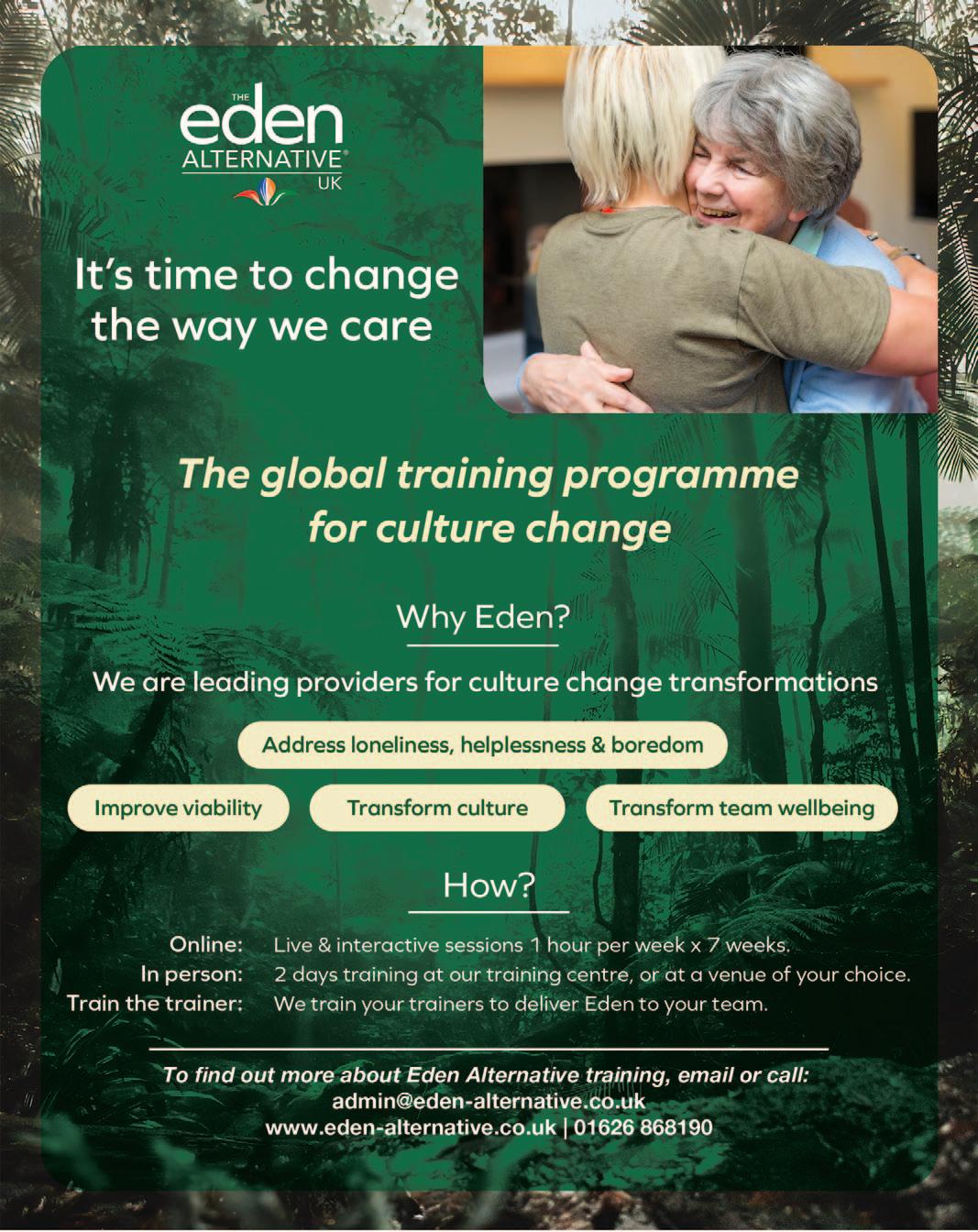






As Service Delivery














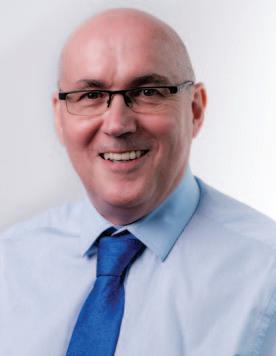
The release of the Adult Social Care Workforce Survey: April 2025 brings into sharp focus an all-toofamiliar narrative for those of us working in and reporting on this sector.
While the report is thorough and offers an important snapshot of the challenges adult social care providers are facing—particularly around recruitment and retention—its findings will surprise no one who has been paying attention.
As revealed in the survey, 71.0% of respondents are currently experiencing recruitment difficulties, and yet, despite these significant hurdles, most providers are still managing to maintain their service levels.
This alone speaks volumes—not about government support—but about the grit, dedication, and extraordinary commitment of care providers and their incredible staff. It is being done in spite of government, not because of it.
Let’s not forget, the issues raised—recruitment, retention, workforce capacity, and the increasing reliance on international staff—are not new.
These very pages have highlighted them time and time again, alongside warnings about chronic underfunding, rising operational costs, and the strain on both care workers and management teams alike. The difference is, while the reports pile up, real action still feels maddeningly slow and piecemeal.
And now, here we are in April. By the end of the month, care providers will be contending with increases in National Insurance Contributions (NIC) and the National Minimum Wage (NMW)—costs that are projected to run into several billion pounds over the next 12 months.
I’ve said it before, and I’ll say it again: once these increases kick in, we’re heading for a summer of discontent—and there are early signs we may already be feeling

the rumblings. If this pressure continues to mount without meaningful support, another protest might not just be possible—it may be inevitable.
On a lighter, yet no less important note, we are once again appealing to care homes across the UK—and indeed around the world—to send in stories, memories, and reflections for our upcoming Victory in Europe Day (VE Day) supplement.
We are honoured to pay tribute to those who gave so much and to ensure their stories live on for future generations.
Please do share your stories with us—they are powerful reminders of courage, resilience, and community spirit, values that continue to underpin our sector today.
I would encourage our readers to sign up for our bi-weekly digital newsletter at www.thecareruk.com and follow us on social media for all the latest news.
I can always be contacted at editor@thecareruk.com
Carer is published by RBC Publishing Ltd, 3 Carlton Mount, 2 Cranborne Road, Bournemouth, Dorset BH2 5BR.
damage. Views expressed within this publication are not necessarily those of the publisher or the editorial team. Whilst
responsibility for any effects, errors or omissions therefrom. All rights reserved, reproduction is forbidden unless written


(CONTINUED FROM FRONT COVER)
MAIN FINDINGS
Responses were geographically widespread, with a notable concentration from providers in the North East and Yorkshire.
The main findings of the survey relate to the following themes: retaining staff recruiting staff maintaining morale
• agency usage recruitment and retention barriers and general workforce capacity international recruitment
While recruitment remains a top concern, more than a third of respondents (37%) expressed doubt about whether they could maintain current service levels over the next six months.
Notably, more than half (58.6%) said their staffing situation had not changed since this time last year, pointing to a persistent and ongoing struggle.
The most commonly cited reason for recruitment and retention difficulties was the availability of higherpaying roles outside the adult social care sector.
More than one in four providers (27.8%) flagged this as a key recruitment barrier, with a slightly higher proportion (35.2%) identifying it as a factor in staff leaving the sector.
DOMICILIARY CHALLENGES
Domiciliary care services appear to be under more pressure than residential homes. Almost three-quarters (74%) of domiciliary care providers described recruitment as challenging, compared to 66.7% of residential care settings. Similarly, retention challenges were more frequently reported in domiciliary care (58.5%) than in residential settings (53.9%).
The issue of morale also plays a role. While over half (53%) of providers rated staff morale as generally positive, domiciliary services reported lower levels of morale than their residential counterparts. Nearly half (46.1%) of domiciliary settings said morale was low, compared to 41.4% in residential care.
INTERNATIONAL RECRUITMENT
A significant contributor to the current staffing crisis may be the drop in international recruitment.
Government data indicates that the number of visas issued to care workers in the first quarter of 2024 plummeted by over 80% compared to the previous quarter—a steep decline that has made it harder for providers to fill essential roles.
Despite this, just over half of providers said they were not overly concerned about international recruit-
ment over the next six months. However, many identified visa sponsorship as a barrier, citing the process as both expensive and administratively complex.
The survey revealed that just 17.7% of respondents have tried to sponsor visas for additional international care workers and senior care workers who were already in the UK, suggesting that the majority of respondents are not actively engaging in in-country international recruitment.
A higher proportion of domiciliary care settings (20.4%) were actively engaged in international recruitment, compared with residential care settings (13.8%).
UNISON head of social care Gavin Edwards said: “Workers from overseas are propping up the UK’s social care sector. They play a vital role in delivering care to elderly and disabled people who’d otherwise struggle to get the help they need. The care sector is desperately short of staff.”
“People who come to the UK to fill skilled jobs in care homes and in the community should be treated with respect. But many are abused and exploited by rogue firms who hold power over their right to work and stay here.”
“Visa restrictions are behind the fall in numbers, not a lack of vacancies. Reforms are needed urgently so the government has control over visa sponsorship. This would stop unscrupulous employers from threatening staff with dismissal or deportation.”
“A fair pay agreement, a national care service and more funding are also vital to drive up standards and encourage staff to stay and to attract new recruits.”
Interestingly, more than half of the respondents reported improved or stable access to agency staff compared to last year, offering some short-term relief for stretched teams. Still, the reliance on temporary workers is not a sustainable long-term solution and often comes with increased financial pressure.
The survey cites the main causes of staff leaving the sector are better pay and better hours available elsewhere, outside work commitments, lack of flexibility in hours worked, cost or distance of travel to work, and migration issues.
A DHSC spokesman said: “There were concerns that a fall in the number of entry visa grants for care workers and senior care workers would impact workforce capacity over winter 2024.”
“A survey was launched to understand perceptions of recruitment and retention within the sector in the run up to winter 2024 and to check whether existing data sources were failing to capture real impacts.”
“The results highlight challenges, particularly in recruiting and retaining staff.”
“Recruitment remains the biggest workforce challenge, with a large majority indicating they were currently struggling to hire staff.”


Dementia is an increasing challenge in England, with record numbers of people being diagnosed. The latest data from the Alzheimer’s Society revealed that 982,000 individuals are living with dementia in the UK, yet more than a third of those affected do not have a diagnosis. As the population ages, this number is projected to rise to 1.4 million by 2040, placing greater demands on health and social care services.
The social care workforce plays a pivotal role in supporting individuals with dementia. Currently, only 29% of care staff in England have received any form of dementia training, which leaves a significant portion unprepared to meet the complex needs of those they care for. This lack of training can lead to challenges in communication and increased stress for both caregivers and individuals with dementia.
THE CALL FOR MANDATORY
Recognising the critical role of training, the Alzheimer’s Society has called on the UK Government to make dementia training mandatory for the social care workforce in England. This aims to ensure that all care staff have the skills required to provide quality care, improving outcomes for individuals with dementia and their families. Mandatory training would standardise care practices, ensure consistency in service quality, and underscore the importance of dementia care within the broader health and social care framework.
People with dementia may struggle with memory, comprehension, and decision-making. Investing in specialised dementia training, such as the Dementia Friends initiative, equips care workers and other professionals, such as lawyers and retail and hospitality staff, with the skills and knowledge needed to deliver high-quality, person-centred care.

By Liz Hughes, managing director, Hugh Jones Solicitors
They can better understand these challenges and adjust their communication style – using clear language, allowing extra time for responses, and ensuring instructions are understood.
Dementia training also helps people recognise symptoms and manage behavioural changes. It fosters empathy, ensuring that situations are approached with patience and sensitivity.
For healthcare professionals, in particular, dedicated training ensures adherence to best practices and enhances workplace efficiency. It also helps reduce hospital admissions by preventing common issues such as malnutrition, dehydration and falls.
Dementia care is, on average, 15% more expensive to provide than standard social care, so there is also a financial imperative for investing in specialist training, as it can result in cost savings over time.
Delivering more tailored care can decrease the number of GP visits and emergency hospital admissions, as caregivers are better equipped to manage health concerns proactively. Furthermore, improved care strategies can delay the need for more intensive care settings, allowing individuals with dementia to remain in familiar environments for a longer duration – not only beneficial for their wellbeing but also more costeffective for the healthcare system.
Having worked with vulnerable individuals, including those with dementia, for many years, I am deeply aware of the significant impact the illness has on individuals, families, and communities.
Empathy, patience, and informed communication truly are essential qualities for anyone regularly working with people living with dementia and their families. To embody these values, 50% of our staff have become Dementia Friends, a programme that raises awareness and understanding of dementia. Our goal is to have the entire firm trained by the end of this year, ensuring that every team member is equipped to support clients with the dignity and respect they deserve.
As dementia diagnoses reach record levels in England, the need for a well-trained, compassionate social care workforce becomes increasingly urgent. Specialist dementia training offers numerous benefits, from improving care quality and reducing inappropriate medication use to achieving potential cost savings through decreased healthcare utilisation. By advocating for mandatory training and leading by example, we can work towards a future where individuals with dementia receive the comprehensive, empathetic care they need, enhancing their quality of life and supporting their families through challenging times.

Care leaders will be trained to use the latest cutting-edge technology to improve patient care, free up staff time and help people live independently in their own homes for longer.
In a bid to shift adult social care from analogue to digital as part of the Plan for Change, the Health and Social Care Secretary Wes Streeting has announced a new qualification that will equip care leaders with the skills to use and rapidly deploy technology across care homes and other settings.
The training will focus on tools which have been shown to improve the quality of care and reduce pressure on staff. This includes motion sensors that can detect and alert staff when a patient has had a fall; video telecare to allow remote appointments with doctors and carers to reduce the need to travel; and artificial intelligence which can automate routine tasks like note taking or predict when a patient might need additional care.
Care technologies like these will help people to receive the best possible care in the community and prevent avoidable trips to the hospital, reducing pressure on the NHS. It supports the government’s 10 Year Health Plan to make health and social care fit for the future.
Health and Social Care Secretary Wes Streeting said: “We will harness the full potential of cutting-edge technology to transform social care, helping people to live independently in their own homes and improving the quality of care.”
By investing in skills training for care workers, introducing a Fair Pay Agreement, and providing more opportunities for career progression, we will help retain the incredible professionals we need.”
“Our Plan for Change will make sure we have the people and the skills needed to build a National Care Service.”
Speaking at Unison’s 2025 National Health Care Conference, the Health and Social Care Secretary also outlined a series of wider measures to boost the recruitment and retention of care staff. The plans will professionalise the adult social care workforce and help staff progress in their careers, leading to better pay and recognition.

Photo Credit:Fred Duval / Shutterstock.com
THIS INCLUDES:
• Setting up new job roles – like deputy managers, registered managers, personal assistants and a new enhanced care worker role – in recognition of increasingly complex care requirements. It will mean their skills will be recognised across the health service, so that GPs, doctors and other health professionals understand their expertise.
• £12 million to fund courses and qualifications for carers to develop new skills, build expertise and advance in their careers.
The boost for social care careers will support the 1.59 million strong workforce which provides vital care and support to people of all ages and with diverse, complex needs and is in recognition of the vital work they do.
The measures come as unpaid carers’ see the biggest rise in their earnings limit since the 1970s this month, and the first ever Fair Pay Agreement for the sector continues to progress through Parliament.
Baroness Louise Casey will soon begin her independent commission into adult social care which will look at how we recruit, retain and support the workforce as part of its focus on building a social care system fit for the future.
A team of staff from local charity St Peter’s Hospice is taking on the Great Bristol Run in May to raise funds for the organisation so close to their hearts.
A team of 19 runners from St Peter’s Hospice will join thousands of others to complete the scenic 10k challenge around the streets of Bristol on 11 May.
The event also has a half marathon option for more seasoned runners and is one of the most popular running events in the South West every year.

Made up of staff from the retail, fundraising, marketing and clinical teams, the group hope to raise significant funds for Bristol’s only adult hospice, which relies heavily on donations.
St Peter’s Hospice Legacy Manager, Matt Crother, said: “We’re
all really excited to take part, and knowing that we’ll be running alongside colleagues and lots of other Hospice supporters definitely helps – a sense of team spirit is important!
“The biggest motivation of course comes from knowing that everyone involved is making a difference to patients and their families.
“The money that we and other runners raise for the Hospice will help our Nurses continue to support people in their homes and at our Inpatient Unit. There’s something special about running in our home city to raise money for the local community!”
St Peter’s Hospice cares for patients with incurable conditions in Bristol, South Gloucestershire and North Somerset.
The Cedars Care Home, in Bourne, said ‘Thank You for the Music’ as they celebrated International ABBA Day with a themed Karaoke party and Happy Hour.
Staff, residents and guests dress in their 60’s and 70’s finest; and came together to sing and dance to the most iconic tracks from Swedish Pop group ABBA: well known as one of the most popular and successful musical groups of all time, and who is one of the best-selling musical acts in the history of popular music.
Home chef Julie treated the residents to Gin

and Fruit cocktails based on 70’s recipes- which went down very easily- as well as delicious sweet and savoury canapes to complete the afternoon. Resident Maureen said ‘it’s been a wonderful afternoon: what great fun!’
Senior General Manager, Rebecca Aldred said: “Today has been all about celebrating music, with young and old coming together to sing and celebrate.
It has been great fun for everyone. It was especially wonderful to see so many relatives and guests dressed up for the party.”


Businesses buying services from suppliers need to consider whether these contracts will be automatically renewed, which can be an expensive mistake when they are no longer needed or when a new provider has been appointed.
What is the responsibility of the supplier to warn the customer of an auto-renew clause, and can the customer exit these agreements easily if it fails to notice it?
Whilst contracts between a business and a consumer provide the customer with some level of statutory protection, B2B customers are relatively exposed. It is therefore particularly important to understand what your business is being asked to sign up for and to challenge terms you are not happy with before the agreement is entered into.
Typically, with a B2B contract, both parties are free to contract on whatever terms they decide. For a handful of specific provisions, it may be possible to challenge a B2B contract on the basis that the relevant terms are unfair, but this can be difficult to prove.
A customer should therefore ensure that either:
(a) The contract is for a fixed term and does not automatically renew; or
By Peter Kouwenberg, partner at

(b) Any automatic renewal provisions are acceptable within the context of the termination provisions.
Check that notice may be served within any fixed term or renewal period to expire immediately at the end of that period and diarise a reminder well in advance of the notice deadline to consider whether or not to serve
Social Care TV continue to fly the flag for highest quality online training for Health and Social Care, after unwavering commitment to excellence within the sector for over 25 years.
Their widely-used health and social care specific courses - produced and edited in-house - are expertly designed to make learning engaging, informative and, therefore, highly effective for learners.
Accredited by CPD, training with Social Care TV is quality assured, comprehensive and relevant.
As one of the leading online training providers in the health and social care sector in the UK, they supply training for local authorities, recruitment agencies, care home groups and other health and social care organisations.
Their feature-rich Manager platform has further been enhanced this year with the introduction of several new Manager tools designed to aid with compliance, reporting and trainee management. Features now available include:
• Compliance Dashboard with Traffic Light System
• Downloadable Trainee Matrix
• Custom Bundles
• Trainee Groups
• Bulk Uploads
• Bulk Enrolment Onto Custom Bundles
• Course Enrolment Notifications
• Course Reminders
notice in good time.
Where a customer is required to give notice to terminate, it is also vital to adhere to any “notice” provisions which govern how notice is given. Often, email notice alone may not be sufficient, and notice may be required by post. The customer must factor in any timescales set out in the notice provisions, in addition to the basic notice period.
Customers also need to be aware of other terms which could be expensive, including provisions for price rises. Price rises will rarely be open-ended (and may give the customer the opportunity to terminate if they are unhappy with the price rise) but there may be provisions permitting the supplier to increase its prices in line with RPI or other objective measures.
From a wider perspective, businesses should have a clear policy in place for which individuals have the authority to negotiate and sign any supply contract. Where a contract is not on that businesses’ own standard terms, it is always prudent to obtain professional legal advice on the document before signature in order to highlight potential areas of risk, including renewal and termination provisions.
Always know what your business is signing up to, the full cost and the terms for the end of the contract, and note important dates, so that contracts can be ended when the services are no longer needed.

SCTV regularly release new and updated high-quality courses. Previews for all courses can be viewed at: Courses - Social Care TV (www.social-care.tv/courses/course-details)
To enhance their learners' experience further they have created free, comprehensive subject-specific workbooks which were rolled out across all courses this year. This unique addition provides excellent value and a fully robust training package.
SCTV are delighted to have won several awards over the last 12 months including:
• Best Online Health and Social Care Learning Platform’ – Global Health & Pharma Social Care Awards 2024
• ‘CPD Provider of the Year’ – The CPD Awards
• Social Care Training Provider of the Year’ - Corporate Livewire Innovation & Excellence Awards
Gold standard customer service remains a core staple of the business, with expert support and guidance provided via telephone, email and live chat. They place great importance on the training and development of their customer services team to ensure that they continue

to provide a personal, friendly and knowledgeable service.
Their much-loved ‘Care Worker of the Month’ award recognises and rewards the selfless dedication shown by care workers across the UK and they proudly support the Care Workers Charity who aim to advance the financial, professional and mental wellbeing of social care workers.
SCTV believe that high quality training should be accessible to all and offer regular, free courses which include a digital certificate accessible via their website.
The company stands behind a clear mission and set of values which define their ethos and their dedication to both the Care Sector and those within it. These can be viewed at: Mission Statement and Core Values - Social Care TV (www.social-care.tv/about/mission-statement-and-core-values)
Social Care TV are a responsible business, committed to ensuring that their actions have a positive impact on their employees, customers, the wider health and social care community and the environment.
Above all, SCTV consistently strive to make a meaningful contribution to the wellbeing of those being cared for.
For
(www.social-care.tv) and see





£24m will be invested in 5 innovative new research partnerships designed to tackle major challenges facing NHS and social care staff.
Workforce sustainability is a critical area for UK health and social care services, with 106,432 unfilled posts in secondary care (hospital-based and mental health care), and 131,000 unfilled posts in the social care sector.
Now NIHR is investing £24m into 5 Workforce Research Partnerships (WRPs). These will develop and test innovations to improve the quality of health and social care services – improving staff retention and tackling issues such as workplace stress and high staff turnover.
The partnerships involve 24 universities across England and Wales, 5 NHS Trusts, 4 councils, and 5 charities and non-profit organisations. They are working across a wide range of integrated care system regions.

Professor Lucy Chappell, NIHR Chief Executive, and Chief Scientific Adviser at the Department for Health and Social Care, said: “Staff are the backbone of our health and care system. The NIHR is stepping up to fund high-quality research to understand our workforce needs better. These new landmark research partnerships will generate crucial new research across a range of projects to help improve the quality, organisation and retention of teams, which will in turn improve the quality of care they provide.”
Karin Smyth, Minister of State for Health said: “As we work to rebuild our broken NHS, it is essential we better understand the skills, expertise and aspirations of our amazing health and care workforce.
“That means making the most of their talents and deploying them where they can be most effective. It also means ensuring the work is enjoyable, meaningful and their wellbeing prioritised in what is, so often, a
high-pressured environment.
“The valuable research generated by these partnerships will help us retain and nurture more staff, turn the tide on recruitment challenges, and deliver even more high-quality health and care to communities throughout England.”
Each WRP is made up of a multidisciplinary team. The teams draw expertise from a range of backgrounds. These include human resources, labour economics, work and wellbeing, management science and organisational psychology.
Teams will conduct high quality research into key questions on how best to deploy and support staff across health and social care. The research will explore new ways to keep NHS and social care workforces healthy. This will enable them to stay in and return to work themselves, in turn benefiting the people they care for.
Better workforce planning and organisation will lead to a more stable, healthy workforce, and improve care for patients and service users. It will save money for the NHS and the social care sector by reducing recruitment and agency staff costs and better meet future patient needs.
The research will focus on a range of staff roles. This includes GPs, health and social care workers and allied health professionals (AHPs). Plus, staff that aren’t often the focus of research. This includes non-clinical and support staff, disabled staff, and staff from ethnic minority groups.
There will also be a focus on staff working in coastal and rural areas. Plus, services provided in geographical areas of disadvantage and deprivation.
Residents at Avalon Nursing Home in Bridgwater enjoyed a rare encounter with some of nature’s most majestic creatures during a visit by Somerset-based Sharandys Birds of Prey centre.
They got to meet Guinea the eagle owl, Bracken the tawny owl, Cobweb the barn owl, and Floci the falcon as part of the home’s regular pet therapy programme.
“We have residents who are very interested in birds and find them both therapeutic and fascinating,” said Lisa Priddice, activities co-ordinator for the home run by Camelot Care.
“The birds were a big hit, and it was wonderful to see how much joy they

brought. They were able to handle the birds, take photos, and ask lots of questions about the different breeds.”
It is the third visit from Sharandys and is part of the home’s pet therapy programme which includes regular visits from domestic animals including dogs, rabbits and kittens.
“The residents really engaged throughout the event which was lovely to see. The room was calm, with everyone fully present and clearly benefiting from the experience,” added Lisa.
“It was creatures wonderful to see how much joy they bring. We’re grateful to Sharon and Matt for their dedication and for sharing their knowledge with us.”

By Rebecca Tester,

When free movement within the European Union ended on 31 December 2020, the UK Government introduced a revised pointsbased immigration system. This post-Brexit visa system allowed firstly senior care workers, then subsequently from February 2022, care workers, care assistants and home carers to qualify for a Skilled Worker visa under the Health and Social Care visa regime for the first time. This was in response to the large-scale shortages within the care sector and resulted in a plethora of sponsor licence applications from private care providers.
Last year, the Independent Chief Inspector published the results of their inspection of the immigration system as it relates to the social
care sector. The inspection found that the Home Office had created a system that invited large numbers of low-skilled workers to the UK who are at risk from exploitation, and introduced several recommendations, looking at reviewing the route, increased scrutiny of sponsor licence applications from this sector, and greater compliance.
In response to this, the Home Office accepted the recommendations and has since ramped up compliance activities in recent months, and consequently, there have been over 470 sponsor licences revoked within the care sector, resulting in many international care workers being without work. Where those left without work have been unable to secure new employment with a new sponsor within 60 days of sponsorship ending, they have faced the possibility of having to return overseas through no fault of their own.
On 12 March 2025, the Home Office introduced its statement of changes to the immigration rules with specific changes announced for the care sector. From 9 April, care sector sponsors in England must first demonstrate that they have attempted to recruit a worker from within England who needs new sponsorship before recruiting a new worker from overseas, unless they fall into one of the limited exceptions. This new rule effectively introduces a variation of a resident labour market test for care providers who hold sponsor licences to recruit overseas nationals. Care sector sponsors must ensure they factor in the new requirements within their recruitment practices, which is likely to result in delays in filling positions.
The Home Office has now set out the circumstances in which a sponsor must engage with their local regional hub. This assists care workers who need sponsorship in circumstances where their previous
sponsor has either lost its licence, has been unable to provide sufficient work, or where they have been identified by the relevant regional or sub-regional partnership as a worker requiring assistance in obtaining new sponsorship.
Any new certificate of sponsorship that has been issued on or after 9 April 2025 to a care worker who falls within the new rules must state that an attempt has been made to recruit from the pool managed by their regional partnership and that no suitable workers were available from that pool, identifying the specific regional partnership that was consulted. When deciding on Skilled Worker applications within the sector, caseworkers will be required to check with the regional partnership that the sponsor contacted to confirm the attempt was made to recruit from this pool of displaced candidates.
The new rules will not apply to those who were already in the Skilled Worker route prior to 4 April 2024 or have been working legally for the sponsor for at least three months prior to the date of the new application, which will include those who were working legally for the sponsor under another immigration route – for example, graduate, student or dependant visa holders. The new rules also do not apply to sponsors assigning a certificate of sponsorship for care worker roles in Scotland, Wales or Northern Ireland.
While these changes are not applicable to all care workers, for those it does affect, it will add significant delays to the recruitment process for a sector that was already struggling to fill positions prior to these changes. We would also predict that with the extra requirements, some sponsors will inevitably get the rules wrong, resulting in an uptick in refusals under this route.
A Penarth home opened its doors to the community and marked its 50th birthday with a special party.
MHA Morel Court first opened its doors in 1975 and to celebrate the home being around for 50 years staff arranged a party.
There were plenty of activities and games to keep guests busy as well as some live singing.
Staff members from years gone by were also in attendance as well as residents, family members and present-day staff. Councillor Gwenda Roberts, Penarth Town Mayor was also invited, and the kitchen team prepared a buffet, including a delicious cake, which was enjoyed by all.
MHA Morel Court provides residential care for 36 residents Hayley Lawrence, deputy home manager, who has been at

the home for 25 years, said: “It’s a very proud achievement for everyone linked to MHA Morel Court.
“To be a part of the community for 50 years is an amazing feat and one that we hope will continue to grow.
“On a personal note, I feel very proud to have been part of the home for half of its existence.
“We had some former staff members come back and have a look at how much the place has changed.
“The staff and residents were really looking forward to the party and they had a great time.
“We received some feedback from the attendees about how much they enjoyed the day.
“Our Mayor was very impressed with the home and said she will be back for more visits, especially for events such as fayres etc.”
The pobroll® is the invention of Pat O’Brien, a physiotherapist, Moving and Handling trainer, and Conflict Management tutor with over two decades of experience in care homes and nursing homes
Care home managers often face challenges in delivering intimate care while balancing efficiency and managing costs, particularly when these essential tasks provoke behaviours that can be challenging to safely manage. Traditional methods—especially for bed-bound residents—often lead to lengthy processes and frequent linen changes, driving up costs and consuming valuable staff time. The pobroll® provides a transformative solution that supports dignified care, achieves significant cost savings, and reduces the need for additional staffing.
The pobroll® is an innovative bed-bathing wrap specifically designed to enhance comfort and dignity during personal washing for individuals who require in-bed care. Centred on the resident’s experience, it minimizes distress by providing sensory comfort. Crafted with two layers of high-quality cotton-terry toweling and a waterproof layer in between, it delivers a soothing, calming experience while keeping the bed completely dry. Sized for a standard single bed, the pobroll®’s dual-layer design offers warmth and a sense of security and privacy, allowing residents to maintain comfort and dignity during bed-based bathing routines.
BOOSTING COST

pobroll® provides an effective solution that supports both economic and environmental goals.
Managing resident agitation—particularly for those with dementia—often requires specialised training in restraint techniques. The pobroll® significantly reduces the need for physical intervention by providing a warm, secure covering that alleviates resident distress. This gentle approach minimizes aggressive or defensive reactions, reducing the number of staff needed for these interactions. As a result, facilities can potentially lower staffing levels without compromising care quality, yielding substantial cost savings. Additionally, reduced dependence on physical intervention decreases training costs associated with restraint techniques. By simplifying the process of intimate care, the pobroll® reduces the need for specialised training, making onboarding smoother and lowering turnover-related training expenses.
The pobroll® supports compliance with restraint reduction guidelines, helping facilities minimise documentation burdens and regulatory liabilities linked to physical interventions. This non-invasive solution improves safety for both residents and caregivers, fostering a culture of dignity and respect that boosts satisfaction among residents and their families.
CONCLUSION: A VALUABLE ASSET FOR QUALITY CARE AND COST MANAGEMENT
The pobroll®'s waterproof design enables caregivers to provide a complete wet wash without the risk of soaking the bed, minimising the need for frequent linen changes. This leads to fewer laundry loads, reducing labour and utility costs, as well as wear on linens. By reducing logistical tasks, caregivers have more time to focus on direct resident care, enhancing productivity overall. Additionally, reduced reliance on disposable wipes results in further cost savings and supports environmentally sustainable practices. With its durable, reusable design, the pobroll® maintains hygiene standards and allows for extended use across multiple residents. As care homes face increased pressure to adopt sustainable practices, the
For care homes, the pobroll® represents a strategic investment, offering measurable savings by reducing reliance on disposable products, lowering laundry and training costs, and enabling efficient staffing. Most importantly, it prioritises resident dignity and comfort, setting a high standard for compassionate, personcentred care. For facilities seeking to enhance financial performance and care quality, the pobroll® is an invaluable addition to their resources.
Fof further information, see the advert on the facing page.
Trade Union UNISON has warned that new immigration rules laid down in Parliament on Wednesday 12 March 2025 will impact the recruitment of overseas health and care staff.
As from 9 April 2025, the following changes came into force:
• Care providers in England seeking to recruit a new worker from overseas, or those switching from another visa route, will have to first provide proof that they have attempted to recruit a worker resident in England.
• The minimum salary threshold for skilled workers will increase to £12.82 per hour or £25,000 per annum, from £23,200.
• Health and education occupations, including doctors, nurses, allied health professionals and teachers, will also see their minimum rates increased to reflect the latest national pay scales, meaning that entry level Band 3 roles will no longer meet the salary threshold.

There is now also increased powers for caseworkers to refuse visa applications to the short-term Student Visa route where they are suspected of being non-genuine.
Commenting on the latest Home Office asylum and visa, UNISON head of social care Gavin Edwards said:
“Workers from overseas are propping up the UK’s social care sector. They play a vital role in delivering care to elderly and disabled people who’d otherwise struggle to get the help they need. The care sector is desperately short of staff.”
“People who come to the UK to fill skilled jobs in care homes and in the community should be treated with respect. But many are abused and exploited by rogue firms who hold power over their right to work and stay here.”
“Threats against care staff stop them from speaking out against ill-treatment, such as being paid below the legal minimum wage as well as verbal and physical abuse.”
“Visa restrictions are behind the fall in numbers, not a lack of vacancies. Reforms are needed urgently so the government has control over visa sponsorship. This would stop unscrupulous employers from threatening staff with dismissal or deportation.”
“A fair pay agreement, a national care service and more funding are also vital to drive up standards and encourage staff to stay and to attract new recruits.”
A new, state-of-the-art care home is set to open its doors in Great Wyrley in May – marking the fifteenth development by Midlands-business Macc Care Group.
Wyrley Rose, will be the largest Macc Care facility to date, offering 90 bedrooms and an array of premium amenities including a cafe, cinema, gym and salon.
The home, located on Walsall Road in Great Wyrley village near Walsall, will provide high-quality nursing care alongside specialist dementia support and respite services.
Designed to address the growing demand for high quality local care, Wyrley Rose will offer tailored support across a spectrum of clinical needs, guided by an experienced manager and senior management staff with a combined experience of over 30 years.

The new home is adjacent to Wyrley Court, Macc Care’s latest retirement village, and fosters an integrated community with seamless access between the two. This unique setup promotes continuity of care, social connection and shared amenities, ensuring residents benefit
from a vibrant and supportive environment.
With availability from spring 2025, Wyrley Rose is expected to play a vital role in elderly care provision in the region, helping to alleviate local healthcare pressures and offer reassurance to families seeking trusted, long-term support for their loved ones.
Bhav Amlani, director of Macc Care Group, a top 20 care group and one of the Financial Times 2025 long-term Growth Champions, said: “Wyrley Rose marks an exciting new chapter for Macc Care. As our largest home to date, it reflects our ongoing commitment to delivering outstanding care within purpose-built environments that truly feel like home.
“We know communities across the Midlands are facing rising demand for high-quality, accessible care, particularly for individuals living with complex or evolving needs. Wyrley Rose has been designed to help bridge that gap, offering compassionate, clinically informed care within a supportive and stimulating setting.”


With the new food waste legislation, Simpler Recycling, coming into effect on 31 March, there is now a legally enforceable onus on social care providers to report on how they separate waste, dispose responsibly and evidence their environmental impact.
Melissa Haskell, partner in the regulatory and licensing teams at Knights, explores the practical changes businesses must adopt and the anticipated implications of non-compliance.
SEPARATION FROM GENERAL WASTE
The most immediate change for businesses is the requirement to separate food waste from general waste.
As an environment where sanitation and health are a clear priority, social care providers should already be used to separating their waste, such as segmenting medical equipment, medicine, and PCP from general and recyclable waste.
Social care providers are also highly regulated. While the Food Standards Agency (FSA) ultimately governs food safety in England, Wales and Northern Ireland, authorities such as the Care Quality Commission (CQC) also play a huge role in assessing the quality and safety of services provided, including food and nutrition.
Staff will need to streamline their operations, conduct regular audits to ensure food is disposed of correctly, and ensure there is a system in place to provide effective handovers between staff shifts. Responsible disposal of food waste
Once food waste is separated, businesses must ensure it is disposed of correctly. The legislation sets out clear guidelines on what can and cannot go to landfill, pushing businesses towards more sustainable options such as composting or anaerobic digestion.
In some large social care settings, huge incinerators are used to ensure that contamination is not an issue. Food waste may have been included here, but this will ultimately need to be rediverted and rethought out.
One option could be to explore drives across the industry to use local farmers or support circular strategies such as growing fruit and vegetables on site. This is currently being undertaken by some social providers but not all, so the changes brought about by the bill may speed this up to ensure compliance.
REDUCING ENVIRONMENTAL IMPACT AND ENSURING COMPLIANCE
Beyond separation and disposal, businesses must actively reduce their environmental impact by cutting
down on waste generation in the first place. The legislation becomes more than just a compliance issue - it represents a shift in how businesses manage resources.
For social care providers, meal preparation is absolutely key. Dietary requirements will already be understood in this respect, but it is micro-scenario planning that will need more thought.
For example, there may be a resident that prefers his or her meals at a particular time, or another resident may have arrived from emergency care and needs round-the-clock attention and nutrition.
It will be important to ensure specific food requests are documented and scheduled, to ensure meals are not over-prepared or remade, with knowledge transferred between staff effectively. Portion sizes may also need to be rethought out, so it is vital staff engage with residents, care teams, and their families to reduce food waste at the source.
Businesses that do not separate food waste properly, fail to report their waste levels, or dispose of waste irresponsibly could face severe financial penalties. While specific fine structures and enforcement authorities are still being clarified, it is likely that larger social care providers will face steeper fines proportional to the scale of their operations.
Reputational damage is another major concern. Care providers are under huge public and private microscopes, and high-profile breaches of the legislation could lead to a severe backlash from regulating authorities.
Regular inspections and potential enforcement actions could lead to penalties or even temporary closures of social care settings for non-compliance. Keeping clear records of food waste management processes can mitigate legal complications, while labelling and record keeping will be ever more important for satisfying the requirements of CQC inspections and other authorities.
There is therefore a huge resident and family engagement piece that social care providers must undertake. Families are the ones that know their loved ones the best, so it is important providers document upcoming changes, speak to families and understand how best to ensure food and nutrition is not only accounted for, but also responsibly prepared and disposed of.
In theory, the legislation should increase waste responsibility across social care settings. The transition to ensure compliance may be costly and logistically challenging, but it also presents an opportunity to embrace food waste reduction, improve operational efficiency, and enhance sustainability.
We recommend businesses seek the support of a food specialist regulatory and licensing lawyer to guide them through this major change.
A host of health and social care courses delivered by leading training provider Realise have received the new Quality Assurance Care Learning Services (QACLS) endorsement.
The Department of Health and Social Care (DHSC) has taken on responsibility for reviewing the quality of individual courses and qualifications delivered by training providers within the sector.
Realise submitted 11 of its health and social care programmes to be quality assured – and all received the stamp of approval, including the Level 2 Adult Social Care Certificate.
Funding for health and social care qualifications is now provided through the Government’s Learning and Development Support Scheme (LDSS), which has replaced the Workforce Development Fund.
From April this year, only courses and qualifications delivered by training providers that have been QACLS endorsed will be identified as preferred options by LDSS.
And from next year onwards, employers will only be able to claim LDSS funding for courses that have been quality assured.
Care providers currently have to replace almost a third of their workers each year due to staff leaving their jobs. This high turnover has a negative impact on the quality of care - and the DHSC hopes the QACLS endorsement will help boost retention.

Lesley O’Connor, Head of Strategic Development at Realise, said: “We are absolutely delighted to be one of the first training providers to achieve endorsements across a wide range of courses.
“This new system marks a step-change for the industry as it means, for the first time, individual courses are being reviewed rather than the training provider as a whole in an attempt to drive up standards.
“The approval process was thorough, looking at evidence of quality of delivery, testimonials, achievement rates and policies.
“Being QACLS endorsed is very important as it demonstrates quality and also allows employers to continue to claim LDSS funding. Soon employers will have to pay the full price for programmes that are not endorsed.
“We look forward to working with employers who can benefit from quality assured training.”
The QACLS endorsement lasts for three years, with regular monitoring every six to nine months.
Realise will strive to have all its health and social care programmes approved through QACLS during phase two and three of the process. Phase two runs from now until the end of the 2025-26 financial year, and phase three follows immediately after.
The Government says it is "fully committed to a professional, well supported social care workforce" with learning, development and training that is "of outstanding quality, relevant and accessible".
The full list of Realise’s 11 quality assured courses are: Level 2 Certificate in Understanding Autism, Level 3 Certificate in Understanding Autism, Level 2 Adult Social Care Certificate, Level 2 Certificate in Understanding the Care and Management of Diabetes, Level 2 Certificate in Falls Prevention Awareness, Level 2 Certificate in Understanding Nutrition and Health, Level 3 Diploma in Adult Care, Level 4 Diploma in Adult Care, Level 5 Diploma in Leadership and Management for Adult Care, Level 2 Certificate in Understanding the Safe Handling of Medication in Health and Social Care and Level 2 Certificate in Awareness of Mental Health Problems For more information, visit www.realisetraining.com
Barchester’s Hugh Myddelton House care home, in Southgate, celebrate their resident Mona Clarke’s 100th birthday. We took a trip to The Lamb Pub, which is owned by her son and a place she used to visit often. It was so special seeing her back there, surrounded by friends, family, and our team, sharing stories from her past and chatting about her amazing life. She was over the moon to receive a birthday card from the King, and the smile on her face said it all! She was full of joy dancing and singing with everyone, and creating memories we’ll never forget.
Huge thanks to the lovely staff at The Lamb for the warm welcome and making the day so memorable. Here’s to 100th wonderful years and many

more happy memories!
General Manager, Jade Shea, commented: "We are so happy to have organized our lovely Mona’s 100th birthday celebration. She is such a fun, positive person who always has a smile on her face. She’s still dancing and singing, and it was a fantastic opportunity for her to return to her favourite pub and reminisce about her wonderful life."
Mona’s son, Adrian Clarke, added: "A big thank you to everyone who helped organize this event. She looks so happy, and it was a wonderful birthday spent with family and friends. We even danced to her favourite song, which brought us all back to the past and made the day even more special.
Health and Social Care Secretary

Wes Streeting spoke at UNISON’s annual health conference that took place on 9th April at the ACC Liverpool.
During his keynote speech Mr Streeting discussed the government’s plans for a National Care Service and spoke about improving status and national respect for care work.
He started by noting that he was the first health and social care secretary to address a UNISON conference in 15 years, since Andy Burnham, adding: “I’m particularly proud to do so as a UNISON member.”
Speaking about UNISON’s support for the Labour Party during the last general election, he said that the victory has “put into the Department of Health and Social Care three UNISON MPs who are working day and night to turn around our NHS and transform social care – Stephen Kinnock, Karin Smyth and me.
“Now we’re delivering the change people voted for. It’s not all plain sailing and I expect you’ll want to question, even challenge, some of the government’s decisions.
“For all the challenges we’re confronting – and there are plenty –nothing I’ve experienced in the past nine months since the general
election have shaken my confidence and conviction that this will be a government that not only gets our NHS back on its feet, but makes sure it’s fit for the future.”
Mr Streeting then moved on to social care. He noted that the government’s move to legislate to introduce fair pay agreements for care workers as part of “the largest expansion of workers’ rights in history, with Labour’s Employment Rights Bill.” It represented the “our first step on the road to building a national care service,” he said.
“And I can announce today that we will go further for our care professionals,” he continued, “We are introducing the first universal career structure for adult social care, setting out four new job roles, to give care workers the opportunity to progress in their career, with millions of pounds of new investment in skills and training.”
Moving onto recruitment and retention in the NHS, Mr Streeting continued: “British taxpayers are investing billions in doctors, nurses, paramedics, and healthcare assistants, only for them to end up treating patients in Canada or Australia.
“We have got to retain the talent we’ve got in the health service and treat our staff with the respect they deserve. That means more training and opportunities for nurses who want to progress in their career, and making flexible working easier.
“It also means paying you for the job you actually do. So we’re bringing in a new digital system to make sure the [NHS] job evaluation scheme is applied fairly across the board, honouring the demand that has echoed down the labour movement for generations: a fair day’s
work for a fair day’s pay.
Speaking on the longer term plan for the NHS, the secretary of state said: “The scale of the challenge in the NHS is huge.
“Our job is twofold – first, to get the service back on its feet and treating patients on time again, and second, to reform the service for the long-term, so it is fit for the future.
“And I say it’s ‘our job’ deliberately. This cannot be done by one man sat behind a desk in Whitehall. We will only succeed if this is a team effort, from the Prime Minister to the 1.5 million people who work in the health service.”
REFERENCING THE GOVERNMENT’S PLAN, WHICH IS DUE TO BE PUBLISHED LATER IN SPRING, HE HIGHLIGHTED IT WOULD:
• Shift the focus of healthcare out of hospital and into the community, with more investment in primary and community care
• Bring the analogue health service into the digital age, arming staff with modern equipment and cutting-edge technology
• Turn a “sickness service” into a preventative health service, to help people live well for longer and tackle the biggest killers.
He told delegates: “I know how hard it must be to battle against a broken system, to give patients the best care you can, only to go home at the end of the day knowing your best wasn’t enough. But there is light at the end of the tunnel.
“My message to everyone working in the NHS is this: stay and help us rescue it. Change takes time, but it has already begun.”
This Spring, Recreo VR is offering care homes an exciting opportunity to enhance resident wellbeing through the power of Virtual Reality (VR). By signing up for one of our 24-month Recreo Theatres packages, you’ll receive a free VR headset and staff training.
Our platform provides person-centred, budget-friendly activities that are fun, engaging, and accessible, especially for residents who are bedbound or socially isolated. Co-created with Alzheimer’s Society and individuals with dementia, our service empowers staff to deliver personalised reminiscence and one-to-one sessions that promote memory recall and connection.
Our VR headsets have been recognised as good practice by the Care Quality
Commission (CQC), further validating their impact on care. Regular use of Recreo VR has a proven positive effect on wellbeing, with residents reporting increased activity, engagement, and social connection, often leading to a reduction in the need for PRN medication.
Whether combating loneliness, promoting relaxation, or enhancing cognitive health, VR offers a non-pharmacological solution to enrich care and elevate quality of life. Don’t miss out! Take advantage of this exclusive offer and see how VR can transform your care home experience.
For more information, visit recreovr.co.uk. Or contact us at info@recreovr.co.uk or 01482 526940.

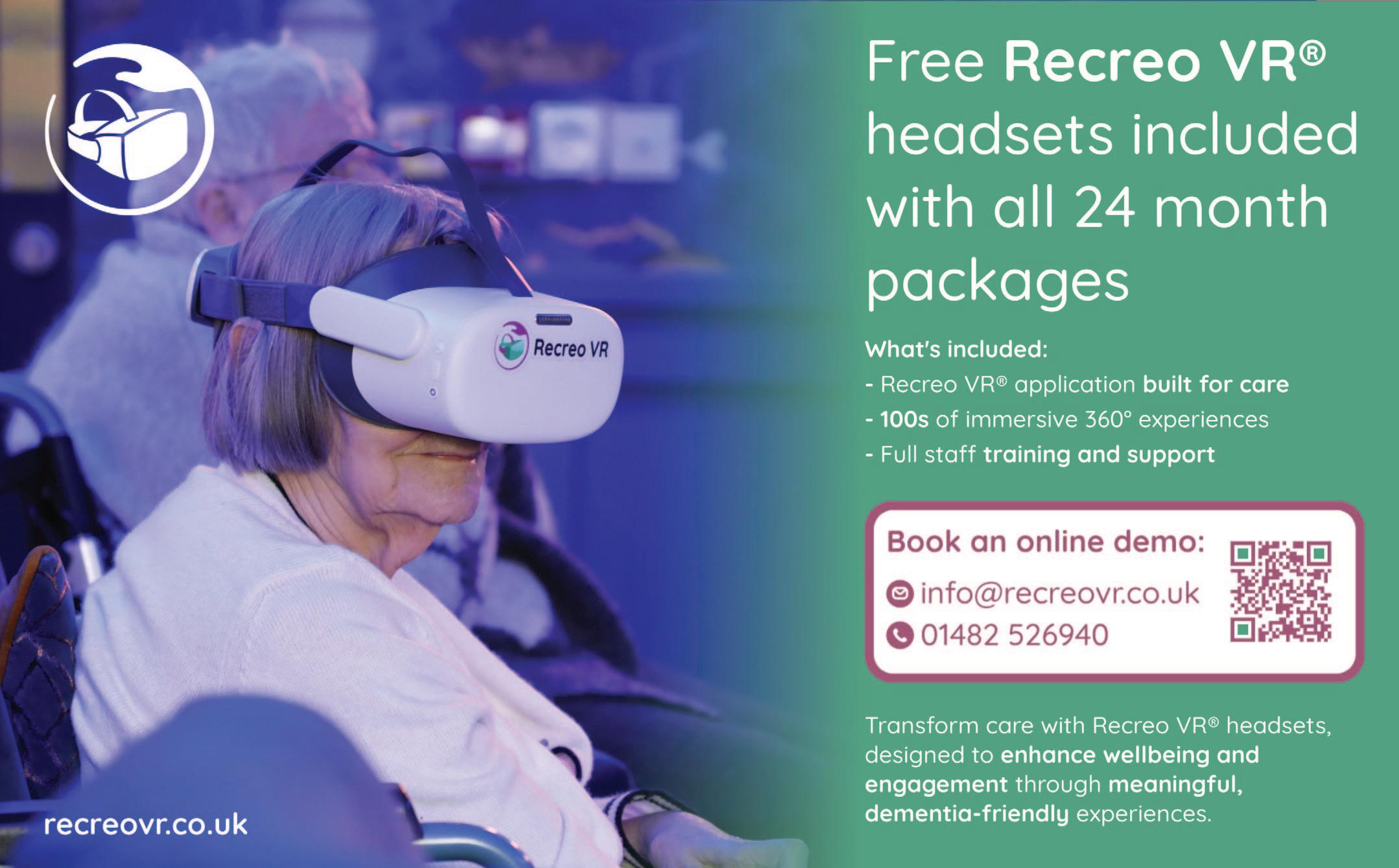
By

Britain's home care sector faces a critical but overlooked challenge: communication. It dominates complaints about carers, appearing in 88% of all negative reviews—far more than any other issue. When carers and clients can’t communicate, nearly every aspect of care suffers.
This finding comes from our analysis of 967 negative reviews about home care agencies. By manually labelling across 22 categories and identifying both explicit and implicit communication failures, we found clear patterns showing how language breakdowns ripple into other areas of care.

The English ability of care workers is linked to serious care failures by hundreds of negative reviews from service users & their loved ones.
"They gave him a double dose one day in error! It was hard communicating with them as most of the carers spoke broken English." (Review 308)
"As my wife suffers from vascular dementia, continuity, communication and inter-reaction[sic] are very important... the language and the inability to interact are now causing issues with my wife's mental state." (Review 707)
But these explicit mentions of language barriers are just the tip of the iceberg. More commonly, reviewers mention the consequences of communication breakdowns in three key ways.
First, carers struggle to understand instructions whether it be verbal directions or written care plans.
"Sent people who could not speak English, our mother asked for a pair of pyjamas from the bottom drawer, first time she was given a pair of socks, then got a scarf." (Review 800).
"Even though notes are written every day by myself or my sister, they are
not always carried through" (Review 432).
Second, carers have difficulty explaining their actions. This lack of explanation leaves clients feeling vulnerable and disrespected, particularly during intimate personal care.
"...when we asked they just said personal care but no explanation of what that exactly was." (Review 37).
"I asked for a cheese toastie, they put cheese between 2 slices of bread, microwaved it and gave it to him... No explanation of what that is supposed to be." (Review 919).
Third, misunderstandings persist throughout the care relationship A common pattern involves carers appearing to understand but then acting differently.
"...cannot be relied upon or trusted to do as requested. This includes not putting reading glasses on after me stating not to put them on at least three times." (Review 191) .
"Instructions on how to mobilise and transfer my mum from her neurological physio were ignored... The staff did not communicate well with my mum and rarely spoke." (Review 385).
These specific communication failure patterns are typical coping strategies for individuals dealing with a language barrier [1], rather than general communication deficits.
Language barriers don't just create isolated misunderstandings— they damage trust across the board. When a carer struggles to communicate, complaints about other areas increase. Most notably, people are 27% more likely to judge the carer is incompetent.
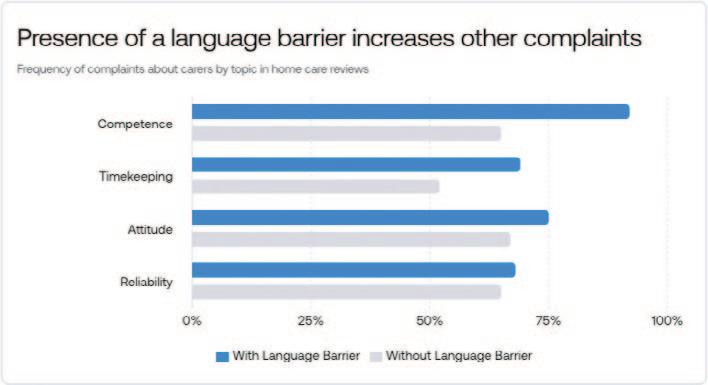
Complaints about the language barrier typically question the carer's basic competence.
"The carers themselves did the bare minimum, often staying only 5 minutes before rushing to the next client.... There were also language issues with some not being able to even have basic conversations with my mother because of a limited grasp of English." (Review 10)
"At the very least carers should be able to communicate with clients, assist safely with mobility, and have sufficient literacy skills to safely administer medication." (Review 4)
Is this because language is fundamental to the care relationship? Or
does it suggest a reverse halo effect—a psychological bias where one visible weakness (like poor English) causes people to assume other unrelated failings, such as incompetence or unreliability?
Either way, it further indicates that the language barrier is the root cause of communication complaints and points to the compounding negative effect of the language barrier on perceived quality of care.
FROM MISUNDERSTANDINGS
MEDICAL MISTAKES
The stories told in the reviews consistently show that poor communication wasn't just an inconvenience – it often caused serious problems affecting care quality, client wellbeing, and safety.
In many reviews, individuals needing care find themselves burdened by explaining basic tasks to their carers, in a reversal of the care relationship.
"Mum is tired of explaining to the carers what needs to be done!" (Review 138)
"I had to explain everything. The office staff couldn't even speak English." (Review 349)
The lack of communication seems to most acutely affect the most vulnerable people, for example stroke survivors and those with complex physical needs.
"My husband, a stroke survivor, has trouble understanding some of them because of a lack of English speakers." (Review 405)
"Can't empty catheters, put slings on correctly, dress you ... struggle to understand basic English." (Review 48)
Most concerning are the direct health and safety risks created by these communication failures.
"...incompetence of the carers in understanding and speaking English.
Not only does this pose a significant risk in emergency situations, but it also means they are unable to comprehend even the most basic instructions for operating hospital equipment" (Review 930)
"Carers asked me today what time they can give me my meds because they don't know how to tell the time, also showed them the dangers of mistimed meds to be told I'm sorry I can't read English." (Review 900)
While these anecdotal accounts cannot tell us how common these incidents are across the entire care system, they point to concerning patterns where communication failures risk escalating into critical safety failures. Tragically, such worst-case scenarios are not hypothetical.
The language barrier isn’t just one problem among many—it’s a structural issue that shapes how all other care problems are experienced and perceived. The evidence shows that when communication breaks down, trust, safety, and dignity quickly follow.
This makes solving the language barrier one of the most important— and urgent—challenges in home care today.
References Gass, S. M., & Selinker, L. (2008). Second Language Acquisition: An Introductory Course (3rd ed.). Routledge. Roberts, C., et al. (2005). Misunderstanding in Intercultural Communication: Interactions in the Workplace. In Applied Linguistics, 26(3), 404–431.
Staff at the home, including Mark Quarmby, home manager (L) in front of the new plaque
There were plenty of celebrations at a Pontefract home as it marked its 30th anniversary.
MHA Warde Aldam first opened its doors on the 9th of April 1995, and 30 years later it’s still going strong.
The home, which provides dementia nursing and nursing care for 60 residents marked the occasion with an anniversary party.
There was a tree planting ceremony, followed by a blessing from the home’s chaplain, Joseph Zulu, which was followed by the home releasing 30 biodegradable balloons in the air.
The home had also arranged some entertainment alongside a celebration cake and buffet.
A commemorative plaque was put up in the home to showcase the 30 years.

Mark Quarmby, home manager said: “We are all incredibly proud of the achievement of being here for 30 years and serving the community and ensuring our residents live later life well.
“Even though I am still fairly new to the role here, I feel very much a part of the 30 years and it’s a great feeling.
“The 30th anniversary celebration was a great way to mark the occasion, and we all had a great time.
“Everyone was in good spirits, we had plenty of fun and it was great to see so many family members of residents come and join in.
“All our staff members were present, as well as some central support and management staff.
“Being here for 30 years, there are a whole host of memories that staff members and residents, past and present, will hold close to them.
“The journey doesn’t stop, we keep going and hope to reach the next landmark here as well.”
A former RAF flight mechanic enjoyed a party to celebrate his 100 birthday at a Ferndown care home.
Tony, who lives at Fairlawn care home, was thrilled to be joined by his family for the special occasion. This included his son, Christopher, who had flown from Denmark, and other son, Paul, who had travelled from Torquay to be their dad on his big birthday, as well as Tony’s extended family. Tony spoke to his other son, Stephen, on FaceTime who lives in Sri Lanka.
When asked what the secret is to turning 100, Tony said: “Just luck.”
At the start of Second World War, Tony was an RAF flight mechanic, which saw him travel across Europe and eventually ended up in India, where he was demobbed. After leaving the forces, he worked as a draughtsman which saw him planning and making maps.
Tony then moved to Kenya to live with his father, which is where he met his first wife, Barbara. Together they welcomed three sons before moving to
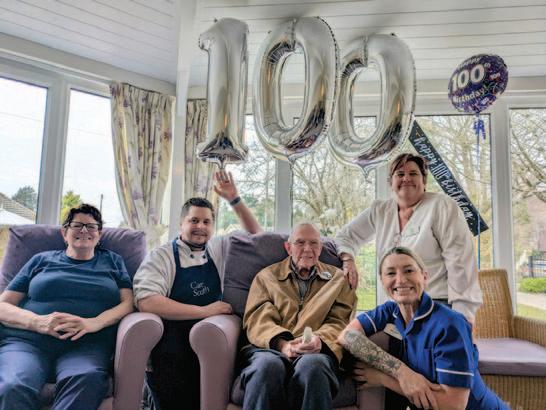
Australia, where the family lived for 20 years. He went on to meet his second wife, Rosie, who already had three daughters. Tony retired in Australia in his 50s.
His son, Christopher, added: “Growing up, he was always a patient and gentle dad to my brothers and I, and then supported his second wife Rosie’s three daughters. When I think about what the secret to him reaching 100, he’s always enjoyed full fat cream and butter and he gave up smoking and alcohol around 20 or 30 years ago.”
Tina Vincent, Home Manager at Fairlawn, said: “It was wonderful to see Tony surrounded by his family for his 100 birthday. He appreciates everything we do to provide care and support to him at the home, so we were keen to make an extra special effort on his birthday. At Care South, we love to get to know the individual wishes, likes and dislikes of our residents, so we were pleased to enable Tony create lasting memories with his loved ones.”
The dangerous practice of sending people with a mental illness hundreds of miles away from home for weeks at a time continues in England, according to new analysis published by the Royal College of Psychiatrists.
Despite Government pledges to end the shameful practice, known as inappropriate out of area placements, by March 2021, almost 206,000 days have been spent by patients out of area in the 12 months since the deadline passed.
Being far away from home, with friends and family not being able to visit, can leave patients feeling extremely isolated and emotionally distressed with devastating, long-lasting consequences for their mental health.
Not only that, but it comes at a huge cost to the NHS. The health service spent £102 million on inappropriate out of area placements last year – the equivalent to the cost of the annual salary of over 900 consultant psychiatrists.

The Royal College of Psychiatrists is calling on the NHS to adopt a ‘zero tolerance’ approach to inappropriate out of area placements and to take urgent action to ensure all patients get the care they need from properly staffed, specialist services in their local area.
Dr Adrian James, President of the Royal College of Psychiatrists, said: “The failure to eliminate inappropriate out of area placements is a scandal. It is inhumane and is costing the NHS millions of pounds each year
that could be spent helping patients get better.”
“No one with a mental illness should have to travel hundreds of miles away from home to get the treatment they desperately need. The health and social care system, both on a national and local level, must urgently come together and make sure no one ever has to.”
“We need to understand what is driving this unacceptable practice in different parts of the country and invest in local, properly staffed beds, alternatives to admission, and follow-up care in the community. Central to this is government backing to address the workforce crisis that continues to plague mental health services.”
In the 2021/22 financial year, the number of days spent inappropriately out of area was 205,990. 71% of placements that ended over that time, lasted for 15 or more nights, while 40% lasted for 31 or more nights.
The 2016 Crisp Commission highlighted the hugely detrimental impact out of area placements can have on patients, and how public funds are wasted on these expensive placements, prompting the government commitment to eliminate the practice within five years.
Out of area placements continue because there aren’t enough properly staffed beds, or alternative specialist intensive provision, locally. The expansion of community services as part of the NHS Long Term Plan will help reduce the number of people requiring inpatient admission by offering more intensive support in the community.
We are thrilled to announce that THE CARER will be producing a special digital supplement to commemorate Victory in Europe Day (V-E Day) on May 8. This historic occasion marks the unconditional surrender of Germany’s military forces to the Allies in 1945, bringing an end to the conflict in Europe during World War II.
Over the years, we have been honoured and privileged to share incredible stories from care homes and their residents from across the UK—stories of heroism, resilience, and dedication from residents who served our country in times of conflict and need. From D-Day to Remembrance Sunday, awards and honours these personal recollections have been a
testament to the courage and sacrifices of a remarkable generation.
To mark this momentous anniversary, we are calling on care homes to send in as many resident stories as possible, accompanied by photos, to help us create a bumper V-E Day supplement. Whether it’s firsthand memories of May 8, 1945, stories of service, or reflections on what V-E Day meant to them, we would love to share and celebrate these treasured accounts.
Submit your resident stories and photos to veday@thecareruk.com
Let’s come together to honour and preserve the legacy of those who witnessed this historic day.


Research Impact at the University of West London is a video series exploring the breadth of research across disciplines of study at UWL and the impactful changes which come from it, whether it be improving patient outcomes and people’s wellbeing, influencing policy decisions or guiding business decisions.
Dr Federica D’Andrea, Chartered Psychologist and Lecturer in Dementia Studies at theGeller Institute of Ageing and Memory (GIAM), investigates ways to improve the quality of life and wellbeing ofpeople living with dementia, their care partners and families through developing and evaluating innovative psychosocial interventions and novel research methodologies.
Federica is currently researching the potential of our sense of smell (olfaction) as a supportive system in the aging process and for people living with dementia to promote positive changes, enhancing our lives as we age as well as improving outcomes and experience of people living with dementia and families.
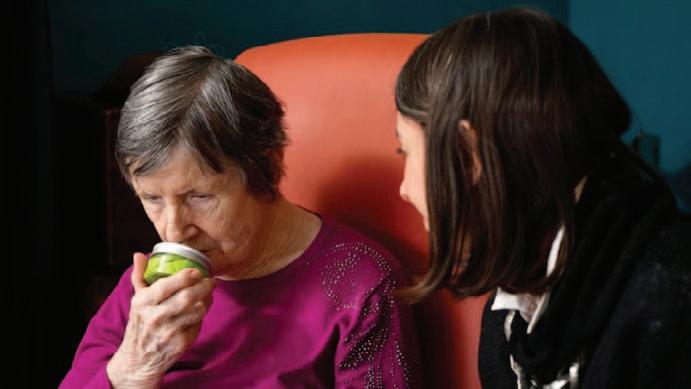
“Our sense of smell plays an important role in everyday life, shaping our perception and the way we interact with the world around us. This important sense mediates flavours of foods and drinks, significantly
enhances our quality of life, and is very powerful in triggering memories and associated emotions from our past.”
Federica’s research explores how the use of smell can trigger memory and emotional responses, and create positive stimulation for people living with dementia, which can enhance communication and engagement as well as strengthen cognitive function.
Together with colleagues from INTERDEM Methodology Taskforce –a leading European network of researchers committed to advancing early dementia detection and developing effective psychosocial interventions – Federica is co-leading METHODEM project. METHODEM aims to advance dementia research by exploring novel methodologies approaches to develop, evaluate and implement effective, relevant and sustainable psychosocial interventions in the real-world.
“Currently there is no cure for dementia and therefore it is essential that we are working to develop and evaluate effective and relevant psychosocial intervention for people with dementia and also, those who care for them.”
Avery Healthcare has donated over 400 pieces of obsolete IT equipment to The Air Ambulance Service (TAAS), helping turn unused technology into essential funds that will support the charity’s lifesaving missions.
The generous donation totals 435 items, including 134 laptops, 90 mobile phones, and various other computer accessories, all of which will be resold or responsibly recycled.
This initiative not only extends the life of the equipment but also ensures it is processed in an environmentally sustainable way. Proceeds from the sale or recycling of the items will help fund the charity’s lifesaving missions, crew training, and the purchase of essential medical equipment.
Avery Healthcare’s donation also demonstrates the company’s commitment to sustainability by reducing electronic waste and giving the equipment a second life.

James Revell, IT Manager at Avery Healthcare, said, “We’re proud that our donation of retired IT equipment not only helps The Air Ambulance Service fund its vital operations but also supports sustainability by reducing waste. This is a great example of how businesses can give back while making a positive environmental impact.”
TAAS includes the Warwickshire and Northamptonshire Air Ambulance (WNAA), the Derbyshire, Leicestershire and Rutland Air Ambulance (DLRAA) and the Children’s Air Ambulance (TCAA).
The WNAA and DLRAA crews provide pre-hospital critical care at a variety of incidents across the five counties and further afield. TCAA provide lifesaving transfers for critically ill babies and children across the UK.
With the support of donations like this one, the charity is able to maintain its fleet of helicopters and ensure its crews are fully equipped to respond 24/7, 365 days a year.
Sam Frost, IT Asset Reuse Manager for the charity said, “We would like to say a big thank you to Avery Healthcare for their continued donations to help raise vital funds to support our charity’s lifesaving missions.”
“With donations just like this they have helped to reduce the amount of equipment that ends up in landfill while keeping our helicopters flying,” she added.
Avery Healthcare, headquartered in Northampton, operates over 100 care homes across the UK and four independent retirement communities under the Hawthorns brand.
Avery Healthcare is also celebrating its continued recognition as one of the Top 20 Large Care Home Groups in the UK, following its success at the 2025 Carehome.co.uk Awards.
This partnership demonstrates the far-reaching impact of responsible reuse, showing how businesses can help reduce electronic waste while funding lifesaving care and promoting environmental sustainability.

A stunning model of St George’s Brewery, one of Bristol’s most iconic landmarks, has been meticulously crafted by 92-year-old care home resident Terry Lyons.
Terry has lived in Bristol his entire life and now resides at Avonmere Care Home in the city, which is owned by Avery Healthcare.
"I remember walking past St George’s Brewery as a boy, fascinated by its grand architecture and the bustle of workers coming and going," said Terry.
"It was an important part of Bristol’s character, and I wanted to bring it back to life in my own way."
Terry began work on this project in August 2024, constructing the model entirely from printed cardboard as a tribute to his childhood memories. Dating back to the early 19th century, St George’s Brewery was a key part of Bristol’s industrial landscape. Known for its distinctive architecture and bustling atmosphere, it produced popular ales like Bristol Best Bitter, St George’s Ale, and Golden Ale, which became staples in the local drinking culture.
"It took a lot of patience to create, but I loved every moment of it," Terry shared. "Recreating the little details, like the signage and roof shape, was especially satisfying. It feels like I’ve brought a piece of history back to life."
Throughout his life, Terry has been passionate about model-making. His craftsmanship has evolved over decades.
His next project will be a model of Bristol Castle, continuing his tradition of preserving local history through art.
"I’m already thinking about how I’ll approach Bristol Castle," Terry said. "There’s always another story to tell. I hope my models inspire others to appreciate our history."
Model-making remains a cherished hobby despite the many changes he has witnessed over the years.
Engaging in creative activities like this has been shown to benefit the elderly by keeping their minds active, improving dexterity, and providing a sense of purpose. It also boosts social connections and emotional well-being, helping residents stay engaged and fulfilled.
"These places meant something to me when I was young, and they still do today. I hope others see my models and remember the past with the same fondness that I do."
"Terry’s passion for model-making is truly inspiring, and we are delighted to support him in bringing his memories to life through his art," said Samantha Baronian, Home Manager at Avonmere Care Home.

She continued, "At Avery Healthcare, we encourage our residents to pursue their interests, as creative projects like this not only bring joy but also provide cognitive and emotional benefits. Terry’s work is a wonderful example of how hobbies can keep the mind active and preserve local history in a unique way."


Every week, the residents of Ashlynn Grange care home in Peterborough eagerly anticipate the arrival of Jenni Tilbrook and her vibrant Creative Mojo arts and crafts sessions. Once a month, she also brings her creativity to Aria Court in March, ensuring that residents have the chance to experience the fun and benefits of artistic expression.
Jenni’s regular visits allow her to build strong relationships with our residents, making each session both engaging and meaningful. It’s not just about the art; it’s about the experience—trying something new, socialising, and having fun. For example, during a recent session, residents created mosaic coasters, an activity that helped with dexterity and colour recognition but, more importantly, brought a sense of accomplishment and enjoyment.
Creative Mojo is a franchise, and Jenni is the franchisee for Cambridgeshire and Peterborough. She runs her sessions personally, and employs an assistant who aids in preparation. Her work takes her not only to care homes for the elderly but also to learning disability homes and even private clients.
Interestingly, Jenni wasn’t always in the arts. She previously worked as an accountant but always had a creative streak. “I often used to wake up and wonder if I really wanted to go to work,” she reflects. “Now, I love my job and am always ready to get up and out in the mornings.”
Running Creative Mojo sessions takes a lot of preparation. Jenni has countless boxes—and even entire rooms—filled with materials at her home. Each evening, she carefully plans what to bring for the next day, ensuring that everything needed for the chosen activity is packed in just the right amount of boxes for her to move about easily and ready to go.
Creative Mojo art sessions use pre-cut card shapes to help with design and painting and that is what
makes it very accessible to everyone, regardless of artistic ability said Jenni.
MORE THAN JUST ART
For Jenni and the residents, these sessions go beyond simply making art. While expressing oneself through creativity is important, the real magic lies in the social connections formed around the table. Residents chat, share stories, and immerse themselves in the moment.
Sometimes, the projects involve group efforts, like a recent St. Patrick’s Day wall poster, which encouraged conversation and teamwork. The themes are always seasonal or topical, sparking memories and discussions that enrich the experience.
Thanks to Jenni, Creative Mojo isn’t just about crafts—it’s about bringing joy, connection, and a little bit of artistic magic to our care homes.
Here are some key reasons why arts and crafts activities are important in care homes:
1. Cognitive stimulation – Engaging in creative activities helps maintain brain function, memory, and problem-solving skills.
2. Emotional wellbeing – Art provides a means of self-expression, which can improve mood.
3. Social interaction – Group activities foster friendships and reduce social isolation among residents.
4. Fine motor skills – Activities like painting, knitting, or sculpting help maintain hand-eye coordination and dexterity.
5. Sense of purpose – Creating something tangible gives residents a sense of achievement and fulfilment.
6. Stress and anxiety reduction – Engaging in arts and crafts can be relaxing and therapeutic, helping to lower stress levels.
7 Reminiscence therapy – Crafting can evoke memories, encouraging residents to share stories and recall past experiences.
8. Encouraging creativity – Expressing creativity can boost confidence and provide an enjoyable pastime.
9. Physical benefits – Certain activities, like pottery or beadwork, promote gentle movement, which can aid in joint flexibility.
10. Personalised Environment – Residents can decorate their space with their artwork, making their living environment feel homely and comforting.
Tim Adams, Sales & Marketing Director at Bidfood, is set to embark on a monumental challenge by participating in The Tour 21 in partnership with Flutter, cycling all 21 stages of the Tour de France route one week ahead of the professional race.
The event aims to raise over £1 million for Cure Leukaemia, funding the Trials Acceleration Programme (TAP) Network, which facilitates pioneering clinical trials for blood cancer patients across the globe, with someone diagnosed with blood cancer globally every 27 seconds, highlighting the critical need for ongoing research and clinical trials.
Expressing his motivation, Tim stated, “Taking on The Tour 21 has always been a bucket list opportunity for me. I have looked on with admiration over the past few Tours at those that have taken part, and this simply feels like an immense physical and mental challenge that I am incredibly lucky to have the opportunity to take part in.”
Each rider in The Tour 21 commits to raising £30,000. Tim has already surpassed this goal, amassing over £86,000 to date. His fundraising success is bolstered by support from numerous connections across the foodservice industry, with brands such as Wafflemeister, Unilever, Flora, Nestle, Kellanova (Kelloggs) and Kraft Heinz backing his mission.

During stages 16 to 19, Tim will be joined by three riders from his sponsors— Jonathan Tribe (Flora), Tom Franklin (Heinz), and Henry Bowles (Unilever)—who will participate in a four-stage segment as part of their sponsorship, further raising awareness for the cause.
There are limited spaces remaining to join Tim and the Tour 21 team as part of a 4-stage package taking on stages 16-19, including the iconic Mont Ventoux. For more information on the 4-stage package visit www.thetour21.co.uk.
“I’m excited to be part of a team that is going to raise such important funds for this great charity, £1m will be a hell of an achievement and I want to ensure I play my part in getting to this. To think that one day we may be able to prevent blood cancer through the research and trials that are enabled by our fundraising is a truly humbling and motivating thought.”
The Tour 21 team includes former National Chef of The Year, Hayden Groves, serving as a ride captain, underscoring the event’s deep connection with the foodservice industry.
Tim is approaching the £100,000 fundraising milestone and aspires to become The Tour 21’s highest individual fundraiser, aiming to surpass the current record of £120,000, which would fund over two clinical research nurses alone.
The Burlington, part of the Boutique Care Homes family, has recently welcomed the local community and resident families to a heartfelt and informative Stroke Awareness Talk, hosted in partnership with The Stroke Association. Reflecting the home’s commitment to creating meaningful connections and enriching lives, the event provided invaluable insights into stroke prevention, recognition, and support.
Led by Arnold Matimba, Engagement Officer at The Stroke Association, the session offered clear, practical advice on understanding strokes, spotting the warning signs, and taking swift, effective action. Attendees were introduced to the essential FAST test — a simple yet life-saving method to identify strokes quickly and respond with confidence.
The Burlington’s warm and inviting atmosphere provided the perfect setting for open conversation and shared learning. Attendees described the session as “eyeopening”, with many expressing surprise at how much they had learned. One participant reflected, “I didn’t realise how much there was to know about strokes and that there is so much we can do to try and avoid this happening to us.” Another shared, “My friend recently had a stroke and I had no idea how to support them. I now know what action to take if it happens again.”
To measure impact, a live poll was held before and after the talk. Prior to the session, half of attendees rated their stroke knowledge between 1 and 5 on a scale of 0 to 10. Following the event, every participant rated their understanding between 6 and

10 — a clear demonstration of the event’s success in raising awareness and empowering the community.
Kirsty Ford, Admissions Manager at The Burlington, commented: “It was wonderful to welcome our community and resident families to this important session. Seeing everyone leave with greater understanding and confidence around stroke prevention is truly rewarding. It’s moments like these that reflect our ethos of creating a warm and loving family where everyone feels at home.”
Arnold Matimba added: “The Burlington provided a welcoming space for people to come together, share their experiences, and build their knowledge. The engagement and positive feedback were fantastic, and it really highlights the importance of bringing stroke awareness into community settings like this.”
Looking ahead, The Burlington and The Stroke Association are excited to build on this success with the launch of the Stroke Friendship Café — a welcoming, supportive space for stroke survivors and their families to connect, share, and receive ongoing support. More details will be shared soon, as The Burlington continues its mission to be a true hub for its community.
Kirsty Ford concluded: “Our partnership with The Stroke Association embodies our belief in care so good, it’s unexpected. We look forward to the opening of the Stroke Friendship Café and the opportunity to continue supporting those in our community who need it most.”

The unique Mental
and
Assessment and Diagnosis, NHS Talking Therapies and Crisis Services framework agreement provides NHS organisations with easy access to suppliers, including voluntary, community and social enterprises, that offer a wide range of services and can help reduce waiting times.
The mental health charity, Mind, found that the cost of poor mental health is around £300bn a year in England alone. For children and young people, mental health services now account for over £1bn of NHS spending annually in England.
The new framework agreement is one of the first to be awarded under the new Provider Selection Regime, providing NHS trusts with the assurance that contracts awarded are fully compliant with the new legislation.
It is split into three Lots:
LOT 1 – ASSESSMENT AND DIAGNOSIS
This includes a range of services and clinical assessments used in the diagnosis of common mental health conditions, severe mental illness, and neurological conditions. The lot will also include provision for ongoing assessments.
This lot covers NHS talking therapies for anxiety

and depression. It provides treatment and psychotherapy for people with common mental health problems, including mixed depression and anxiety, panic disorder, agoraphobiaand post-traumatic stress disorder (PTSD).
LOT 3 – CRISIS SERVICES
This focuses on relapse prevention, helping relevant authorities respond to patients at times when their mental health and/or social situation has deteriorated to the point they are at considerable risk and require additional support to remain in their current accommodation and/or prevent further harm.
aura Goodwin, category manager for NHS SBS, explained: “Following extensive research and market engagement, NHS SBS understood the need and urgency for this one-of-a-kind Mental Health, Learning Disability and Autism: Assessment and Diagnosis, NHS Talking Therapies and Crisis Services Framework Agreement.
“Mental health problems are rising, and as a result, people are waiting longer than they should to access the care they need – a problem that has been highlighted in the Long Term Plan, the NHS 2024/25 priorities and Lord Darzi’s review of the NHS.
“Trusted, competent third-party suppliers are an efficient and effective way of tackling waiting lists.
With our NHS customers contacting us regularly looking for help, we are confident that this new framework agreement will enable trusts to get the additional support they – and their patients – so desperately need.”

• We specialise in the sale and purchase of quality used wheelchair accessible vehicles and ambulances.
• They can be bought as seen or refurbished and sign-written to your own requirements.
• Fully serviced, new mot & warranty
• Engineers inspection supplied if required.
• Free delivery service available
• All buses comply with new legislation
• Lease hire and purchase available
• Always large stock of accessible



REM have been manufacturing furniture for the Hair & Beauty Sector for over 100 years and are now considered to be one of the largest manufacturers in both the UK & Europe. Understanding the growing requirement for Care & Residential Home Salons, REM’s Design Team have produced the Pendle Care Range for the Small, Compact Care Home Salon.
The Prime Minister has today announced a major overhaul of the way researchers access NHS data, in a move that could unlock faster progress towards a cure for dementia and other major conditions.
Backed by Government and global research charity, the Wellcome Trust, the new £600 million Health Data Research Service will give scientists quicker, safer access to large-scale NHS datasets.
The Government says the changes will slash red tape around clinical trials – which is currently limiting access to research and innovative treatments – and help position the UK as a global leader in medical research and life sciences.
The time it takes to set up clinical trials in the UK will be reduced from over 250 days to 150 by March 2026, through national contracting standards and improved transparency in approval timelines.

The new system will also remove duplication and streamline applications, bringing together datasets currently scattered across different parts of the NHS. Data will be held securely, with strict safeguards to protect patient privacy and anonymity.
Welcoming the announcement, Hilary-Evans Newton, Chief Executive of Alzheimer’s Research UK, said the new data service could a be “game changer” for dementia research. “By cutting red tape around data access and clinical trials, the UK can accelerate the development of new diagnostics and treatments, and become a magnet for global investment,” she said.
“Dementia is the nation’s biggest killer, and with no treatments currently available on the NHS that slow or stop the condition, this momentum couldn’t come at a more urgent time.”
Wellcome Trust Chief Executive John-Arne Røttingen said the new service would remove “significant overhead” in finding and using NHS data. “The simpler it is to analyse data or identify patients to join clinical trials, the more quickly we can improve our understanding of illness and develop new treatments.”
As well as accelerating the search for new treatments, the Health Data Research Service is expected to help drive economic growth by creating jobs, attracting investment, and easing the long-term burden of chronic diseases like dementia.
“It means growth that puts more money in working people’s pockets with more, better paid jobs,” explained the Prime Minister.
Dementia already costs the UK economy over £25 billion a year – a figure expected to rise sharply as the population ages. According to Alzheimer’s Research UK, every £1 invested in dementia research today could return £2.50 to the economy, through improved productivity and reduced care costs.
Health and Social Care Secretary Wes Streeting stressed that patients would benefit from improved access to new treatments and technologies, while data confidentiality would remain a “gold standard”, with rigorous security measures in place.
Science Secretary Peter Kyle added that protecting the data and anonymity of patients was “non-negotiable”.
Alzheimer’s Research UK says putting people with dementia at the heart of how the system is designed will be essential to building public trust and ensuring impact.
“With the right safeguards in place,” Hilary Evans-Newton added, “trusted access to NHS data can be a powerful force for good – helping the UK lead the world in life sciences and transform the outlook for everyone affected by dementia.”
The service is expected to launch later this year, with full plans due alongside the upcoming Spending Review.
Anchor care homes across Yorkshire held simultaneous coffee mornings to help raise money for a dementia charity.
The Manor House Harrogate, The Manor House Knaresborough, The Mill House Skipton, Borrage House (Ripon), Gill’s Top (Grassington), and Townend Close (Keighley) all took part in the fundraising efforts on Wednesday 19 March in aid of Dementia Forward, which supports people living with dementia and their families across North Yorkshire.
The Anchor care homes invited members of the community to join their respective coffee mornings, with residents welcoming the opportunity to meet new people.
Jean Clarkson, 82, who is a resident at The Manor House Knaresborough, said: “It’s such a small world. Today at the coffee morning raising money for Dementia Forward, I bumped into someone I’ve known for years but hadn’t seen in so long.
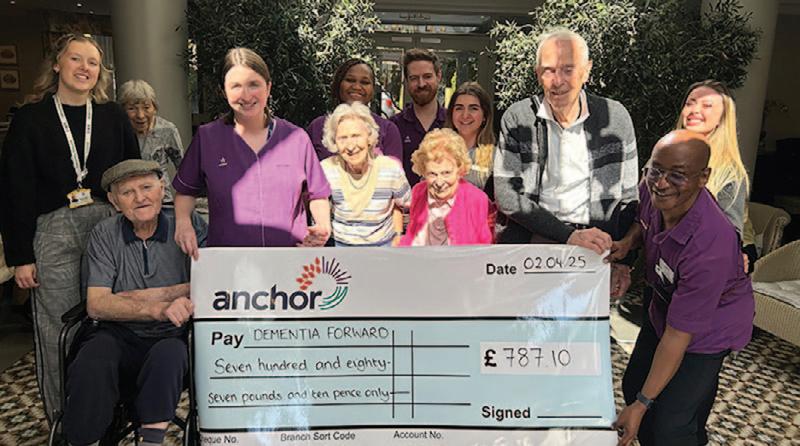
“Over a cup of tea and cupcake, we shared memories and caught up like no time had passed. Staying here has brought me so many wonderful connections, both old and new. Moments like these are so special — I don’t think
people realise how meaningful they really are.”
Anchor Community Partnership Manager Caryn Ferguson said: “Fundraising for local charities and organisations like Dementia Forward is very important to us. After all, we all have the same aim; to look after the people in our communities who need us most.
“Welcoming the wider community into Anchor care homes to be part of our events and celebrations is very important to the residents as it enhances the importance they still have as members of the towns and villages they live in.”
A spokesperson for Dementia Forward said: “A huge thank you to Anchor for hosting six wonderful coffee mornings across their homes in North Yorkshire. Fundraising efforts like these are invaluable in helping us continue to provide essential services for people living with dementia and their loved ones.
“Local support makes a real difference, allowing us to provide advice, guidance and support when it’s needed most. We are so grateful to Anchor for hosting, and everyone who contributed to these fantastic coffee mornings.”
Talented care home residents in Dorset showed off their theatrical skills by devising, rehearsing and performing a whirlwind ‘play in a day’. The storyline and cast of characters in The Bahaman Bear Scare at Colten Care’s Avon Cliff in Bournemouth were decided in the morning ahead of its staging in the afternoon.
It was the latest production by the home’s in-house troupe the Avon Cliff Players which features active involvement by residents and team members.
Only a rough plot and setting were decided earlier, giving time for a cardboard set to be painted.
The troupe then agreed story elements such as a Bahaman beach, a mysterious cave and an enchanted forest.
Companionship Team Leader Elise Martin said: “The morning of the performance we devised our story line, chose the songs, cast our characters and came up with the show title.

“In the afternoon we were ready to perform in full costume with props and set pieces.
“We played everything from an evil crimelord bear, playful monkeys, kind fairies and even a barmaid.
“The highlight was definitely the colourful finale of There’s No Business Like Show Business.”
Michael Griffiths, who played the bear, said: “The way the story developed was unbelievable at times but was told with so much conviction I was certainly on board.”
Fellow resident Dawn Street, a former jazz singer, said: “It felt great to perform again. It’s always such great fun and we all have a laugh. Our performances knock the socks off everyone.”
Elise added: “Devising and staging plays in this way provides lots of fun for everyone involved.
“We do it in a relaxed and supportive environment incorporating suggestions from our residents to enhance the story.
“After another successful performance from the Avon Cliff Players, we are looking forward to what we might do next.”

The government’s forthcoming apprenticeship reforms will deter many nursing employers from upskilling their workforce via higher and degree apprenticeships, according to 69% of the nation’s universities.
Research by the University Vocational Awards Council (UVAC) of its university members across the UK, examines what impact future changes, such as the government’s new Growth and Skills Levy, will have on healthcare from a funding, diversity, skills and productivity perspective.
The study reflects the mood of pessimism surrounding reforms, with 45% believing the new levy will be more complicated for employers to understand and 30% claiming it will increase the levels of bureaucracy and administration associated with the previous system.
Despite one of the primary employer frustrations in the past being the use of unspent levy contributions returned to the Treasury, over a third (39%) of respondents felt the Growth and Skills Levy will actually increase the amount of unused funds.
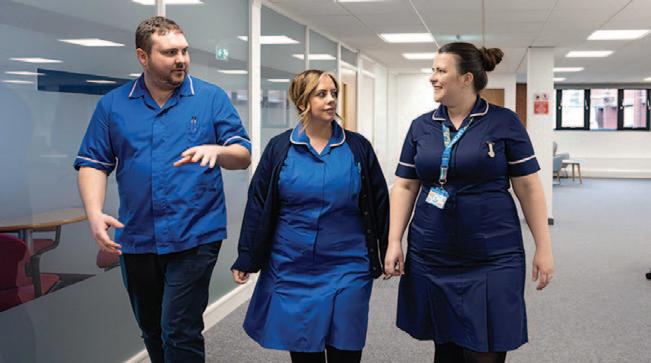
With higher and degree apprenticeships critical to helping the healthcare sector develop future managers or fill specialist and senior-level roles, 81% were concerned the new levy will reduce the number of employers training older apprentices aged over 25. From a social inclusion perspective, 55% felt it will lead to a decline of new nursing apprentices from underserved communities.
Although 72% of respondents felt employers should do more to attract younger apprentices, 89% felt the government’s other proposed reform to establish ‘foundation’ apprenticeships for younger people will be at the expense of higher and degree apprenticeships.
The growing concern that the current scope of higher and degree apprenticeships should be broadened to cater for more sectors is addressed by the findings, with around half of respondents fearing the new levy will cater for less industries.
The study also explored what impact the government’s plans to restrict level 7 training funding will have
on healthcare organisations. All survey respondents were unanimous that it will reduce the number of employers who engage with at apprenticeships at this level.
The majority of respondents also had serious concerns around the level 7 funding cuts, with 94% believing it will provide less opportunity for employers to upskill existing workforces. A further 75% said it will reduce the number of people achieving senior-level roles within organisations, whilst 72% claim it will cause a shortfall in employees filling specialist, technical positions.
A feeling of gloom still surrounds the government’s annual apprenticeship budget which dedicates around 20% of funding to degree apprenticeships, with 69% claiming the overall pot will decrease.
One of the few stand-out positives from the study are that 39% of respondents claim the planned reforms to provide shorter apprenticeships will help those employers that can’t commit to a longer, 12-month minimum apprenticeship.
Dr. Mandy Crawford-Lee, chief executive for UVAC commented: “Our research has really lifted the lid on some genuine concerns around the government’s planned Growth and Skills Levy, its announced level 7 funding restrictions and introduction of foundation apprenticeships. Many universities are worried about the impact these reforms will have on healthcare employers which rely heavily on higher and degree apprenticeships to address skills gaps, drive business growth, promote diversity and develop those in senior and technical roles.
“We wholeheartedly support Labour’s drive to engage more younger people in apprenticeships, but this must not be at the cost of growing the number of programmes at higher and degree level. We’d therefore urge the government to ring-fence the funding of apprenticeships across all ages and levels and even invest more given that it has outlined its commitment to growing the UK economy and addressing the skills gap.”
Residents from Cuffley Manor in Potters Bar, Hertfordshire, recently joined the Hertfordshire Health Walks for a delightful stroll starting from Oakmere Library and meandering through the tranquil paths of Oakmere Park. The event brought together people from different walks of life, creating a warm and inclusive environment where conversations flowed as smoothly as the gentle breeze that accompanied the walkers.
The beauty of these walks extends far beyond physical exercise. As participants took in the sights and sounds of nature, they also experienced profound emotional and social benefits. For many, the walk was not just about staying active but also about nurturing friendships, sharing stories, and creating a sense of belonging. Moments like these highlight the importance of staying connected to the community, especially for older adults who thrive on meaningful interactions and shared experiences.

The impact of the walk was best expressed by the residents themselves. One resident B.D shared, “This is the first time I’ve joined a community group walk, and it’s been absolutely lovely to meet new people and feel so connected to nature. I had a great time!” Another resident J.A added with a smile, “I didn’t
expect it to be this much fun! It really lifted my spirits, and I’d love to do more walks like this in the park.”
Hertfordshire Health Walks provides an excellent opportunity for individuals of all ages and abilities to engage in low-impact physical activity while enjoying the natural beauty of the local surroundings. Walking in nature has been shown to enhance mental wellbeing by reducing stress and boosting mood, while also offering a chance to build lasting connections with fellow walkers.
Participants returned home with smiles and warm hearts, reflecting on a day that left them feeling energised, uplifted, and deeply connected to their community. Events like these demonstrate how simple outdoor activities can have a profound impact on both physical and emotional wellbeing.
Whether you’re looking to stay fit, meet new people, or simply enjoy the serenity of nature, Hertfordshire Health Walks welcomes everyone to take part. Walks are free, accessible, and guided by trained leaders, ensuring that participants feel safe and supported throughout their journey.
Embrace the beauty of the outdoors. Walk for health, walk for happiness, and walk for community.
The highly anticipated Care Show London 2025 is set to return to Excel London on 30 April – 1 May 2025! This premier event is more than just an exhibition; it’s a vibrant community gathering dedicated to celebrating, inspiring, and advancing the care sector.
Free to attend for those who work for a social care provider (including but not exclusive to care homes, nursing homes and domiciliary care), in addition to healthcare, allied healthcare, NHS, public sector professionals, chefs, catering professionals, architects and interior designers, Care Show London 2025 will bring together over 3,500 care professionals from across the UK. The event promises to be a celebration of shared dedication, filled with opportunities to network, learn, and enjoy the company of like-minded individuals who share your passion for delivering exceptional care.

Over the course of two days, attendees will have the chance to immerse themselves in a CPD-accredited
conference programme, hosted across 6 dedicated theatres. This comprehensive line-up will offer a 360-degree view of today’s social care landscape through a variety of formats. The programme covers key themes including quality, compliance and collaboration, workforce development and wellbeing, funding, business management and sustainability, catering and nutrition, and technology and innovation Explore the expansive show floor, showcasing over 200 key suppliers ranging from leading names to pioneering start-ups making waves in the sector. Attendees will have access to a wide array of innovative products and services, including digital solutions, care equipment, waste management services, recruitment platforms, training programs, financial services, textiles, and more. It’s the perfect opportunity to discover fresh ideas and tools that will enhance your care services and streamline operations.
Social care communications
experts PLMR Partnership have teamed up with Championing Social Care (CSC) to create an innovative ‘Invite Your MP’ digital toolkit, designed to support this year’s Care Home Open Week (CHOW) and strengthen relationships between social care providers and policymakers.
The interactive website, developed by the communications agency’s digital experts, makes it easier than ever for care homes across the UK to engage their local MPs and councillors.
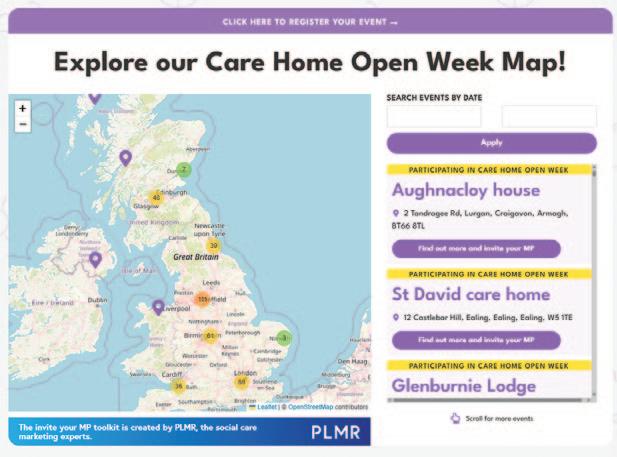
USERS CAN SIMPLY ENTER THEIR POSTCODE TO:
* Identify their local MP
* Invite them to their CHOW event with just a few clicks
• Share event details on an interactive public map, helping communities, media, and decision-makers see where celebrations are happening
Care Home Open Week, taking place this year between 16th to 22nd June, is an annual event that sees thousands of care homes across the country open their doors to the public, welcoming families, local partners, and politicians. It is an opportunity to challenge misconceptions, highlight the positive impact of social care services, enable residents to remain part of their community, and showcase the dedication of care teams nationwide.
With the event providing a national platform to shout about the incredible work of care teams, this new toolkit ensures the
voices of care providers and residents are heard at the highest levels of government.
Championing Social Care (CSC) is a volunteer-led initiative dedicated to promoting and celebrating the vital role of the social care sector. Through events like Care Home Open Week, CSC aims to connect care providers with local communities and policymakers.
Edward Maxfield, Director of Championing Social Care, said: “Care Home Open Week is a moment of national celebration, and it’s fantastic to have the support of PLMR in creating this user-friendly toolkit. By making it easier than ever for care homes to connect with MPs and councillors, we are helping to ensure that social care remains firmly on the political agenda. We encourage care homes across the country to take advantage of this new tool and make their voices heard.”
Nathan Hollow, Head of Health and Social Care at PLMR, commented: “We are incredibly proud to be working with Championing Social Care to help make this year’s Care Home Open Week the biggest and most successful to date. It’s a pivotal time for the sector following the National Insurance changes and the soon to launch Casey Commission, with CHOW providing an ideal opportunity to showcase the hugely positive health, wellbeing, social, and economic impact of care services in communities across the UK.”
To access the toolkit, please visit: https://map.championingsocialcare.org.uk/





Alzheimer’s Society has teamed up with ITV and Coronation Street in order to shine a light on the growing impact of dementia across the UK.
Alzheimer’s Society has teamed up with ITV and Coronation Street in order to shine a light on the growing impact of dementia across the UK. Positioning themselves as the charity who is there to tackle every aspect of the disease and to give help for today and hope for the future.
Created in partnership with Medialab and ITV Creative, the campaign features four bespoke linear spots which compliment a storyline about beloved Coronation Street character Debbie Webster being diagnosed

with dementia.
The voiceover, by former cast member Julie Hesmondhalgh, references the growing prevalence of dementia in the UK and the critical work Alzheimer’s Society is doing to support people like Debbie.
The voiceover is accompanied by images of iconic Coronation Street settings, with forget-me-not plants budding to reflect the growing problem of dementia. As the idents progress, the flowers begin to bloom, reflecting the help Alzheimer’s Society provides and its much-loved forget-me-not logo.
Thomas Hedley, also known as Tom, a resident at HC-One’s Ashington Grange Care Home in Ashington, Northumberland, will embark on an incredible journey – attempting to wheel himself the entire length of Hadrian’s Wall, which stretches 73 miles, all in support of Alzheimer’s Society.
With the help of Ian Lavery, Member of Parliament for Blyth and Ashington, Tom is aiming to raise awareness and vital funds for this important cause. Tom is planning to wheel himself the distance of Hadrian’s Wall, which is approximately 73 miles (117.5 kilometres).
Hadrian’s Wall, built by the Roman Empire in northern England, stretches from coast to coast from Wallsend on the River Tyne in the east to Bownesson-Solway on the Solway Firth in the west.
This distance reflects the wall’s original length, though some sections have
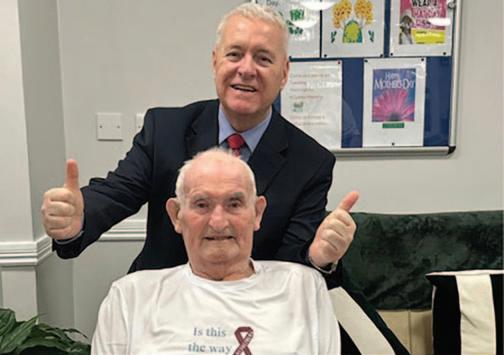
deteriorated or been lost over time. Ian Lavery, Member of Parliament (MP) for Blyth and Ashington, gave words of encouragement to Tom. Ian Lavery, Member of Parliament (MP) for Blyth and Ashington, stated: “The strong bond between staff and residents is evident.
I was incredibly proud to meet resident, Thomas Hedley who is taking on a 73-mile challenge, the same length as Hadrian’s Wall, for Alzheimer’s. This will be a remarkable feat, and I wish him every success.”
Andrea Pringle, Ashington Grange Care Home Manager, said: “Tom is an inspiration to us all. Our residents are thrilled with the dedication Tom is showing to complete this. It is such a wonderful generous thing to do and for a great cause. Well done Tom!”
With April marking Stress Awareness Month – a time dedicated to exploring the causes of modern-day stress and how to alleviate it, one leading care provider is highlighting the importance of supporting those who care for others, as part of its ongoing commitment to workplace well-being.
Nellsar, a family-run group of 13 care homes across the South East, understands that life can be demanding – with pressures from work, parenting, caring for loved ones and financial worries all taking their toll. That’s why the group uses a dedicated helpline to give its team members and their immediate family access to free, confidential support whenever they need it.
Recent findings from Carers UK’s State of Caring 2025 report reinforce the importance of such services, revealing that over three in 10 (35%) carers reported experiencing ‘bad’ or ‘very bad’ mental health – a significant rise from 27% the previous year.

In addition, more than half (56%) of carers struggling financially also had poor mental health, while an alarming 65% reported that the rising cost of living is having a detrimental impact on their physical and mental wellbeing.
As part of its commitment to creating a workplace where employees are heard, empowered and cared for, Nellsar’s helpline offers a safe, multilingual space to talk with trained professionals. It provides emotion-
al reassurance, practical guidance and signposting in all languages required by the diverse team belonging to the Nellsar Family. Whether it’s legal queries, financial concerns or simply needing someone to listen, the service is there to help judgement-free.
Luminita Mandache, Quality Development and Innovation Manager at Nellsar, said: “Caring is a rewarding but demanding role – both physically and emotionally. We’ve always placed well-being at the heart of our culture and this helpline is an important part of that, alongside tailored support for those experiencing the effects of menopause. It’s a space where our team can share their worries, seek advice and get the reassurance they need – in their own language, with zero judgement. It’s about reminding our carers that they’re not alone.”
Nellsar recently carried out an internal survey on staff mental health and well-being, where 70% reported ‘very good’ to ‘excellent’ mental health – a 68% increase on the stark national average of just 2%.
Luminita continued: “If we want to provide exceptional care for our residents, we must first look after those providing it. This helpline is just one way we’re doing that and it’s making a real difference.” To find out more about Nellsar’s helpline and its commitment to carer well-being, please visit: https://www.nellsar.com.
“Treat Each Person As An Individual And Not The Task Or The Diagnosis” Says Care Assistant Who Celebrates 15-Year Work
A care assistant celebrating his 15-year work anniversary says care staff should always “treat each person as an individual and not the task or the diagnosis”
Carl Allum works as a care assistant at MHA Westbury Grange and celebrated his 15-year work anniversary.
To mark his achievement Carl was presented with a certificate by home manager Julie Roche.
MHA Westbury Grange provides residential dementia and general nursing care for 45 residents.
Speaking after the presentation Carl said: “Being at MHA Westbury Grange for 15 years it feels like a massive achievement, and I didn't realise it has been that long.
“I found out about the role here from a former colleague of mine, I live about 10 mins away from the home, so it is very convenient for me.
“Receiving the certificate was a surprise. I had forgotten how long I have been here.
“We were just at the end of music therapy session, there were staff, residents and families present when I was presented with my certificate and everyone sang congratulations.
“I really enjoy working at MHA Westbury Grange, the residents, colleagues and the atmosphere makes the home a great place to work.
“For anyone thinking of starting a career in care, I would say go for it. You have to treat each person as an individual and not the task or the diagnosis.
“You need a sense of humour, put yourself in the shoes of the residents and be able to laugh and cry with them.”
Julie added: “Carl is an excellent carer, he has such a calm gentle approach and has the ability to care for people in the most challenging situations.”

Caring for a loved one is a journey of commitment, love and dedication, but it also comes with profound challenge and responsibility.

Whether it’s elderly relatives, individuals with dementia, people with disabilities, or those with complex medical needs, ensuring their safety – especially in emergencies – is a constant concern. Your priority is always their safety and well-being. But what happens when you can’t be there?
If a person with dementia wanders, will responders know who they are and who to contact? If someone with epilepsy, diabetes, or a severe allergy experiences a medical crisis, will 昀rst responders have the right information to act quickly and safely?
MiCode, a British-made, NHS-backed innovation, understands these concerns. It offers a simple yet powerful solution designed to bring peace of mind to carers and protect those they love.

A Carer’s Story at the Heart of MiCode
MiCode wasn’t conceived in a boardroom; it was born from a place of love and necessity. Professor James Ohene-Djan, a leading technologist from Goldsmiths, University of London, and his sister Professor Louise Brown developed MiCode after witnessing the challenges faced by their brother, Anthony, who lived with multiple sclerosis (MS).



As Anthony’s condition progressed, communicating his medical needs became increasingly dif昀cult. James and Louise saw 昀rsthand how a lack of instantly accessible medical details could put vulnerable individuals at risk. They used their expertise to create MiCode – a simple, effective, and affordable way to ensure people always have their vital medical information at hand. It’s a solution built by carers, for carers.
What is MiCode, and How Does it Help?
MiCode is a secure QR code system that provides immediate access to essential medical and emergency contact information. Unlike traditional medical ID bracelets, which can only hold a few words, MiCode acts as a digital lifeline and allows 昀rst responders, paramedics, and you to access a complete, up-to-date medical pro昀le in seconds.
Each MiCode securely stores:
• Emergency contacts: Ensuring the right people are called 昀rst – including you.
• Medical conditions: Allowing paramedics and carers to make informed decisions.
• Allergy and medication details: Preventing potentially dangerous treatment errors.
• Care instructions: Supporting continuity of care across different carers and settings.
• Instant translation: Ensuring accessibility in diverse communities and while traveling abroad.
Designed for Real Life, Backed by the NHS
MiCode is a proudly British company, using cutting-edge British technology to enhance safety and ef昀ciency in healthcare. It has been developed in close collaboration with the NHS, with a particular focus on supporting children, older adults, and individuals with complex care needs.
Unlike many healthcare solutions that require expensive subscriptions or complicated apps, MiCode has been designed to be:
• Affordable: At just £2 per month or £20 annually, MiCode is accessible to individuals, families, and care organisations.
• Easy to use: No apps, logins, or complicated passwords—just a simple scan with any smartphone.
• Practical for real-world emergencies: Whether at home, in a care facility, or traveling, medical and emergency details are always accessible.
MiCode can be seamlessly integrated into daily life, making it a 昀exible and convenient tool for those receiving care, their families, and professional caregivers.
• Wearable options: MiCode can be worn as a bracelet, pendant, or keyring, ensuring it is always available in an emergency.
• Mobile integration: MiCode can be displayed on a mobile phone screen for instant access.
• Cards and stickers: Ideal for placement in wallets, on mobility aids, or in homes, ensuring carers and emergency responders can retrieve information immediately.
• Clothing and pre-printed items: MiCodes can be integrated into uniforms, lanyards, and ID badges, making them particularly bene昀cial for care home residents and individuals prone to wandering or confusion.
Unlike many digital health systems that require Wi-Fi, apps, or login credentials, MiCode is designed to work instantly with any smartphone camera. This makes it particularly useful for those who may not be comfortable with technology or who need a reliable, always-accessible solution.
For family carers, MiCode provides invaluable peace of mind. If something happens and you are not present, you can trust that 昀rst responders will have all the necessary information to provide the best possible care and contact you immediately.
For professional carers and care companies, MiCode ensures:
• Faster emergency response – Information is available instantly, without the need to search through 昀les or records.
• Improved communication between care teams – Every carer and responder has access to the same critical information, ensuring consistency in care.
• Reduced risk of medication errors – MiCode provides real-time medication details, preventing dangerous mistakes.
• Lower operational costs – At just £20 per year per person, MiCode is an affordable alternative to complex digital health record systems.
MiCode is already being adopted by care homes, assisted living providers, and NHS services, contributing to a safer and more ef昀cient care environment.

MiCode Can Save Lives
Emergencies happen when least expected. Being prepared can mean the difference between life and death.
For families, MiCode offers reassurance that their loved ones are protected, even when they are not around.
For carers, it is a simple, affordable, and lifesaving tool that ensures 昀rst responders and healthcare providers have immediate access to accurate medical information.
For care companies, it is a scalale, costeffective solution that enhances patient safety, reduces risk, and improves communication between care teams.
And for those who rely on care, MiCode is a lifeline—ensuring that in any emergency, help arrives quickly, accurately, and ef昀ciently.
MiCode isn’t just technology; it’s a way to empower you, the carer, and protect the ones you love.
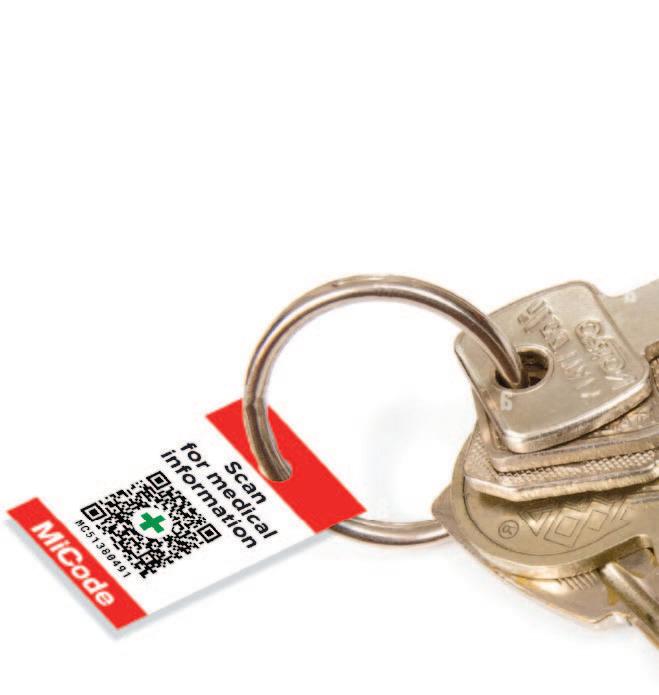
Learn more and 昀nd out how MiCode can bring peace of mind to your caring journey at micode.uk.
View an Explainer video for Carers at https://tinyurl.com/cr6mu8cd
Two devoted care assistants from Chorleywood Manor Care Home have raised over £1,100 for dementia charities after completing the London Landmarks Half Marathon on Sunday 6 April 2025.
Wendy Hunt and Charmaine Buckley, both passionate members of the care team at the Avery Healthcare-owned home in Chorleywood, laced up their trainers for the 13.1-mile challenge through the capital, raising vital funds for Dementia UK and Alzheimer’s Research.
The pair crossed the finish line with impressive times: Charmaine in two hours, 16 minutes and 11 seconds, and Wendy in two hours, 50 minutes and 17 seconds.
In total, they raised £1,146.25 for causes close to their hearts.
The money raised will go towards supporting families affected by dementia and funding vital research into treatments and a potential cure.

Charmaine, a seasoned runner and mum of two from Rickmansworth, said the energy of the race brought back memories of her 2024 London Marathon.
“I always get a few nerves before a race,” Charmaine said. “But that feeling of achievement at the finish line never goes away. It means so much to run for people living with dementia, especially when I see the
impact it has on them and their families every day.”
Wendy, also from Rickmansworth, was taking on her first ever race of this kind and said the support along the route helped her push through.
“I never thought I’d do something like this,” Wendy said. “But hearing the crowd cheer, knowing I was doing it for something bigger, it was emotional, and I’ll never forget it.”
Both care assistants have seen the effects of dementia first-hand through their work, but also personally.
Wendy was inspired by her mother-in-law’s journey with Alzheimer’s. Seeing the impact it had on her family gave her a deep, personal drive to take on the challenge and raise awareness.
Charmaine, a passionate advocate for dementia care, says her day-today experiences supporting residents living with the condition gave her an emotional connection to the cause.
Fiona Kazaza, Home Manager at Chorleywood Manor Care Home, said,
“We’re all so incredibly proud of Wendy and Charmaine. Their commitment, not only to our residents but to raising awareness and funds for dementia support, is truly inspiring. They really do go above and beyond, on and off the track.”
a resident at Sanctuary Care’s Hastings Residential Care Home, where Frank celebrated his landmark birthday.
In his youth, Frank worked in HM Customs and Excise in London before he was called up to serve for his country during World War II.
During his deployment, Frank trained as a Royal Naval Officer and was later promoted to First Lieutenant Officer aboard HMS Honeysuckle.
When he signed up for the Navy, Frank imagined spending his days on “a cruiser in a warmer climate” but instead, ended up on a “rusty, old ship that needed painting in Liverpool”.

His journey in the Royal Navy took him all over the world. He recalls a standout World War II mission, which saw his ship attacked by German planes as they escorted two submarines which had to come above the surface of the water off the Norwegian coast.
Frank said: “When we saw the German aircraft, we knew it was coming for us. I knew they were going to bomb us. I could hear a knocking sound but quickly realised it was my knees knocking together!”
After the war, Frank moved to Walsall where he met his wife-to-be, actress Lily. The proud father and now Great-grandfather, Frank recalls: “Six weeks later we decided we were going to spend the rest of our lives together – Lily was the best thing that happened to me.”
According to Frank, the secret to his longevity is “always keeping the faith”, coupled with “sitting down whilst putting my trousers on” – ensuring he does not fall over. Frank added: “The Lord has been very kind to me every day – I say my prayers every morning and thank him that he has given me another day.”
Shelly Ford, Home Manager at not-for-profit Hastings Residential Care Home, commented: “Frank is a fantastic gentleman, who has lived an incredibly inspiring life. He has so many great stories to share. We were thrilled to celebrate his milestone birthday with him.”
At HC-One’s Primrose House Care Home, in Haslington, Crewe, life is about more than just care – it is about rekindling the spark of cherished memories and creating moments that matter.
For resident Maurice Lythgoe, a former swimming instructor with a lifelong love for the water, that moment came in a triumphant return to the pool. This proves that passion knows no bounds, even in the face of dementia and Maurice’s story is one of joy, purpose, and the power of connection.
After heartfelt conversations with Maurice and his family, the team at Primrose House uncovered just how much swimming had meant to him. It has been a source of happiness and pride from his days guiding others through the water.
Determined to bring that magic back, the Primrose House Wellbeing team, led by Home Manager Dawn Sadler, leaped into action. They partnered with the local swim-

ming baths to arrange a special session tailored just for Maurice. Primrose House Wellbeing Coordinator Rose Neyland and Dawn were by Maurice’s side, cheering him on as he was hoisted into the water on a wheelchair. The moment his feet touched the pool, it was as if time rewound.
A wave of familiarity and delight washed over him, his face lighting up with the same enthusiasm that once defined his days as an instructor.
Dawn Sadler, HC-One’s Primrose House Care Home Manager, said:
“We’re committed to helping our dementia residents reconnect with the moments that shaped their lives. Maurice often shares stories of his time as a swimming instructor, and we knew this was a chance to bring that part of his past back to life. Watching him beam with happiness in the water was a reminder of why we do what we do – it was pure, heartwarming joy.”
An apprentice was reunited with his teacher after more than 35 years thanks to a post going viral on social media.
Denis Hilton, a resident at MHA Handsworth turned 104 last month, and the home marked his birthday with a party, which was shared on the Facebook page of a hyperlocal news website Altrincham Today.
The post got more than 2300 reactions and over 170 comments, which included one from John Brennan, who was taught upholstery by Denis in the 80s.
Denis taught John between 1982 to 1988 at Swain and Turners, on Upper Chorlton Road in Chorlton.
John was very keen to meet Denis and contacted the home.
Following a conversation with Denis’s nieces, activity coordinator Charlotte Fowkes arranged for the two to meet.
John attended the home along with Denis’s niece and spent around 1 hour and a half chatting and walking in the garden with Denis.
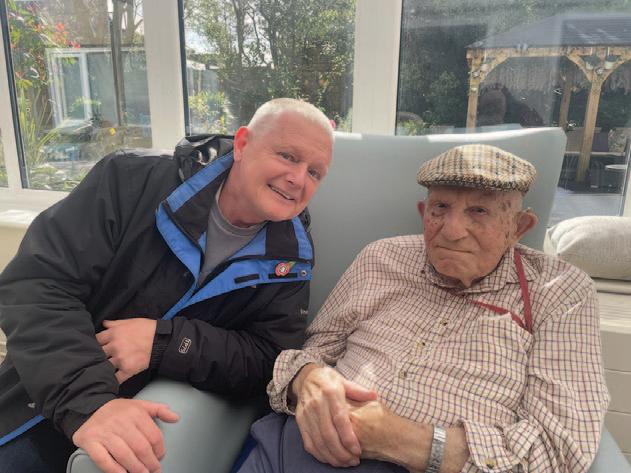
Speaking after the visit John said: “I worked with Denis for around six years before he retired.
“As a teacher and friend, he was fun, fair and well disciplined.
“He was always punctual and thanks to his teaching I decided to get my own shop and work in antique furniture.
“I did try to keep contact with Denis after he retired but lost his address.
“I am so happy I saw his birthday post on Facebook and hope to return to visit him again soon.”
Denis’s niece Karen added: “It's a compliment to Denis that John made contact and has made Denis feel valued.
“It was a part of his life that we were not aware of and has given us another topic of conversation.
“Upholstery was the only career he had, John was so good with Denis and there is this saying that upholsterers never die, they just recover.”

New survey insights reveal the far-reaching impact caregiving can have on physical and mental well-being, with over half (54%) of caregivers reporting weekly back, joint or muscle pain, and 1 in 5 (19%) experiencing daily stress or anxiety.[i] Dr Dawn Harper shares her tips to help cope.
There are approximately 4.7 million unpaid carers in the UK,[ii] defined as those who provide unpaid care for someone who is ill, disabled, older, has mental health issues or struggles with addiction. However, this figure excludes the many who regularly care for children, neighbours or friends and family needing support beyond the traditional definitions. Carers UK estimates that the number of unpaid carers could be as high as 10.6 million, highlighting a significant lack of personal and societal recognition of what it truly means to provide care.[iii]
A new survey, commissioned by GOPO® Joint Health – a leading supplement proven to reduce pain and stiffness and improve mobility – polled 1,001 self-defined caregivers. The findings reveal the true impact of caregiving on mental, emotional and physical health.
Over one-third (37%) have experienced significant strain, discomfort or injury to their joints as a result of assisting or lifting the person they care for, and almost half (47%) frequently endure persistent aches, stiffness or pain that lingers long after caregiving tasks.i As a result, one-third (32%) rely heavily on pain medication, putting their own long-term health at risk.
The mental toll of caregiving is profound, with almost half (46%) of caregivers feeling emotionally drained by the relentless stress it brings. One in seven (13%) rely on support services for their well-being, while nearly half (44%) experience loneliness or isolation at least once a week, often facing the demands of caregiving alone.
Despite these challenges, almost half (49%) of respondents cannot remember the last time they practiced self-care, admitting that their own needs always come last.i While caregivers devote themselves to others, acknowledging the importance of self-care, and setting aside time for their own well-being is vital.
Dr Dawn Harper, formerly a caregiver to her mother, NHS doctor for over 30 years and author of ‘Live Well to 101’, comments: “Caregiving is a labour of love, but the selfless nature of the role puts many caregivers at serious risk of poor health. As a GP I see first-hand the impact that caring can have on both physical and mental ill health. To continue supporting others, it’s vital to care for yourself first. Just like the safety advice on an aeroplane – put on your own oxygen mask before helping others. Prioritising your own wellbeing ensures you have the strength, resilience and capacity to provide the care your loved ones need in the long-term.”
Dr Dawn Harper provides her top tips to support caregivers’ health and well-being: Seek support from peers: “It can be easy to lose your identity when providing care, so it’s important to connect with peers who are in a similar situation. If you are unable to leave the house often, online forums or virtual coffee sessions can provide an outlet to enable you to open up to someone who understands exactly
what you’re going through. Their acceptance and understanding can be a great way to support your emotional health and leave you feeling less alone.”
Schedule self-care: “Caregiving often leaves little time for personal well-being, but self-care isn’t a luxury, it’s a necessity. Schedule self-care just like any essential appointment and if you’re struggling to find the time, start with small manageable breaks of just 5-10 minutes and commit to doing one thing that makes you feel recharged. This could be as simple as having a cup of tea in silence or reading a few chapters of your favourite book.”
Build your mental resilience: “Mental resilience helps caregivers manage stress, maintain emotional balance and continue providing care without burning out. Incorporate techniques such as mindfulness, deep breathing, yoga or meditation, all of which can be practiced in as little as 15 minutes. If you are struggling with your mental health, make sure to reach out to mental health helplines or listening services, or discuss your feelings with your GP or pharmacist.”
Prioritise your physical health: “Caregiving is a physically demanding role, and these survey findings reveal the true toll caregiving can take on your physical health. Protect your joints and posture by using proper lifting techniques when assisting with mobility, and address any aches and pains early to help prevent chronic conditions from appearing later down the line. A joint health supplement such as the galactolipid, GOPO, a compound derived from rose-hip, may be of great benefit, with research indicating that it can effectively relieve joint pain.[iv] The natural anti-inflammatory properties of GOPO make it a viable replacement to pain killers,iv without the risk of harmful side effects, and a sustainable way to manage pain long-term.”
Extensive studies involving over 400 patients with chronic pain conditions, such as osteoarthritis, have shown that GOPO® produces significant and consistent pain relief and improved joint function. In one study, 8 out of 10 patients reported a significant reduction in pain after just 3 weeks of GOPO®.[v]
GOPO® Joint Health is available from Boots, Amazon, and independent chemists and retailers nationwide. Visit www.gopo.co.uk for further information.
[i] GOPO® Joint Health survey on 1,001 caregivers in the UK. January 2025.
[ii] The Kings Fund. 2024. What are unpaid carers, who are they and how often do they provide care? Available at: https://www.kingsfund.org.uk/insight-and-analysis/data-and-charts/unpaid-carersnutshell#:~:text=According%20to%20the%202021%20Census,females%20from%20the%202011%20Census. (Accessed: January 2024). [iii] Carers UK. 2023. Annual Report 2022-2023. Available at: https://www.carersuk.org/media/ynfpnjwk/carers-uk-annual-report-22_23 (Accessed: January 2025).
[iv] Winther, K et al. “A powder made from seeds and shells of a rose-hip subspecies (Rosa canina) reduces symptoms of knee and hip osteoarthritis: a randomized, double-blind, placebo-controlled clinical trial.” Scandinavian journal of rheumatology vol. 34,4 (2005)
[v] Winther, K et al. “A powder made from seeds and shells of a rose-hip subspecies (Rosa canina) reduces symptoms of knee and hip osteoarthritis: a randomized, double-blind, placebo-controlled clinical trial.” Scandinavian journal of rheumatology vol. 34,4 (2005)
[vi] Rein E, Kharazmi A, Winther K. A herbal remedy, Hyben Vital (stand. Powder of a subspecies of Rosa canina fruits), reduces pain and improves general wellbeing in patients with OA – a double-blind, placebo-controlled, randomised trial. Phytomedicine 2004.
[vii] Christensen R et al. Does the hip powder of Rose canina (rosehip) reduce pain in osteoarthritis patients? – a meta-analysis of randomised controlled trials, Osteoarthritis Cartilage (2008)
[viii] Schwager J, Richard N, Wolfram S. Anti-inflammatory and chondro-protective effects of rosehip powder and its constituent galactolipids GOPO Poster presentation at the World Congress of Osteoarthritis (OARSI) 2008
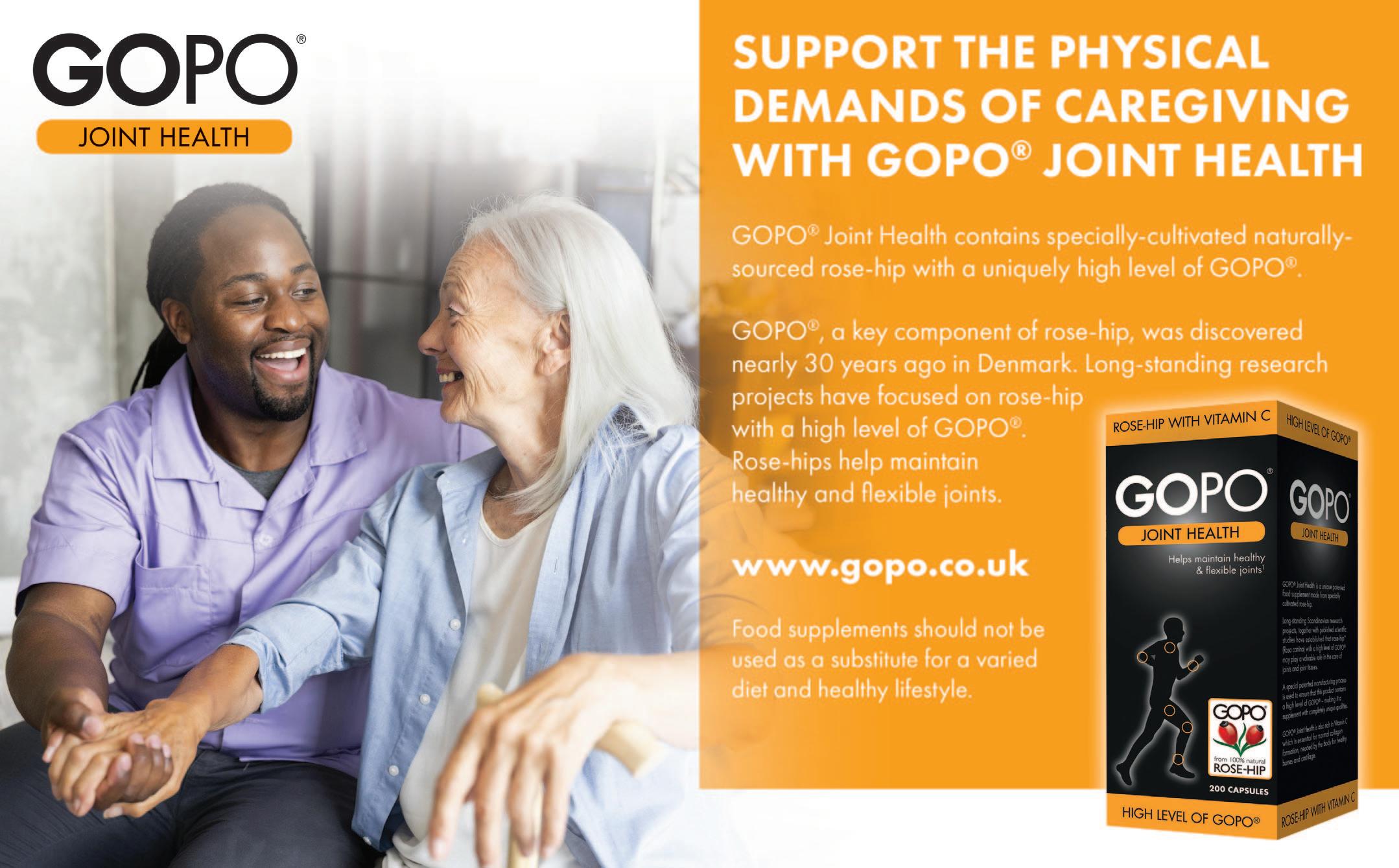
A brand new community café has opened at a social care residential service in Lockerbie which supports adults with learning disabilities.
The café – which has been named Hartnells in memory of a former resident - is a social enterprise designed to benefit both residents of the Cygnet Social Care service and the wider community who will be able to access the new service.
The café will provide valuable work experience and skills training for the residents living at Trinity Lodge and nearby Trinity House.
The initiative is centred on promoting key employment skills, including customer service, money handling, health and safety, and food hygiene.
Residents working in the café will have the opportunity to gain recognised qualifications, helping to prepare them for future employment opportunities within the community.
Initially, the café will open for a few hours per week, welcoming both residents at the Cygnet Social Care services and the local community. It will be run primarily by those residents supported by Trinity Lodge, with the chef at the service preparing simple yet delicious meals such as toasties, soups, and light snacks.
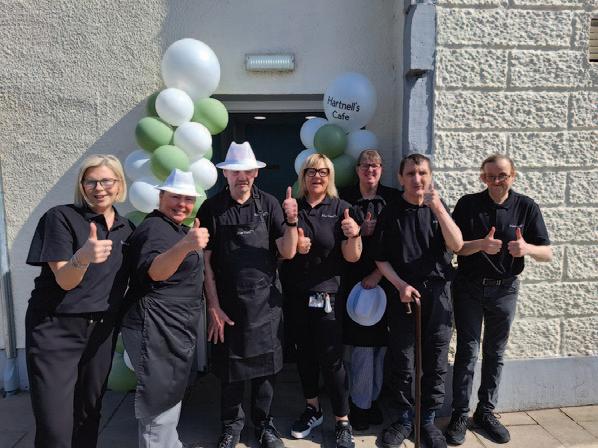
The residents will take orders, serve customers, and handle transactions, gaining hands-on experience in a supportive environment.
Heather Smith, Cygnet Social Care Operations Director, said: “The café’s creation was a collective decision, with individuals living at Trinity House and Lodge fully backing the project when discussions first took place.
“As a tribute to a long-term resident, Greg Hartnell, who lived at Trinity House for 20 years before sadly passing away in 2023, the café will be named in his honour, ensuring his memory remains a part of the community.”
Beyond its daytime role, the café will transform into an internal hub in the evenings, providing a communal space for the residents.
Heather added: “As the project develops, we do have aspirations to extend voluntary opportunities to the wider community, further embedding the café as a valuable social and vocational resource.
“We want this café to be more than just a place to enjoy a meal—it’s an opportunity for our residents to develop skills, gain confidence, and engage with the wider community.
“Naming it after someone who was such an integral part of Trinity Lodge makes it even more special. We are excited to see the impact this initiative will have on both our residents and our neighbours.
“This initiative is not only about providing a welcoming space for the local community but also about empowering individuals with practical experience that will support their future job applications. Over time, the café aims to expand its operations, increasing its opening hours and strengthening its role as a vital community asset.
“We are really looking forward to welcoming residents, visitors, and supporters to experience the new café and be part of this exciting journey.”
Trinity Lodge, on Townhead Street, and Trinity House, on Carlisle Street, are specialist residential services supporting adults with learning disabilities and complex needs.
Forget about the Hollywood Oscars in Los Angeles … Penwortham Grange and Lodge Care Home in Preston recently hosted its very first Oscars ceremony, and it was a night to remember!
In the weeks leading up to the big event, residents and colleagues eagerly filled out their nomination forms, adding a buzz of excitement to the home. The anticipation built up, and when the big night arrived, it was all glamour and fun, with bubbly drinks flowing, a red-carpet entrance for all, and Oscar-style music setting the mood.
The evening was hosted by the dynamic trio of Activity Coordinators at Penwortham Grange and Lodge - Jayne Farrow, Michelle Quinn and Deepika Tak, who kept the energy high and the fun flowing throughout the event. It was a night of celebration and sparkle, where everyone felt like a star!
We can finally reveal the winners. They were:
Most glamorous: resident Joyce
Best smile: resident John
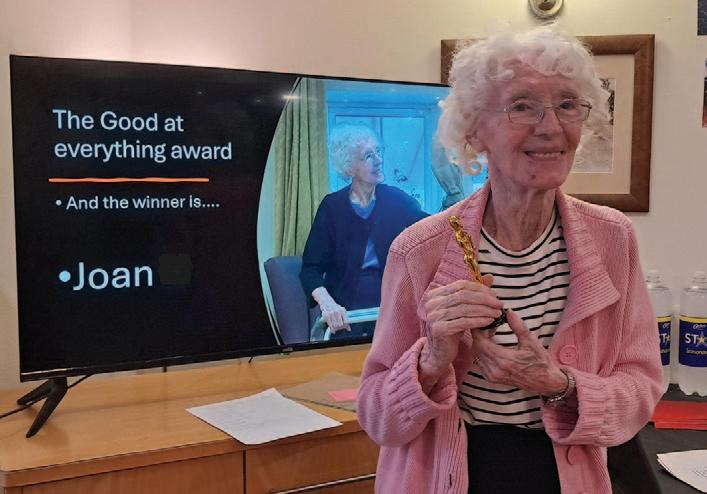
Most likely to be on the cover of a magazine: resident Vera Funniest resident: Joan
Funniest staff member: colleague Mandy Hodgson
Good at everything: resident Joan H
Most likely to lift your spirits: resident Dinah
Outstanding staff member: Mandy Hodgson
Afterwards, the people who live and work at Penwortham Grange and Lodge had the chance to hop onto the karaoke machine to show off their musical talents.
Jayne said: “The afternoon was a real success and was a great opportunity to get colleagues, residents and their loved ones together to share a very special afternoon celebrating the amazing people we have here at Penwortham.
“It was an afternoon filled with laughter and some emotional moments - I feel so proud to be part of the team. The afternoon showcased the bond we have here and the friendships we share,’’ said Deepika.

The Malthouse Care Home in Dorset recently had the pleasure of hosting a unique and educational experience for residents, when Alan from Pitcombe Rock Falconry brought in five beautiful owls for a special visit. The event was an absolute hit, with residents enjoying the opportunity to get up close with these magnificent birds of prey.
Pitcombe Rock Falconry is a non-profit organisation dedicated to the rescue and rehabilitation of birds of prey. With a team of dedicated volunteers, they currently care for around 70 birds, many of which have been rescued from difficult circumstances. Some of these birds are fortunate enough to have not needed rescue, and they play an important role in educational programmes. These birds are hand-reared to help educate the public on the importance of conservation and rehabilitation.
The visit featured several owls, including Winston, a 22-year-old barn owl who has defied the odds and is still going strong in his twilight years. Barn owls are known for being silent flyers, making
them one of the quietest birds in the world, and they primarily feed on rodents like voles.
Residents also met Maple, an Indian Scops Owl, one of the smallest owls. Maple, born at Pitcombe Rock Falconry, eats primarily insects but will also consume small birds and rodents. Maple's parents were rescued from a situation where they could no longer be cared for, and now she serves as a winged ambassador for the rescue organisation.
Resident Doug said, "It was marvellous to see such lovely birds," and Leah, Activities Coordinator at the Malthouse, shared her thoughts on the event: "It was lovely to see so many smiles on the residents' faces. To see so many of them engaged”.
The visit was not only educational but also provided a hands-on experience for the residents, allowing them to feel and learn about the different textures of the owls' feathers, giving them a deeper appreciation for these incredible creatures.

HC-One’s Hambleton Grange, in Thirsk, recently rolled out the bingo cards and turned their cinema room into a buzzing bingo hall, marking a first for residents. This was part of an exciting collaboration with Meadowfields Housing and Care, as the team transformed the space into a lively venue for an unforgettable evening of friendly competition and connection.
With the stage set and the big screen fired up, it was “eyes down” as residents of Hambleton Grange squared off against their friends from Meadowfields. The air filled with laughter, but the Hambleton Grange team did not quite clinch the victory. Elaine Snowden, Hambleton Grange Lifestyle Manager, revealed that their team “lost every game”, but that they are planning a rematch next month and this time they are “determined to come out on top”.
For the residents, the event was more than just a game – it was a chance to reconnect. Using the cinema room’s technology, participants could see and wave to
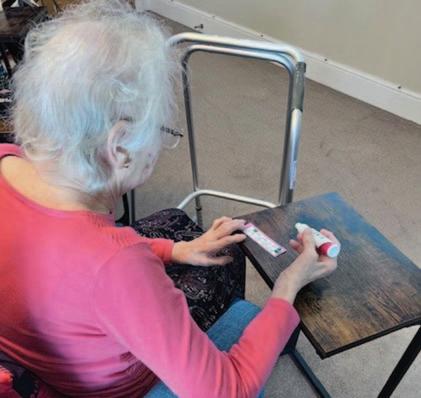
familiar faces in real time, bridging the gap between communities.
Mary Fidell, Hambleton Grange resident, stated:
“It was good, I enjoyed it. Can we do it again? I could see my friends – we waved to each other. It was great.”
Elaine Snowden, Hambleton Grange Lifestyle Manager, said:
“It was a great experience for the residents, and I loved seeing their faces as they recognised people they knew, on the screen.”
The innovative bingo afternoon showcased the power of creativity and technology in fostering social bonds, leaving everyone smiling and eagerly anticipating the next round. Hambleton Grange is already counting the days until they can call “Bingo” and claim victory.
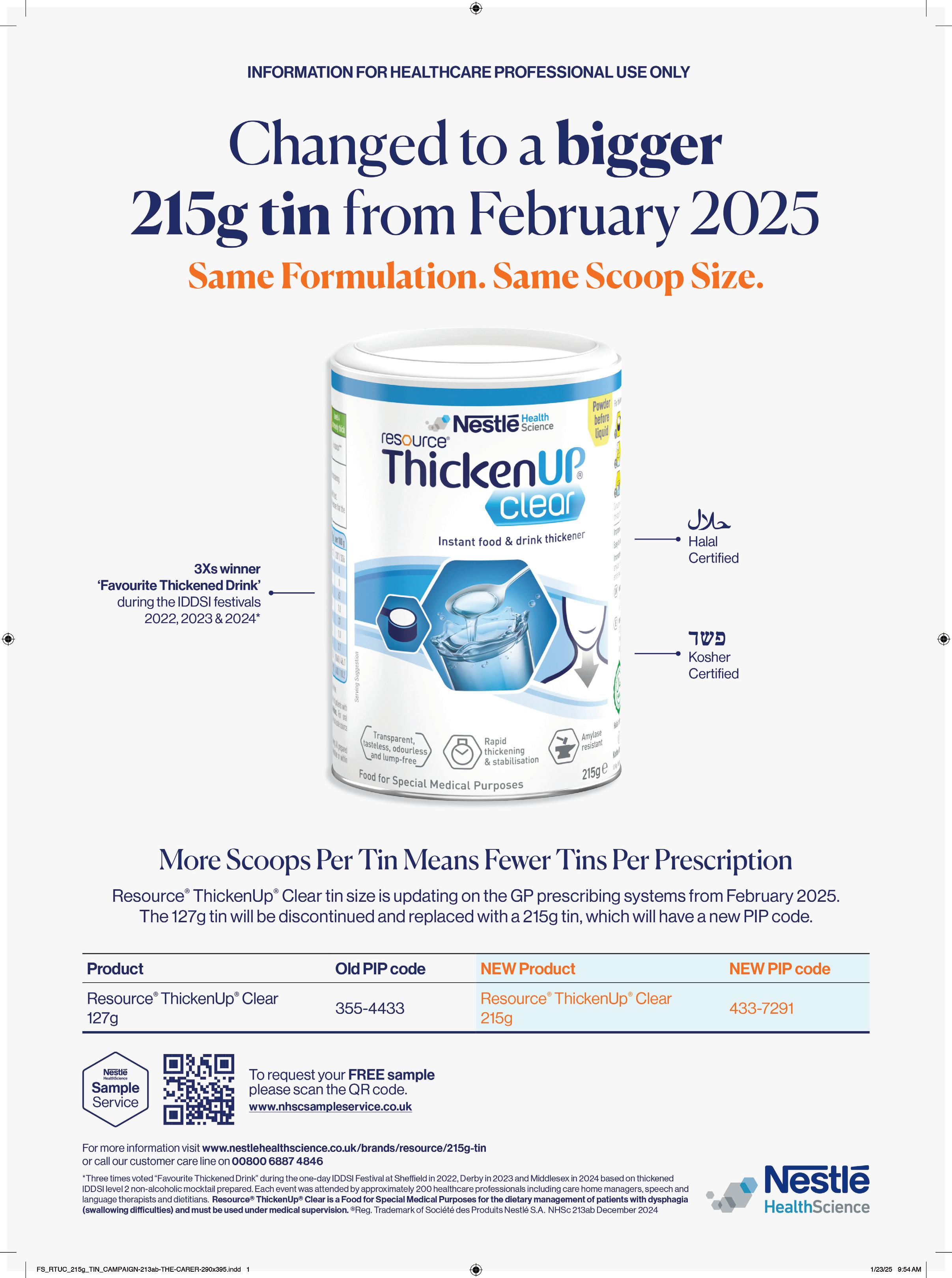


A family business has launched the UK’s first frozen nutritional supplement, ideal for care home residents who may be struggling to eat or drink.
icesupp are 100% plant-based frozen supplements, enriched with key vitamins, minerals, protein and calories, delivered in ice lolly formats to provide an easy-to-consume source of nutrition.

Amy Smith and her partner Robert Upton got the idea when they realised the lack of options for Amy’s father Ray as he struggled to build and maintain his weight during bowel cancer treatment.
Managing a conventional diet was very difficult, and the nutritional supplements available on prescription were unpalatable - too thick and sickly. However, Ray did discover that ice lollies were soothing and easier to consume.
“We were frustrated that the ice lollies Dad was having were just filled with sugar and water, and didn’t provide the nutrition and quality calories that he needed to keep his weight and strength up,” says Amy.
“The idea for icesupp was born – and it became our mission to create something that would combine the nutritional elements of a supplement shake with the more palatable form of a soothing iced refreshment.”
BAPEN’s Malnutrition and Nutritional Care Survey (2023) highlighted that nearly well over half (48%) of adults screened across UK health and care settings were at risk of disease-related malnutrition. This was particularly high amongst individuals with cancer, gastrointestinal conditions respiratory conditions, frailty and neurological diseases – so this is a very real issue for carers and families across the UK.
Following two funding rounds, Amy and Rob worked Reading University’s Food Science Department and a team of specialist advisors including top dietitians, an oncologist and a GP to create their unique, first-tomarket products, which come in two flavours – Mango & Passionfruit and Mixed Berries. 100% plant-based, each 86ml supplement pouch contains 5g of protein, 2.5g of fibre and 150 calories -
helping those who are struggling to eat to build strength and energy. A box of 12 products costs £23.75 from icesupp or Amazon. The products are shipped in ambient liquid form to be conveniently frozen then deliver the soothing sorbet-like iced consistency.
Nick Dutton, of Primrose Bank Care Home, says: "Helping those we care for to maintain and increase their nutritional intake is no easy task, made even more challenging when coupled with other dietary requirements, palliative care needs and the general challenges the care sector faces.
“When we came across icesuspp we were interested straight away. Having seen our own relatives struggling to eat well during palliative care and facing malnutrition and knowing the difficulties faced with different nutritional supplements and changing taste, we knew that a different way to deliver nutrients and flavour was a great idea.
“icesupps taste really good and we have had brilliant feedback from everyone in the home, residents, families and staff alike. We love that they are easy to store and also easy to eat without needing lots of preparation to make them enjoyable like some ONS.
“It’s great to have another tool for our team to use to improve our residents’ lives."


Amy concludes: “We have created an iced supplement that soothes and nourishes, helping to provide a moment of refreshing relief for those in need. Our goal is to help families like ours, who have experienced the devastating effects of dramatic weight loss and malnutrition, which can impact anyone, however those that are particularly at risk include those with an illness like our Dad such as cancer, and those aged over the age of 65, especially if they are in a care home or have been recently admitted to hospital.”
Dietitian Corrine Toyn says: “Malnutrition can be caused by range of factors. In the case of Ray, it was the side effects of the illness and his treatment, which is very common – but we know it is a real issue in care homes, along with dehydration. Oral nutrition supplements have been part of the solution to malnutrition for a while, as long as patients find them palatable and are compliant, but the majority of the ‘ready to drink’ supplements are highly concentrated, with a thick consistency that can be difficult to consume. Improving the flavour, mouth-feel and variety is vital to prevent patients’ taste fatigue, provide choice, and ultimately improve their quality of life. icesupp is such a brilliant idea, created with love and expertise, to respond to a real problem. It’s been incredible to see the reviews from customers, saying that icesupp tastes great and is easy to consume.”
For further information, email info@icesupp.com or visit the website at www.icesupp.com
Heathcare professionals can access the sample service at www.icesupp.com/pages/the-healthcare-professionals-hub

Taylor & Taylor, a group of family-owned residential care homes approached food procurement experts, allmanhall to achieve scalable cost savings and efficiencies to support their growth plans. They needed to ensure no detrimental impact to the excellent quality of their food offering and their residents’ dining pleasure.
Their desire was to achieve a 5% food cost saving and to ensure ongoing effective management of catering budgets and invoicing. Operationally, access to reports and insights were key, as was ease of ordering and management of stock and deliveries.
allmanhall undertook a like-for-like benchmark and identified achievable food cost savings of 11.4% - more than double the initial objective!
allmanhall delivered tech demos of the catering control platform for Taylor and Taylor, ensuring it met their needs and provided training for the team. As well as providing useful operational functionality like stock taking and standing orders, the catering control platform proposed would also give access to management reports and facilitate central billing and conversion of all supplier invoices in to 1 per month. Samples and on-site supplier meetings were also arranged on behalf of the homes, to confirm that the quality was to the required standard.
allmanhall have also supported Taylor and Taylor with the launch of a community engagement event for one of their newest homes.
A few months into the contract, the actual results were found to be an 18% food cost saving! You can watch this short video on You Tube to find out more… www.youtube.com/watch?v=e2QrrmaiG1Y
“From day 1, the care and attention provided by allmanhall has been exceptional. The team truly listen to us, to what our challenges are and are always willing to help in any way they can. Their approach is thorough and responsive, meaning we feel fully supported. Everyone we’ve met from allmanhall has been hands-on, down to earth, genuine and considerate.
We’ve been impressed by the savings we’ve already seen, the flexibility regarding suppliers and by the excellent quality. The consolidation of invoices into 1 per month is a huge win.
We have relationships and contact with people across the allmanhall team – all there to help and to advise or resolve depending on what we need. With challenges around labour shortages and food inflation, this is hugely valued. It frees up the team and gives us peace of mind.
We would wholeheartedly recommend allmanhall’s services to others in the care sector and look forward to continuing to grow our offering and provide outstanding food for our residents, with allmanhall as our trusted partners.”
allmanhall is an owner-managed, award-winning and trusted food procurement partner for care organisations across the UK. We help clients with a range of needs, including cost savings, administrative efficiencies, supplier management, dietetics and nutrition support, and sustainability goals. Get in touch to find out more:
Email: hello@allmanhall.co.uk
Telephone: 01225 745520
Website: allmanhall.co.uk
LinkedIn: @allmanhall


By Derek Aaronson, Founder & CEO of
Hart Home Group (www.harthomegroup.co.uk)

Infection control and prevention are critical components in safeguarding the health and well-being of individuals in medical, commercial, and domestic environments.
For the independent nursing and residential care home sector, maintaining stringent infection control measures is not just a matter of compliance, but a fundamental responsibility to ensure the safety of vulnerable residents. As the world continues to grapple with new and evolving health threats, the importance of infection prevention cannot be overstated.
THE
For nursing and residential care homes, infection control is especially crucial. Residents often have weakened immune systems due to age or pre-existing conditions, making them more susceptible to infections. In such settings, even a minor lapse in hygiene protocols can lead to the rapid spread of pathogens, which can have devastating consequences. Healthcare-associated infections (HAIs) continue to be a significant risk in care homes, leading to longer hospital stays, higher medical costs, and, in severe cases, death.
Therefore, infection control in care homes requires a combination of effective policies, thorough cleaning routines, and specialised equipment. Staff must be well-trained in infection prevention, and robust systems need to be in place to manage outbreaks when they occur. However, achieving a high standard of hygiene in care homes comes with its own set of challenges.
INFECTION CONTROL IN CARE HOMES
THE
Maintaining high levels of hygiene in care homes can be difficult for several reasons. The close proximity of residents, especially in shared rooms, communal spaces, and bathrooms, increases the risk of cross-contamination. Frequent touching of high-contact surfaces such as handrails, doorknobs, and shared equipment can facilitate the spread of germs. In addition, staff turnover and the demanding nature of care work mean that infection control protocols may not always be followed consistently.
The traditional reliance on manual cleaning methods can also be timeconsuming and may not always be effective in eradicating harmful bacteria and viruses. With the rise of antimicrobial-resistant organisms (AROs), which are more difficult to treat, care homes must adopt more advanced solutions to combat the spread of infection.
SOLUTIONS TO ENHANCE INFECTION PREVENTION IN CARE HOMES
The solution to these challenges lies in a combination of better practices, staff training, and, crucially, the use of advanced infection control technologies and equipment. Specialised hospital-grade fixtures, such as antimicrobial door handles, bed rails, and mobility aids, are invaluable in preventing the spread of infection in care homes. These fixtures are designed with non-porous materials that are easy to clean and resistant to microbial growth, ensuring that harmful pathogens have fewer places to thrive.
In addition, the use of touchless technologies is gaining traction in care homes as a way to reduce human contact with frequently touched surfaces. For example, touchless faucets, soap dispensers, and hand sanitisers can significantly minimise the risk of cross-contamination. These innovations not only make it easier to maintain hygiene but also improve the overall user experience for both staff and residents, especially for those with limited mobility.
Innovative cleaning solutions, such as UV-C sterilisation devices, are also helping care homes maintain higher standards of hygiene. UV-C light has been shown to be effective at killing bacteria, viruses, and fungi on surfaces and in the air , providing an added layer of protection that manual cleaning alone cannot guarantee.
The role of design and product innovation in infection control is crucial. Products designed with infection prevention in mind—such as hospitalgrade furniture, non-porous flooring, and antimicrobial textiles—play a crucial role in reducing the potential for cross-contamination in care homes. By choosing products made from materials that are resistant to bacterial growth and easier to sanitise, care homes can significantly reduce the risk of infections spreading.
Mobility aids, including walkers, wheelchairs, and lift chairs, are another area where innovation is making a difference. Many of these products now come with antimicrobial coatings that help reduce the risk of pathogens accumulating on surfaces frequently touched by both residents and staff.
These small changes in the design of everyday equipment can contribute to a cleaner, safer environment for both residents and caregivers. Moreover, the growing use of digital solutions, such as automated temperature monitoring, air quality control systems, and remote monitoring devices, is transforming infection control in care homes. These technologies allow staff to track and manage infection risks more efficiently, making it easier to identify potential outbreaks before they escalate. EMERGING TRENDS: TOUCHLESS TECHNOLOGY AND SUSTAINABLE MATERIALS
As the infection control industry evolves, there are two key trends that are gaining momentum: the integration of touchless technology and the use of sustainable materials. The increasing adoption of touchless systems, such as motion-activated doors and automated sanitation stations, is helping to prevent the transmission of pathogens, especially in hightraffic areas. These technologies not only improve infection control but also enhance the overall user experience by reducing the need for physical interaction, which is particularly beneficial in care settings where residents may have limited mobility or dexterity.
Sustainability is another important consideration in infection prevention. The use of environmentally friendly materials—such as biodegradable cleaning products, sustainable textiles, and recyclable medical supplies— ensures that infection control measures are both effective and responsible. The growing demand for eco-friendly solutions in care homes is part of a larger global movement towards sustainability, where reducing environmental impact goes hand-in-hand with enhancing hygiene standards. Infection control and prevention are vital to ensuring the health and safety of residents in care homes. While the challenges of maintaining hygiene in these environments are significant, the solutions are becoming increasingly effective with advancements in technology and product innovation. From hospital-grade fixtures and antimicrobial mobility aids to touchless technology and sustainable materials, these innovations are helping to reduce cross-contamination and improve overall safety. As the sector continues to evolve, adopting these innovations will be key to enhancing infection prevention protocols and safeguarding the health of vulnerable individuals across nursing and residential care homes. Through a combination of best practices, innovation, and thoughtful design, care homes can create a safer, cleaner, and more resilient environment for residents and staff alike.
How can buyers of cleaning chemicals find sustainable solutions that are also effective and safe to use. The Cleaning & Hygiene Suppliers Association (CHSA) has published a White Paper designed to help: The Evolution and Regulation of Cleaning Chemicals.
Buyers and end users of cleaning chemicals want environmentally sustainable, safe and effective cleaning chemicals. Environmental mes-
sages can be seductive, particularly when coupled with highly competitive prices. In the regulated arena of cleaning chemicals, it is difficult to produce products that are effective, have a minimal impact on the environment and are sustainable. It takes years of investment and testing to get the products right and clear the regulatory hurdles. It’s not surprising, therefore, that some organisations are looking for short cuts.

They argue technology is moving so fast there is no time for independent verification or regulation. Essentially, they are suggesting the need for some kind of environmentally sustainable solutions outweighs the need to know if the solution is indeed environmentally sustainable, if it works or how to use it to be certain it is safe.
Regulations, however, matter. They guarantee safety. They underpin transparency and ensure consistency. They provide a framework for comparison, so a buyer really knows if they are getting the product or solution they need. They also provide accountability, giving buyers a route to recourse if needed. In short, they underwrite an ethical approach.
The CHSA’s White Paper was written by Peter Thistlethwaite, Technical Manager – Cosmetics and Biocides at MSL Solution Providers. Peter is a Microbiologist and MSL Solution Providers offers an integrated regulatory and laboratory testing service. Its in-house accredited microbiology and virology laboratories provide a comprehensive range of standard tests, including efficacy testing against bacteria, fungi,
spores, viruses, mycobacteria, legionella, and algae.

The White Paper explains the evolution of cleaning chemicals. It explains how testing systems with recognised methodologies were introduced to “to prove chemicals were effective but hand-in-hand they gave a way to remove fraudulent products, offering better protections”. Peter explains in the White Paper, “Regulations are intended to ensure a cleaning product is safe for the user and the environment when used correctly. The aim of enforcing regulatory requirements is to ensure products on the market can be trusted and that the companies selling them maintain the highest standards of integrity.”
Peter continues: “Product innovation means testing and regulatory requirements in the biocide market are becoming more complex, and the costs to enter markets are rising. This is expected to lead to a rise in fraudulent products, bypassing or ignoring regulations. Many are making claims about safety and efficacy without the proper technical support from correct testing. They are also using eco-friendly language to appeal to environmentally conscious consumers. Buyers need to beware.” @CHSACleaning www.CHSA.co.uk
Angloplas are a UK manufacturer who specialise in producing dispensers for the health and hygiene industry. Although these are designed to keep the workplace tidy and uncluttered they are, more importantly, built knowing the control of healthcareassociated infections (HCAIs) are a priority for healthcare providers, and who are employing a combination of infection prevention and control strategies, including hand hygiene, cleaning, training and the adoption of new technologies, to tackle the problem.

As a result, a wide range of infection control products and technologies are emerging on the market, including antimicrobial technology. Angloplas’ range of dispensers are produced in the world’s
first proven Antimicrobial PVC with silver ion technology and which is exclusive to Angloplas. This helps reduce the risk of cross infection by stopping the growth of bacteria and mould and works continuously for the lifetime of the product, reducing levels of bacteria such as MRSA, E Coli, Legionella, Salmonella and mould by up to 99.99%. For non-clinical environments Angloplas has recently launched its new Budget Range of products which are made to the same exacting standards as the antimicrobial protected ones but with lower price tags.
You can order Angloplas products directly from its website at www.angloplas.co.uk
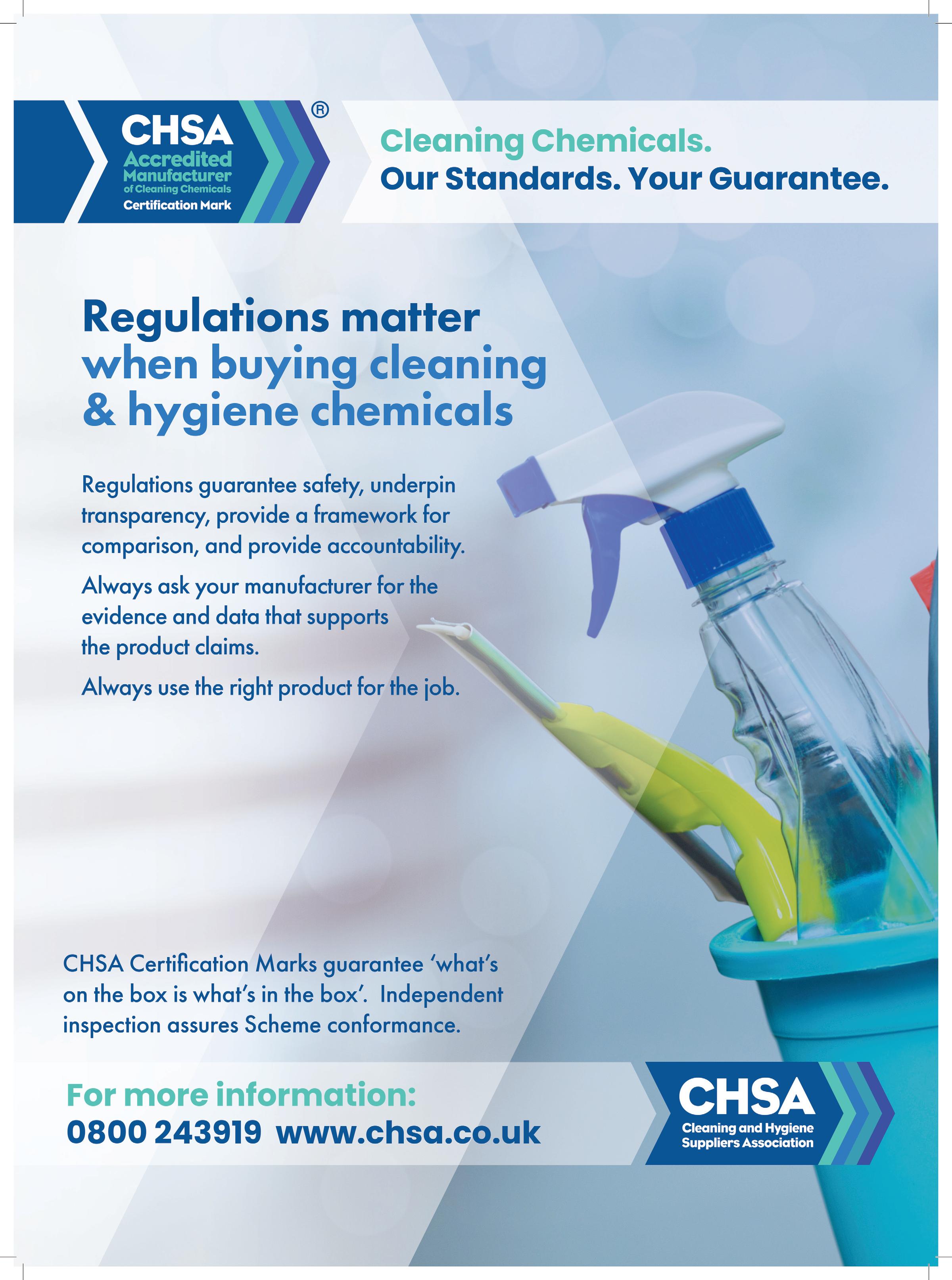
Ensuring strict hygiene standards in care homes is a complex yet essential task, particularly when it comes to laundry processes. With infection control a top priority, operators must comply with stringent regulations, including CQC guidelines and WRAS Category 5 requirements. The latter classifies care environments as high risk due to the potential contamination of water supplies, necessitating specialist equipment and backflow prevention measures to safeguard residents and staff. Failure to meet these standards can not only compromise infection control but also lead to regulatory penalties and reputational damage.
Laundry plays a critical role in infection prevention, yet many care homes still rely on domestic machines that are not fit for purpose. Unlike commercial alternatives, these machines do not achieve the necessary wash temperatures, cycle durations, or thermal disinfection standards required to remove harmful pathogens effectively. This not only increases infection risks but also puts facilities at risk of non-compliance. Furthermore, improper segregation of laundry—such as mixing soiled items with general loads—can accelerate the spread of infections, a concern that has only intensified in recent

years. Best practice guidance advises that care homes implement a clear separation of clean and contaminated laundry, supported by colour-coded processes to avoid cross-contamination.
Forbes Professional, an expert in commercial laundry solutions, advises care home operators to invest in WRAS-approved, commercial-grade washing machines and sluice systems designed specifically for healthcare environments. Miele’s hygiene-specific functionality, for example, ensures that thermal disinfection is achieved within every cycle, offering protection against bacteria and viruses. Additionally, hot water feeds, appropriate drainage, and compliance with Category 5 backflow prevention are crucial in preventing contamination. With evolving compliance requirements and the ever-present risk of infection outbreaks, care homes need to ensure that their laundry operations are fully up to standard. Forbes provides expert guidance and tailored site surveys to help care operators navigate these challenges, ensuring their facilities remain both compliant and safe for residents and staff alike.
We have recently set up a specialist facility in St. Neots, near Cambridge, in which we are going ahead with this specialist refurbishment programme. This programme involves purchasing existing machines, and replacing the parts on them, so that they are as good as new, whilst retaining the look and feel that existed before, but with a massively increased lifespan, and a warranty on the machines that’s as good as a warranty on a new machine to go with the refurbishment too.
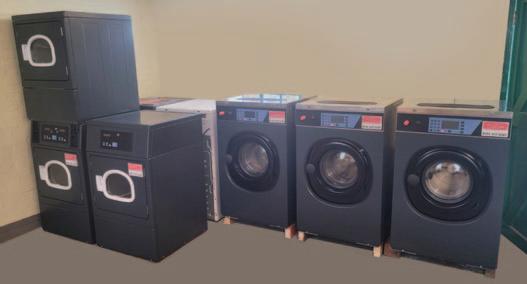
Our refurbishment programme in our specialist facility includes stripping down the machines, and giving them a check-over, to see which parts, if any, can be carried over the refurbishment. Lavamac will only carry over the highest-quality parts from the machine from pre to post
info@laundrytec.com www.lavamac.eu

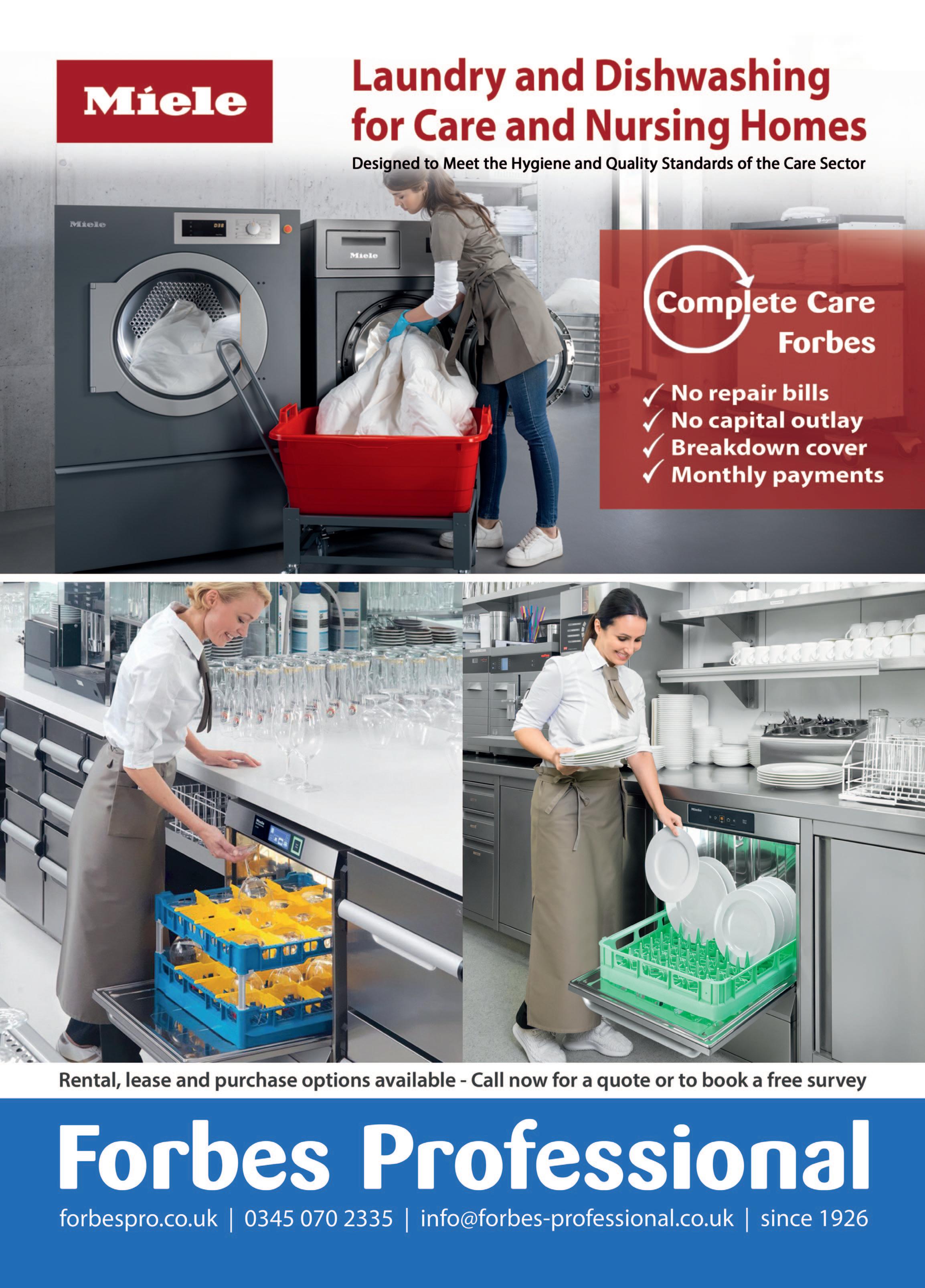
Pinpoint ltd, the UK’s leading provider of staff alarm systems to high-risk workplaces, has seen its P2 System installed in the UK’s first safe drug consumption facility, The Thistle.
The facility opened its doors on 13 January 2025 to provide a clean, safe space for the public to use drugs safely under clinical supervision. It also provides drug users with access to a wide range of treatment and support.
Pinpoint’s P2 Staff Attack System was chosen as the preferred staff safety alarm system to ensure the swift delivery of assistance in high-risk medical situations. Access to the Pinpoint P2 System ensures help can be summoned quickly providing staff with the peace of mind that help is forthcoming when they need it most.
Staff members at the Thistle will be given a personal alarm, or P2 PIT, at the start of each shift which can be activated if required with the simple press of a button.
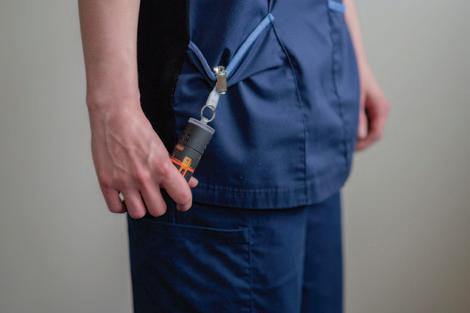
Once activated, the P2 PIT communicates with receivers located throughout the building, which in turn notifies display devices of the exact location and severity of the alarm call. This provides vital information to enable colleagues to respond appropriately.
Daniel Waring, CEO of Pinpoint Limited, said:
“Pinpoint is proud to be part of this UK first Safer Drug Consumption Facility. Having worked with The Hunter Street Health Centre, where The Thistle is based, since 2003, we are well aware of the challenges staff may face in their day-to-day duties.
“The P2 System, chosen for its precision, reliability and durability, will ensure staff can access a response when they need it most, allowing them to carry out their duties without fear and provide the highest quality of care.”
Visit http://pinpoint.ltd.uk for further information or see the advert on page 19.
Skopos Studio is a new design library idea from Skopos, enabling interior designers for Care to pick from a large range of designs to suit their project.
Categorised under different design types, such as ‘Botanical and floral, textures, stripes and checks’ this format provides choice for customers to select their end use and appropriate flame retardant base-cloth, and then select the designs and colourways which can bring their schemes to life.
The Studio collection provides a easy ‘go-to’ option containing design inspiration to create a Caring‘Home from Home’ experience. Skopos have a long history in print, with over 50 years of design experience which shines through in the Studio binder, with samples of all designs available via the

website.
Designs in Skopos Studio have been developed to work hand in hand with our beautiful accent collections and upholstery fabrics for a cross-section of projects. Choose from our fabric-only solution or a full-service option, including measure, product make-up (curtains, cushions, blinds and bed-throws) and installation. If you require something unique, our Bespoke service can offer custom colour options for a minimum meterage.
View the complete collection: www.skoposfabrics.com/studio-prints See the advert on page 4 for more information.
Chiltern Water & Environment was established in 1991 by Robert Hunt after gaining 25 years' experience as an operational and analytical scientist in the water supply industry. The company gained engineering and further management knowledge when David Hunt joined in 2012. Since then, other water industry professionals have added to the breadth of knowledge and experience within the company.
We have always provided high-quality consultancy, testing and remedial services in a professional but personable manner. Our steady growth has reflected our clients' trust in our services. Our current clients include large housing associations, pharmaceutical companies and facilities management companies, as well as individual landlords and small businesses. We ensure all our customers receive the same level of care and attention to detail.


Duty Holders of all commercial and public building premises are legally required to assess the risk from legionella to anyone using the water systems and put in place legionella control measures if required. The HSE has produced ACoP L8 and HSG274 as guidance for Duty Holders obligations.
We have clients throughout the South East, London and the Midlands, and carry out water tests nationally and internationally. We currently provide regular water sampling and testing for over 500 sites.
Tel: 01844 347678
Email: info@chilternwater.co.uk www.chilternwater.co.uk
See the advert on page 21 for more information.
Consort Claudgen’s innovation in the electric heating industry takes another leap forward by introducing Wi-Fi-enabled heaters to their low surface temperature (LST) range. These cutting-edge heaters offer unparalleled convenience and efficiency.
The heaters connect directly to Wi-Fi, enabling users to control heating through the digital control panel on the heater or via the Consort Connect app. With a comprehensive 7-day timer, which allows 24 individual heating periods per day, and features such as a lock function, open window detection, and custom automation, users can tailor their heating needs to their preferences.
Adding to the ease of use, users can view the energy consumption statistics of
all connected heaters, providing insights into usage patterns and potential savings. The LST heaters with Wi-Fi and occupancy sensors have a self-learning control ability. They utilise in-built occupancy sensors to detect and learn a user’s weekly presence in a room, creating an intuitive heating schedule. When the space is unoccupied, the heater conserves energy by switching to a setback temperature or frost protection mode.
BIM (Building Information Modelling) objects for the heaters are available for download from Consort’s website. 01646 692172 | sales@consortepl.com | www.consortepl.com
See the advert on page 5 for more information..
CareZips® Classic are patented, easy dressing unisex adaptive pants designed for older and disabled people suffering with problems associated with continence, mobility, mental function and cognition. Suitable for persons living in care institutions, receiving care at home or living independently at home, CareZips® Classic enable people to dress themselves or with assistance from carers.
CareZips® Classic feature patented 3-zipper system, which opens the front of the pants from the waist to the knees for quicker access during toileting, continence pads changes and personal hygiene. The forward positioning of the two side zippers lessens pressure on sensitive hip areas, helping to eliminate discomfort. The third zipper facilitates simple full frontal opening for faster more dignified diaper changes, catheter adjustments, personal cleansing and hygiene routines.
CareZips® Classic have many benefits for the older and disabled users and their carers:
• People dressing themselves enjoy the practical functionality and versatility of the
CareZips® Classic, all day comfort and easy garment care.
• People dependent on assisted dressing appreciate quick easy dressing process with less stress, embarrassment and greater dignity offered by CareZips® Classic.
• CareZips® Classic offer practical gains to the carers, helping them to provide better care, whilst reducing physical efforts and saving valuable time.
CareZips® Classic are unisex, available in 6 sizes and 3 practical colours (i.e. black, charcoal and navy). Tapered fit at the ankles gives a tidy appearance. Made from breathable moisture-wicking 4-way stretchy crease-free and easy-care durable fabric, CareZips® Classic are comfortable, practical and conveniently functional.
For more information, contact Win Health Medical Ltd - 01835 864866www.win-health.com
See the advert on page 3 for further information on Win Health’s product range.

At Little Islands, we understand the power of nostalgia in bringing comfort and joy to care home residents. Familiar surroundings, evocative sights, and meaningful sensory experiences can unlock treasured memories, sparking conversation and connection. For years, we have been crafting bespoke themed rooms and areas that do exactly that—transporting residents back to fond moments in their lives. However, bespoke designs often come at a premium, making them inaccessible for some care homes.
That’s why we have developed a range of standard themed packages, making it easier than ever for care homes to create high-quality, engaging spaces that foster reminiscence. Many homes have the capability to build themed areas themselves but sourcing appropriate and authentic content can be a challenge. Too often, well-intentioned efforts result in spaces that feel more like children’s play areas rather than immersive environments tailored for adults.

Our themed packages take the guesswork out of the process. Each package includes everything needed to transform a space, allowing your maintenance and care staff to set it up with ease. Most homes already have suitable furniture and decorative items to complement the theme, but we also offer optional extras to enhance and expand each setting as required.
Whether it’s a traditional British high street, a 1950s tearoom, or a classic seaside retreat, Little Islands’ thoughtfully designed themes ensure that your residents can enjoy a truly meaningful and immersive
Since our founding in 2010, Activities to Share has been dedicated to enhancing the lives of those in care by providing thoughtfully designed activity products. Our mission is to support activity coordinators in delivering uplifting, engaging experiences that foster connection, joy, and well-being.
We achieve this by listening closely to your feedback and evolving with your needs. Whether over the phone, via email, WhatsApp, or Live Chat on our website, our team is always ready to offer advice and help you find just the right products to bring your ideas to life.
While we embrace the convenience of technology to expand our resources and share knowledge, we remain firm believers in the irreplaceable power of sensory
experience. By stimulating multiple senses in a focused direction, these environments help trigger happy memories, encourage social interaction, and improve overall well-being.
With our themed packages, creating an engaging reminiscence space has never been easier or more affordable. Let’s bring back those cherished moments—together.
Our S.M.A.R.T. Room packages include:
Unique
• Traditional flame effect stove (For H&S the heat element is
• Double sided railway wall clock
• Themed Railway game and jigsaw puzzle
• Interior design Specification sheet
Contact us today on 01282 869802 or via hello@littleislands.org to discuss how we can help transform your care home.
See the advert on page 5 for more information.


engagement. That’s why we continue to make our Reminiscence Kits and Sensory Bags with real, tactile items that stimulate the senses. Some experiences—like popping bubbles for the splash, breathing in a familiar scent, or piecing together a puzzle with others—simply can’t be replicated on a screen. These sensory moments are invaluable in encouraging storytelling, sparking memories, and fostering conversation.
Our values remain rooted in this commitment to meaningful connection. We’re here to partner with you—the professionals on the front lines of care—to create a sense of structure, well-being, and fun for those who need it most.
Are you longing for your activity diary to be full? Look no further www.activitiestoshare.co.uk are here for you! See the advert on page 21 or: customers@activitiestoshare.co.uk
0117 966 6761 07900 6751 50
MOWOOT II – proven solution to chronic constipation without medication
Developed by a team of doctors and other healthcare professionals, MOWOOT II performs gentle abdominal massage to speed up intestinal passage in people experiencing chronic constipation.
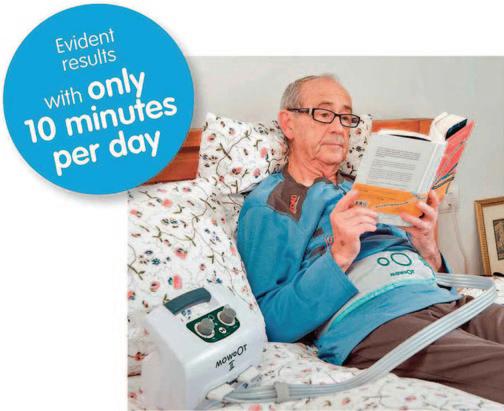
Clinically proven, safe and effective, relaxing and side-effects free, MOWOOT II Abdominal Massage Therapy System combats constipation and provides soothing relief to affected people. Easy to use and comfortable, the MOWOOT II treats and manages constipation in people with spinal cord injuries, multiple sclerosis sufferers, Parkinson’s Disease patients and people with constipation related to prescription medication. MOWOOT II also helps to relieve idiopathic constipation experienced by menopausal and post-
menopausal women and older and elderly people. In clinical studies MOWOOT II increased evacuation frequency, softened stools, improved regularity, reduced gasses, relieved bloating and eased off abdominal discomfort. 10 to 20 minutes daily of relaxing abdominal massage with MOWOOT II rapidly reduces symptoms of constipation.
Evident results are experienced only a few days after the first treatment. Regular abdominal massage with MOOWOOT II ensures lasting health benefits and better quality of life.
MOWOOT II – effective solution to chronic constipation for better quality of life!
Supplied by Win Health Medical Ltd - 01835 864866 - www.win-health.com See page 3 of this issue for other Win Health products. MOWOOT II for Constipation Free Life
REM have been manufacturing furniture for the Hair & Beauty Sector for over 100 years and are now considered to be one of the largest manufacturers in both the UK & Europe. Our exclusive designs and meticulous British workmanship offer customers a wide range of furniture for every conceivable Salon environment. Understanding the growing requirement for Care & Residential Home Salons the REM Design Team have produced the Pendle Care range for the small, compact Care Home Salon. This new range includes ergonomically designed, height adjustable styling chairs and

the Pendle Easy Wash Unit with two ceramic basins allowing frontwash with wheelchair access and a tilting backwash basin for the more able clientele. Should the need arise, our experienced Design Team can help you create a stimulating Salon environment for your clients. The REM Salon Interior Design Package which includes 2D and 3D AutoCad plans and visuals can be ordered for only £295 +VAT and is fully refundable on an order placement of £3000 or more. Contact us on 01282 619977 or email sales@rem.co.uk See the advert on page 17 for details.
The Oxford Up is an active manual stand aid, supporting assisted standing, seated transfers, and patient rehabilitation. Suitable for clients who require some assistance when standing but are able to participate and contribute effort to the process, the Up can also be deployed as a useful rehabilitation aid.
With a safe working load rating of 200kg (31st), the Up quickly disassembles into three separate components, significantly easing storage requirements and onward transportation. Reassembly takes a matter of seconds, and its ready for use again.

A large multi-point push handle aids manoeuvrability for the caregiver, and the foot push pad pro-
vides a means of generating forward momentum when moving a patient. Optimum positioning of the swing-away seat pads and knee support help ensure comfort for the patient. Adjustable leg opening allows closer access around furniture, promoting improved patient positioning and general ease of use. Additionally, the enclosed footplate ensures no accidental foot or toe entrapment associated with mechanical components.
Where additional seated support is required, the Oxford Deluxe Standing sling (With Clips) is fully compatible with the Up and available in three standard sizes: small, medium, and large. For more information including how and where to purchase, please contact the Oxford customer services team on 0344 811 1158 send an email to info@joerns.co.uk or visit our website at www.joerns.co.uk
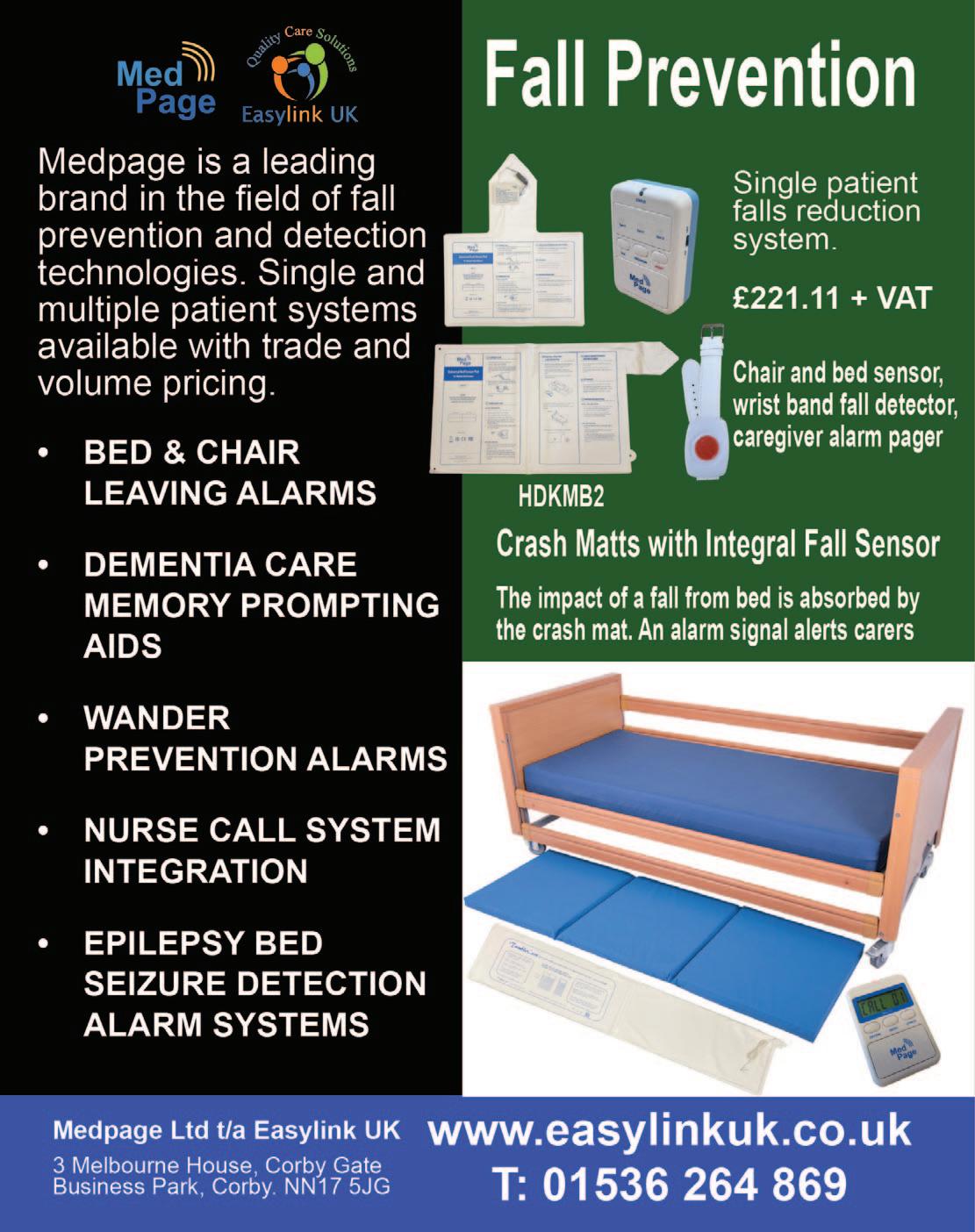



In the post pandemic world, we have all seen the effects of supply chain problems with the invasion of Ukraine and other alarming global factors, ever increasing costs of living and other more local issues which have driven up the rate of inflation over the last few years. The impact of this meant that most manufacturers of electronic products had to increase their prices as costs spiralled. This, of course, has impacted the end user. The most dramatic impact has been on the Care Industry. An industry that has lacked the support it desperately needs in these trying times.
Courtney Thorne, at the same time, took a strategic decision to take a close look at our core products, right down to component level, the objective being to make us less vulnerable to future global supply chain issues, and to reduce the cost of each product with the amin of ensuring that we deliver the same high quality product at a cost protected price. We had to ensure that this would happen without jeopardising the superb lev-

els of support we provide to our valued customer base.
This ground up review involved all departments from Research and Development right through to the Field Service team (and everything in-between). This in-depth collaboration took time as we had to ensure that each and every element was refined, perfected and tested to our (and our customers) rigorous requirements.
Whilst many organisations have limited-time or end of product line offers, we are very pleased to announce a price reduction on our core Connect and Connect Health Nurse Call system ranges. With flexible terms, full integration with Care Apps, celebrated service delivery and the most reliable and robust solution now at a new lower price, there has never been a better time to talk to us about a new nurse call system.
For more information email us at: info@c-t.co.uk or see the advert on this page.
Blaucomm’s Nurse Call Messaging Service (NMS) is the market leading solution to remove the dependency on noisy nurse call panels and pagers, through its intelligent software, which delivers the alerts straight to the care staff who need them.
Care homes are rapidly introducing smartphones for digital care planning and eMarnow, the same devices can be used to receive the nurse call alerts they need for the residents under their care.
Furthermore, Blaucomm NMS is deeply linked into Person Centred Software MCM, so call bell data is linked straight to care plans. This unlocks a huge benefit to care homes to enhance the staff performance with how they accept and respond to residents, which ultimately promotes better response times and visibility for management to audit their performance.

The best part is that Blaucomm NMS links into your existing nurse call system - we work with all major
brands such as Aidcall, ARM, Courtney Thorne, C-TEC, ENS, Intercall, Medicare, SAS and TeleAlarm.
Care operators are constantly recognising Blaucomm NMS for its reliability and dependability to their care operations, which is why we’ve been chosen time and time again over other solutions.
Head of IT Trudi Harrow at WCS Care had this to say about Blaucomm NMS:
“We find Blaucomm is a genuinely fantastic company with a reliable product. "We would highly recommend this to anybody who wants to replace expensive pagers and silence those annoyingly loud nurse call screens!”
To find out more about Blaucomm NMS, visit
www.blaucomm.co.uk/healthcare
See the advert page 5 for more details.
Medpage Limited has collaborated with a leading UK manufacturer of crash mats to deliver a cost-effective tool for falls management strategies. The inclusion of the new TumbleCare full-length pressure mat sensor ensures that should a patient tumble out of bed, an alarm signal is generated to alert care staff to the incident, resulting in a recordable improvement to patient safety and service.
Crash mats act as a protective barrier, absorbing the impact of a fall and reducing the risk of serious injuries when a person tumbles out of bed. Beneficial for individuals who are at high risk of falling, such as older adults, patients recovering from surgery, or those with neurological conditions such as epilepsy.

Falls can pose significant risks, especially in healthcare settings and senior care facilities. Every year, thousands of people suffer injuries due to falls from beds and other furniture. To prevent these accidents and ensure the safety of patients and residents, it is essential to implement effective falls and safety management strategies.
Further details can be obtained by telephoning 01536 264 869 or emailing sales@easylinkuk.co.uk
See the advert on page 2 for details.

Cyber security is an increasing concern in social care, with data breaches, phishing scams, and cyber attacks putting sensitive information and essential services at risk. However, learning about cyber security can often feel overwhelming, full of jargon, and difficult to apply to everyday situations. That’s where the Digital Care Hub’s new Cyber Game comes in—an engaging, interactive way for adult social care providers to learn vital cyber security skills.
Learning doesn’t have to be dull. In social care, where training is essential but time is scarce, gamification—using game-like elements such as quizzes, rewards, and interactive challenges—makes learning more engaging and memorable. It provides a safe space to learn and make mistakes, increasing engagement, motivation, and knowledge retention. Gamification also allows for instant feedback and supports long-term behaviour change, making it an effective tool for cyber security training.
THE FIRST-EVER CYBER GAME FOR SOCIAL CARE
The Digital Care Hub has launched the first-ever Cyber Game designed specifically for adult social care providers. It offers a fun and practical way to learn about cyber security and data protection, helping care managers, care workers, and other staff members develop the skills they need to keep their organisation safe.
The Cyber Game takes players through real-world scenarios relevant

to social care settings, making it easier to recognise and respond to cyber risks in a safe environment. Whether it’s identifying a phishing email, ensuring secure data sharing, or responding to a cyber incident, players gain hands-on experience that translates directly to their work environment.
One of the biggest challenges in cyber security training is making it relatable. The Cyber Game brings cyber risks to life through realistic characters and workplace situations. Players can take on the role of a registered manager, a data protection lead, or a care worker, each facing different cyber threats.
Each scenario is based on real cyber incidents that have affected
social care providers. The goal is to manage the crisis effectively—containing the damage, notifying the right people, and implementing steps to prevent future incidents. Decisions impact security, time, and cost, requiring players to balance risk and consequences.
WHY GAMIFY CYBER SECURITY TRAINING?
Daniel O’Shaughnessy, from the Digital Care Hub, explains:
“We created the Cyber Game to make cyber security training more accessible and engaging. Gamification encourages active participation and helps staff retain information better, making learning feel rewarding and practical.”
WHAT CARE STAFF SAY
Care staff who tested the game found the scenarios helpful and realistic:
“These are good scenarios – typical and indicative of what may occur and give people an idea of what they need to be thinking about.”
Through interactive decision-making, players experience the consequences of their choices, reinforcing key lessons in a way that traditional training cannot.
TRY THE CYBER GAME TODAY!
The Cyber Game is available online, completely free to play. It’s a great way for care providers to improve their cyber security awareness in an engaging and practical way.
Play the game online at: www.digitalcarehub.co.uk/cyber-game
The delivery of safe care is the paramount responsibility of social care providers. Central to achieving this is the governance framework adopted by service providers. And at the core of this framework are policies and procedures. These enable the provider to comply – and evidence compliance –with relevant legislation and regulations, as well as facilitating best practices, supporting business needs, and assisting in recognising and managing risks.
Providers have a legal duty of care to the people they employ. Policies and procedures should provide clear guidelines to staff on how the organisation operates, as well as informing them of best practices and processes to be followed.

Policies should be reviewed annually as a minimum to ensure they are still fit for purpose and align with legal and regulatory requirements. They should be reviewed not only by
employees of the business, but also by experts in various subject matters (e.g., infection control or medicines management).
For many small- to medium-sized providers, there may not be the in-house skills, knowledge, and experience to complete such a robust annual review. Many choose instead to purchase their policies and procedures from a reputable provider like W&P Compliance & Training, who will also complete reviews and ensure their policies and procedures remain up to date. This way a provider not only ensures they remain compliant; they also benefit from best practice policies and procedures that provide a solid foundation for safe working practices and – ultimately – protect and support service users and staff. Ben Erskine – Director at W&P Compliance & Training www.wandptraining.co.uk | Tel: 01305 767104 See the advert on page 2 for further information.

Training care home staff is vital for delivering high-quality care, especially when managing complex resident needs such as dementia, frailty, and mental health challenges. However, traditional methods often fall short in engaging staff, leaving critical gaps in understanding and preparedness. Innovative approaches, such as game-based learning and peer-to-peer collaboration, are revolutionising training, particularly in addressing the ethical and legal challenges of restrictive practices.
Restrictive practices—measures that limit an individual’s freedom—are sometimes necessary to ensure safety. However, they must be applied with great care, adhering to legal frameworks and ethical guidelines to protect residents’ dignity. A groundbreaking digital training resource, co-designed by Queen’s University Belfast and Focus Games, exemplifies this innovation. The resource uses interactive, expert-driven content to help staff navigate restrictive practices responsibly and effectively.
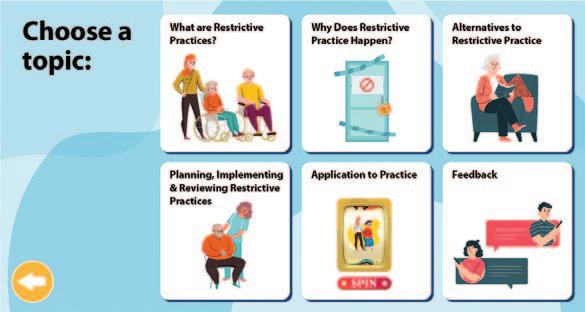
Game-based learning plays a central role, transforming topics like restrictive practices into engaging,
real-world scenarios. Simulations allow staff to explore ethical dilemmas, practice decision-making, and test alternative solutions in a safe, low-pressure environment. This approach enhances critical thinking, teamwork, and retention of essential knowledge.
Peer-to-peer learning further strengthens the training by encouraging staff to share experiences and insights, fostering collaboration and practical problem-solving. This creates a dynamic learning environment where staff feel supported and empowered to deliver compassionate care.
By integrating these modern approaches, care homes can elevate training into a meaningful experience, equipping staff to balance safety with residents’ autonomy and dignity. At Focus Games, we are proud to offer tools designed to empower care home teams through innovative training. Visit www.FocusGames.com or email info@focusgames.com to learn more about our Restrictive Practice resource and how it can enhance care home outcomes for residents and staff alike. For further information see the advert on the front of this issue
By Chris Sparling, Senior Director,

In the care industry, reputation is everything. Choosing a care facility or in-home provider is a deeply personal decision based on location, budget and individual needs. It’s also based on trust. Families rely on providers to deliver quality care, so a strong reputation is essential. In the UK, adult care homes are rated by official bodies like the Care Quality Commission (CQC) and by residents and their families. However, as the CQC undergoes reform, personal feedback and reviews have become critical in offering an unfiltered view of the resident experience.
Selecting a care facility or in-home provider is a deeply personal decision based on trust, location, budget, and individual needs. Families rely on providers to deliver quality care, so a strong reputation is essential.
EMERGING TRENDS IN THE CARE INDUSTRY
The growing reliance on authentic reviews offers facilities an opportunity to set themselves apart and offer the insights prospective patients seek. Yet, a recent research report reveals that in-home care providers average just nine reviews annually, with the top 20% receiving fourteen reviews. This indicates a gap in review engagement that providers can turn into an opportunity.
The difference between a trusted care facility and a questionable
one often comes down to how effectively a provider manages its reputation. Managing various listings and online reviews can weigh heavy on a facility with stretched resources.
ENCOURAGING AUTHENTIC REVIEWS
The true measure of reputation comes from the experiences shared by current and former residents and their families. Proactively soliciting feedback is powerful - 22% of the public report they leave reviews when asked. A steady flow of fresh feedback prevents outdated sentiment from impacting perception. In a market with such high demand for care home places, this could have serious consequences.
Reviews need to be managed and cultivated as part of continuous improvement within customer service, as they’re one of the primary indicators of quality.
BUILDING TRUST WITHIN THE COMMUNITY
It is important that reviews are managed transparently, so providers can build trust with their current and future patients. The same report found that top-performing care providers respond to over 80% of reviews, while the industry average lags at 68%. However, these numbers drop significantly for negative reviews, which is a missed opportunity.
Acknowledging both positive and negative feedback is crucial for building credibility. Doing this will reassure prospects that a facility is open to listening and proactively addressing concerns. Filtering reviews to exclude the negative ones presents an unrealistic image and will deter prospects evaluating whether a facility is the right one for them.
PROMOTING RESIDENT AND FAMILY SATISFACTION
Responding to online feedback is an extension of customer service quality, and many prospective patients seek this level of engagement. By providing thoughtful and timely responses, care providers can
at
increase customer satisfaction and strengthen their overall reputation.
Facilities that listen to residents and their families, and take proactive steps see improved satisfaction and stronger relationships with those they serve. Addressing negative reviews can even turn challenges into positive outcomes.
Industry leading providers are already leveraging technology to maximise the impact of online reviews. Many automate review responses, ensuring that every reviewer feels respected and appreciated. This approach also eases the pressure on internal resources by streamlining the feedback response process.
Moreover, facilities can use data from reviews to identify strengths and weaknesses, addressing areas of concern proactively. For those with smaller budgets, data-backed insights help allocate funds effectively, so that the focus remains on what matters most to residents and families. Whether that’s staff excellence or a provider’s welcoming environment, marketers should highlight these strengths in their promotional materials, and use customer feedback as a way to validate them.
Care providers should embody their commitment to people-centred service in their online interactions, regardless of whether feedback is positive or negative. Reputation management is a crucial part of this commitment, as it ensures that patients feel valued and heard, while offering sought-after insights to those trying to make big decisions.
With the right tools and strategies in place, care providers can harness the power of online reviews to build trust, improve satisfaction, and build a lasting reputation that resonates with both current and future residents.

In an age where data breaches and cyberattacks are increasingly common, cybersecurity is a critical priority for all organisations, including nonprofits and charities. Protecting sensitive data—such as donor records and beneficiary details—is a round-the-clock responsibility that demands both organisation and vigilance. This is where Security Operations Centre (SOC) systems come into play, offering a powerful way to strengthen your defences, even on a tight budget. WHAT IS A SOC SYSTEM?
A Security Operations Centre (SOC) is a centralised framework—often a combination of software, tools, and processes—designed to monitor, protect, and manage an organisation’s information systems and networks against cyber threats. Whether through in-house teams or external ser-
vices, a SOC uses advanced technologies to detect, analyse, respond to, and prevent cybersecurity incidents in real-time. Why Are SOC Systems Important?
The consequences of a successful cyberattack can be catastrophic, from financial losses to reputational damage, and the risks are growing each year. Cybersecurity is no longer a one-off task but a complex, ongoing effort requiring expertise, proactive monitoring, and rapid response capabilities. For nonprofits and charities, where budgets are often stretched thin, a SOC system offers an efficient solution. It provides 24/7 network monitoring, identifies vulnerabilities before they’re exploited, and helps mitigate threats swiftly, reducing the likelihood of a breach.
BENEFITS OF SOC SYSTEMS FOR NONPROFITS AND CHARITIES
1. Proactive Threat Detection and Response: Equipped with sophisticated tools, SOCs can spot potential risks early and respond immediately, minimising damage.
2. Compliance Support: By monitoring data protection practices, SOC systems help charities meet standards like GDPR or CQC requirements, avoiding costly penalties.
3. Unified Security Management: Many SOC solutions integrate with popular antivirus and network security tools, letting you oversee everything from a single platform.
4. Scalable for All Sizes: Whether your organisation is large or small, SOC systems can adapt to your needs.
SES SOC FREE SYSTEM OFFER
SES Computers, with over 20 years of success in the healthcare sector, believes it’s time to give back. We’re excited to announce a unique opportunity for UK charities and nonprofits: free access to our Security Operations Centre (SOC) services.
No
By Philip Douglas, founder and CEO of Compleat Software

As the CEO of Compleat Software, I have worked closely with care providers and understand the challenges they face, as well as the growing demand for AIdriven solutions reshaping the sector. With rising costs, workforce shortages, and increasing demand for quality care, AI has moved beyond being a trend; it is now essential for sustainability and efficiency.
Recognising this urgency, the UK government has launched initiatives to accelerate AI adoption in healthcare and care homes. The recently announced AI Opportunities Action Plan aims to integrate AI across public services, including the NHS, modernising patient care and streamlining operations. Investments in AI-driven diagnostics, workforce planning, and predictive analytics are already helping to improve health outcomes while reducing pressure on frontline staff.
However, care providers also face financial pressures due to policy changes, such as the National Insurance rise, which significantly impacts workforce costs and operational budgets. The increased employer contributions make it more expensive to recruit and retain staff, worsening an already strained sector. While AI can help mitigate some of these cost pressures through automation and efficiency gains, the sector needs more strategic financial support from the government to ensure AI adoption remains viable.
The recent National Insurance rise has placed additional financial strain on the care sector, which is already grappling with underfunding and workforce shortages. Care providers must now contribute more to employer National Insurance payments, increasing staffing costs at a time when recruitment and retention are critical challenges. This policy change directly affects operational budgets, forcing care homes and domiciliary care services to reallocate resources from patient care to cover additional tax burdens.
AI-driven automation offers a potential solution by reducing administrative workloads and optimising workforce planning. AI-powered HR management tools can help forecast staffing needs and prevent over-reliance on expensive agency workers. Similarly, AI-driven procurement and financial management systems can identify cost-saving opportunities, making it easier for care providers to navigate these financial pressures while maintaining service quality.
Care organisations have long struggled with manual processes that consume valuable time and resources. Whether managing procurement, staffing, or patient care, outdated systems often lead to inefficiencies and high costs. AI is now enabling care professionals to focus on what matters
most, delivering high-quality care. By automating routine tasks, AI improves efficiency, allowing staff to dedicate more time to patient wellbeing rather than administrative burdens.
NHS England Abolition – What This Means for Healthcare Procurement
Keir Starmer’s proposed abolition of NHS England signals a major shift in the structure of healthcare delivery and procurement. While details remain under discussion, the potential restructuring could have significant implications for how care providers source medical supplies, manage contracts, and integrate AI-driven solutions into their operations. A decentralised approach to procurement could offer more flexibility but may also lead to inconsistencies in funding and support for AI adoption across different regions.
For care providers, this change underscores the importance of AI-driven procurement systems that can quickly adapt to evolving regulations and supply chain challenges. AI-powered platforms can streamline vendor management, track spending trends, and ensure compliance with new procurement policies, helping care organisations navigate this transition more effectively.
AI FOR WORKFORCE PLANNING AND HR MANAGEMENT
Staff shortages and high turnover rates have long been challenges in healthcare. AI-powered predictive analytics are now assisting HR teams in anticipating workforce needs, reducing staff turnover, and improving job satisfaction. AI-driven tools also streamline shift planning, ensuring optimal staffing levels and reducing the strain on care professionals. Virtual assistants are further relieving administrative burdens by handling routine HR inquiries, allowing staff to focus on more meaningful work.
ENHANCING PATIENT CARE THROUGH AI
Beyond finance, AI is transforming patient care. Electronic health records (EHRs) powered by AI can detect health risks early and recommend proactive interventions. By analysing patient data in real time, healthcare professionals can make faster, more informed decisions, reducing hospital readmissions and improving patient outcomes. AI-driven care management tools allow care facilities to maintain high service levels while optimising costs.
AI-POWERED VIRTUAL ASSISTANTS AND PATIENT ENGAGEMENT
AI-powered virtual assistants are also improving patient engagement. These tools help with medication reminders, appointment scheduling, and answering health-related queries, providing round-the-clock support. By handling these routine interactions, AI reduces the strain on caregivers, enabling them to focus on more complex patient needs. The result is a
more efficient system where patients receive timely assistance while care professionals are freed from repetitive administrative tasks.
PREDICTIVE ANALYTICS IN PREVENTATIVE CARE
One of the most exciting AI applications in healthcare is predictive analytics for preventative care. AI can analyse vast amounts of patient data to identify individuals at risk of developing serious health conditions. Early intervention helps reduce hospitalisation rates and improves long-term health outcomes. Some care facilities have already prevented emergency hospital visits by detecting subtle behavioural changes that might otherwise go unnoticed. This proactive approach not only saves lives but also alleviates financial pressure on healthcare providers.
AI FOR INDEPENDENT LIVING AND REMOTE MONITORING
The UK government is also investing in AI-driven technology to support independent living. AI-powered sensors can monitor daily activities in care homes, identifying unusual patterns and alerting caregivers when needed. This technology helps vulnerable individuals live independently for longer while reducing the burden on residential care services.
AI has also revolutionised remote monitoring and telemedicine. Wearable health devices now use AI to track patient vitals in real time, allowing healthcare professionals to identify potential health concerns before they escalate. This proactive approach is particularly valuable for elderly patients and those with chronic conditions, reducing hospital visits and improving overall patient wellbeing.
The future of AI in healthcare is vast, with continuous advancements reshaping the sector. From robotic caregivers assisting with daily tasks to AI-driven mental health support systems, innovation is driving a smarter, more efficient, and compassionate care model. Organisations that embrace AI today will be at the forefront of this transformation, positioning themselves as leaders in the evolving care landscape.
For care providers considering AI adoption, now is the time to act. AI’s ability to optimise processes and elevate care quality is already evident, and as technology advances, it will become an integral part of delivering high-quality care in an increasingly demanding world.
By leveraging AI, we are not just reducing costs; we are enabling a future where care professionals can focus on what truly matters: improving the lives of those they serve. The care sector is evolving rapidly, and AI is at the heart of this transformation. Those who embrace it now will shape the future of healthcare for generations to come.



The social care sector is evolving at an unprecedented pace, driven by increasing demand, tightened budgets, and the need to deliver exceptional care outcomes. At the heart of this shift lies digital transformation—a holistic approach to overhauling care operations, processes, and culture through the integration of modern technologies.
Far from simply replacing manual tasks, digital transformation reimagines how organisations operate. Tools like Digital Social Care Records (DSCRs) represent just the beginning. By adopting interoperable systems and cloud-based solutions, care providers can achieve seamless coordination across departments, optimise resource allocation, and ensure high-quality care. Processes such as care planning, rostering, compliance reporting, and data management become more efficient, freeing up teams to focus on providing person-centred care.
Digital solutions also offer significant benefits. Faster service delivery reduced administrative burdens, and more informed decision-making results in better care experiences for service users and care providers alike. For instance, interoperability enables real-time data sharing across platforms, reducing errors while providing a unified view of the organisation’s operations. This empowers leadership to make critical decisions backed by accurate, holistic insights. Additionally, tools like single sign-on (SSO) and multi-factor authentication bolster security, ensuring confidential data remains protected while reducing day-to-day inefficiencies for users.
PASS supports over 1,000 care providers every day, giving them access to market leading care management tools hand in hand with unlimited 24/7/365 support from our dedicated and friendly PASS team.

Assured by NHS Transformation Directorate, PASS provides a secure platform that allows you to plan, record and evidence the care you deliver. The only assured solution built specifically for the home care sector, it provides comprehensive real-time functionality and allows you to share progress against outcomes with customisable, exportable reports.
CARE PLANNING AND ROSTERING FROM A SINGLE PLATFORM

For social care providers, the move toward digitalisation represents an investment in long-term sustainability. Enhanced efficiency helps reduce operational costs, allowing resources to be reinvested in vital areas such as workforce development or service user engagement. Standardised digital frameworks also simplify the complexities of acquiring new services or locations, ensuring continuity of care during periods of growth. Choosing a digital partner who understands the complexities of care is essential to navigating this transformation successfully and tailoring solutions to the unique needs of the sector.
However, the path to digital transformation requires a clear roadmap. Providers must assess their needs, define a vision, and secure stakeholder buy-in. Selecting the right software and delivering effective training is equally critical to ensuring a smooth transition. Continuous monitoring and adjustment allow providers to refine their approach, fostering a culture of improvement and resilience.
By adopting integrated intuitive software solutions, social care providers can not only stay ahead of industry challenges but also lead the way in delivering exceptional, sustainable services. Digital transformation may not solve every challenge, but its potential to enhance care quality, operational efficiency, and financial health is undeniable.
Download our guide to digital transformation with the QR code.
To meet the wider needs of the PASS community All-in-one PASS has recently been launched , bringing advanced rostering functionality to our established digital care planning platform. As a result advanced staff scheduling, payroll and invoicing functionality is now seamlessly linked with care planning and reporting, reducing the technical complexity, risk and overhead associated with integrating two separate systems.
As a result, PASS now provides an all-in-one suite of digital care management tools, available from a single platform, designed to:
Save you time
Increase the efficiency of your teams
• Improve the quality of care
Deliver better outcomes

Our commitment to the continual evolution of PASS is further illustrated by the addition of GP Connect. The first product of its type to offer this feature, PASS is still one of only a handful of digital care
management solutions to have completed this NHS Digital integration, and is the only one offering it to the home care market.
PASS GP Connect provides authorised social care staff with realtime access to their client’s GP records. It makes medical information available when and where it is needed, leading to improvements in both care safety and outcomes:
Visibility of allergies, vaccinations and medications, especially useful for clients unable to reliably share their personal information
Using medical information to inform care planning
Ensuring that the right medication is delivered to the right person in the timeliest manner. In one case, this allowed the administration of antibiotics on a Friday evening, aiding the service user’s swift recovery from infection
Available to all PASS users at no additional cost, PASS GP Connect is significantly more efficient than waiting for a GP response. It’s also a positive step forward on the path to the DHSC’s goal for widespread digitally enabled care and is in full alignment with their ambition for joined up care for everyone.
Get in touch: www.everylifetechnologies.com hello@everylifetechnologies.com





By Fozia Iqbal, Senior Business Immigration Solicitor at

Reports of exploitation, including unfair wages and poor working conditions, have drawn increased government attention to the treatment of overseas workers in the care sector. With a critical staff shortage, many businesses depend on international recruitment to fill vacancies, adding to concerns about worker welfare.
The Home Office has intensified its crackdown on non-compliant employers, with severe consequences for those who fail to meet legal and ethical obligations. Compliance with immigration and employment laws is no longer just an administrative requirement but an essential strategy for protecting business operations, reputations, and, most importantly, the wellbeing of workers.
To hire overseas care workers legally, care business owners must navigate a complex regulatory framework. They must obtain a sponsor licence issued by the Home Office, through which they can sponsor overseas health and care workers for a Skilled Worker visa, which is the primary route for recruitment, but this visa comes with strict sponsorship obligations. Employers must make sure that all hired workers have valid visas and are working in compliance with their visa restrictions and their sponsorship. Employers would need to implement correct right to work check policies and ensure they are meeting minimum salary requirements, can provide work that meets the contractual hours of work offered, and the employees are undertaking duties which fall strictly within the role for which they have been sponsored.
Additionally, all employers must ensure that their employees’ employment conditions align with legal requirements, for instance, providing safe working environments, adequate training, and following proper recruitment procedures. Fundamentally, overseas workers must receive their full rights and entitlements such as fair pay, breaks and leave, with no discrimination. Any deviation from these standards can place a business at significant risk.
THE GOVERNMENT’S CRACKDOWN ON NON-COMPLIANCE
The UK government is taking decisive action against care providers who fail to protect overseas staff. Increased inspections and audits are being carried out, with penalties ranging from significant fines to licence revocations and outright business closures. Employers found guilty of exploitation or modern slavery
offences face criminal prosecution, and businesses that lose their sponsor licences will lose their sponsored workers and be unable to hire overseas staff in the future.
In addition to heightened inspections, the Home Office is working closely with other regulatory bodies to share intelligence and data on non-compliant practices. This collaboration enhances the government’s ability to detect irregularities and enforce penalties swiftly, ensuring that any rogue employer faces immediate consequences. Such coordinated efforts not only deter potential offenders but also reassure compliant businesses that the sector is being rigorously monitored.
This increased enforcement underscores the necessity for care home owners to maintain high standards of employment practice. Failing to comply with legal obligations does not only jeopardise individual businesses but also tarnishes the reputation of the sector as a whole.
ETHICAL EMPLOYMENT:
Beyond legal obligations, treating overseas workers ethically is a crucial element of running a successful business. Providing fair pay, ensuring reasonable working hours, and fostering a safe and supportive environment contribute to higher job satisfaction and better staff retention. In an industry where continuity of care is essential, a stable and motivated workforce is invaluable.
Ethical employment also enhances a business’s reputation. Care businesses known for fair treatment of staff find it easier to attract both workers and clients. By proactively adopting fair employment practices, organisations safeguard their operations from legal risks and cultivate a more committed and engaged workforce.
To protect your business and your staff, you should regularly review your employment practices. By conducting internal audits, training staff on compliance obligations, and seeking professional legal guidance, you can help ensure ongoing adherence to the law. Being proactive in compliance not only mitigates legal and financial risks but also encourages a positive workplace culture.
Looking to the future, it is vital for care providers to establish a culture of continuous improvement in compliance. Regular training sessions, clear communication of legal updates, and robust internal controls can help your business stay ahead of regulatory changes. Embracing technology to monitor recruitment and employment processes further supports transparency and accountability, ultimately benefiting both your staff and the reputation of your business.
As the government continues its strict stance on non-compliance, you should take immediate action to ensure your recruitment and employment processes align with legal and ethical standards. Now is the time to assess your business’s current practices, implement necessary improvements, and secure the future of your business by treating overseas workers with the fairness and dignity they deserve.
By Katarina Morgan, Associate Solicitor
at Taylor Walton Solicitors (www.taylorwalton.co.uk)

An issue which frequently arises for care home operators is when they need to make a financial claim against the estate of a deceased resident for unpaid or outstanding fees. This can be complicated if the former resident was married but most of their assets are tied up in the marital home which their spouse still lives in. Another common situation is where there are insufficient funds left in the estate and the former resident would have qualified for Local Authority funding had they survived.
To manage these situations effectively, it is best practice to maintain good records of the contractual terms agreed, of fees due and invoices raised and what is outstanding. This helps prevent parties disputing the quantity of the bills, or where executors were unaware of what had been agreed.
It is hoped the care home operator has a good rapport with the deceased’s family so they can sensitively approach them with the outstanding invoices and ask them to be included as debts of the Estate. This helps probate practitioners and will assist with debt recovery when the Grant of probate has been obtained. Thankfully in recent months it is now a faster process following the delays which built up following the Covid pandemic. If the deceased owned a property (either under marriage or not), then there may be a right to pursue the debt against their asset. It would need to be considered if they died with a Will, whether a life interest trust was created under that Will (i.e. if people are still living in the house), and how the property was
owned and how much of it was owned by the deceased, whether there is any outstanding mortgage or equity release scheme in place. It is for this reason why good contractual terms need to be set out clearly and what happens in these circumstances.
If there are insufficient funds in the Estate, then the Estate will be insolvent. This means that the debts will be paid in a certain order:
o Secured creditors: mortgages or secured loans
o Funeral expenses: reasonable and proportionate to the size of the Estate
o Testamentary expenses: administrative costs
o Preferred and preferential debts: employee wages for example (not likely to apply)
o Unsecured creditors: care home fees, bank loans, other debts
o Interest on unsecured loans
o Deferred debts: informal loans between family members
If Local Authority funding may have been available, then the administrator of the deceased’s Estate (executor or administrator) may be able to make a retrospective claim. They will have to apply to the Integrated Care Board (ICB) which is the NHS body that assesses eligibility for NHS Continuing Healthcare funding where there is a need. That person will need to contact the ICB for guidance on how to deal with previously unassessed periods of care. It is likely that this may take a number of weeks if not months to be resolved and it would likely to be challenged given the universal squeeze on public budgets. Prevention of debts building up is always the best option, but it is not always avoidable. Ultimately having good, clear contractual terms which explain what has been agreed in terms of fees and when they can expect to be recovered and how is essential for every care home operator. Each case will of course depend on its
On-Demand Pay is now offered by almost a third of care providers in the UK. But why?
For many employees, payday isn’t just about receiving their earnings –it’s about catching up. Covering overdue bills, managing unexpected expenses, and paying off debts such as credit cards. With nearly 1 in 4 workers unable to pay an unexpected bill of just £100, financial stress is a growing challenge directly impacting businesses and their employees alike.
On-Demand Pay, also known as Earned Wage Access, allows staff to access some of their earned wages before payday. All without impacting their employer’s cashflow or payroll processes.

In addition to supporting staff, there are many tangible business benefits for care providers who opt to introduce this fast-growing employee benefit. Notably, by rewarding overtime more quickly you incentivise uptake; significantly lowering agency spending as in-house staff are motivated to cover more of the shift rota themselves.
HELPING EMPLOYERS HELP THEIR EMPLOYEES
Level are On-Demand Pay specialists for the care sector, working with the likes of Agincare, Home
Instead, Bluebird, Hollybank Trust and Bracebridge Care Group, to name a few. We understand the unique
challenges of the sector – from managing high staff turnover, to the nuances of franchising and dealing with agencies.
“We are really loving Level so far and our staff have nothing but praise for it. It’s also helping to cover our rotas as staff now have instant access to any overtime they may do rather than having to wait” – Bluebird Care. On-Demand Pay helps employees manage their finances without resorting to costly overdrafts, credit cards, or payday loans. For example, one of Agincare’s carers said that:
“Things have been a struggle as I'm a single parent. When I had a car issue it became very useful to be able to access my pay early.” SEAMLESS INTEGRATION WITH PAYROLL & WORKFORCE
Level’s On-Demand Pay is a market-leading solution. With existing integrations with many of the UK’s leading HR, rota and payroll systems, Level can offer a fully automated solution. Integrations with software like Sona, IRIS, Birdie, SAP, Humanforce and Planday make the setup and go-live process quick, simple and easy. This means you can offer staff flexibility without adding an extra administrative burden on your payroll team. For further information, visit www.levelft.com
"23 years, operating 4 Devon Nursing homes, has been pretty tough, as anyone in social care, knows, only too well. And if it was hard already, after 2024 budget, it's just got harder.

Anyway, at heart, I am just customer of Eden Alternative, and it was a stroke of luck to come across this whilst on holiday in New Zealand in 2009. It started in USA in 1994 and now runs in 22 countries.
The fact that I am now involved with this not-for-profit organisation (in the UK area) came about when one of the 2 main UK directors died suddenly just before Covid. But it's something I have run with for 11 years to help make 'vision' a reality, not a struggle. So, being both a customer and helping the admin seems quite natural.
It is a modern philosophy of care, but moreover, it's a pro-
gramme that is straight forward, tried and tested for 30 years and really works.
Its member care organisations generally become trainers for their own teams, and run it themselves. The programme is run in person over 2-3 days or online 1 hr a wk for 7 weeks. You choose. It addresses loneliness, helplessness and boredom and operates through 10 principles to underpin 7 critical domains of wellbeing.
Moreover, it's effective, transformational and really works. As residents, and team members wellbeing, matter so much , it's a must, in my opinion.
Geoffrey Cox Southernhealthcare.co.uk eden-alternative.co.uk"

Global assists clients throughout the U.K. who specialise in the healthcare sector to achieve their objectives of purchase, development and refinance.

We have organised over £1.8bn for clients in the past 30 years, providing clients with competitively priced funding to refinance existing debt, ease cashflow and develop businesses further.
From helping clients make their first purchase through to allowing groups to grow significantly in size we assist at every stage of your business expansion. Every proposal is individual and deserves to be treated that way, so we hope you will allow us to be of assistance to you and call us to chat through your plans and requirements, I am sure we will be able to tailor a facility to your requirements.
Call us on 01242 227172 or e-mail us at enquiries@globalbusinessfinance.net
